A BLOODY LEGACY
Former communist leader persecuted millions of innocents



on nov. 30, jiang zemin, former leader of the Chinese Communist Party, died at the age of 96.
In the wake of his death, many media outlets in the West presented whitewashed accounts of his life and legacy, glossing over the unprecedented atrocities committed because of his edicts.
History will remember him as one of the world’s worst abusers of human rights.
More than two decades ago, Jiang launched a nationwide persecution of the spiritual practice Falun Gong. In doing so, he directed China’s entire state apparatus to hunt down, detain, torture, and financially ruin as many as 100 million adherents—in a campaign that persists to this day.
The persecution spawned the horrific crime of forced organ harvesting, involving detained adherents being killed for their organs on a large scale, to supply China’s lucrative transplant market.
Meanwhile, Jiang’s domestic policies, including his normalization of corruption in business and bureaucracy, set the nation on a path of moral decline. Economically, he propelled China by flouting international trade rules.
This special report by Epoch Insight attempts to chronicle the widespread abuses carried out under the orders of the late Chinese leader. It’s also a remembrance of the countless victims who have suffered or lost their lives because of his policies.
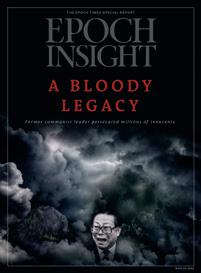 Jasper Fakkert Editor-in-chief
Jasper Fakkert Editor-in-chief
How a Chinese leader is responsible for unprecedented crimes against humanity.
ILLUSTRATION BY THE EPOCH TIMES, PHOTO BY TORSTEN BLACKWOOD/AFP VIA GETTY IMAGES
JASPER FAKKERT EDITOR-IN-CHIEF

CHANNALY PHILIPP LIFE & TRADITION, TRAVEL EDITOR
CHRISY TRUDEAU MIND & BODY EDITOR
CRYSTAL SHI HOME, FOOD EDITOR
SHARON KILARSKI ARTS & CULTURE EDITOR
BILL LINDSEY LUXURY EDITOR
BIBA KAYEWICH ILLUSTRATOR
SHANSHAN HU PRODUCTION
CONTACT US THE EPOCH TIMES ASSOCIATION INC. 229 W.28TH ST., FL.7 NEW YORK, NY 10001

SUBSCRIPTIONS READEPOCHINSIGHT.COM
GENERAL INQUIRIES, LETTERS TO THE EDITOR HELP.THEEPOCHTIMES.COM
ADVERTISING ADVERTISENOW@EPOCHTIMES.COM
(USPS21-800)IS PUBLISHED WEEKLY BY THE EPOCH MEDIA GROUP, 9550 FLAIR DR. SUITE 411, EL MONTE, CA 91731-2922.
PERIODICAL POSTAGE PAID AT EL MONTE, CA, AND ADDITIONAL MAILING OFFICES.
POSTMASTER: SEND ADDRESS CHANGES TO THE EPOCH TIMES, 229 W. 28TH STREET, FLOOR 5, NEW YORK, NY 10001.
How a CCP leader attempted to wipe out a 100-millionstrong spiritual community.
12
A victim remembers the brutality of Jiang’s “horrific era.”
18
An overview of the CCP’s campaign against Falun Gong.
22
How China got rich at the West’s expense.
26
Prisoners of conscience are killed for their organs to supply China’s transplant system.
34
The CCP deploys an array of methods to ruin the lives of innocents.
40
An extra-legal body has unparalleled power to carry out Jiang’s elimination campaign.
44
Jiang’s reign saw the cruel implementation of the one-child policy reaching new heights.
The CCP’s suppression campaign laid the foundation for China’s modern police state.
52 |
How the persecution of Falun Gong reached the shores of the United States.
60
How Jiang used endemic graft to solidify his power.
62 |
A former U.S. official details how the persecution of Falun Gong amounts to genocide.
64 | A Horrific Legacy
Jiang Zemin belongs alongside the worst tyrants in history.
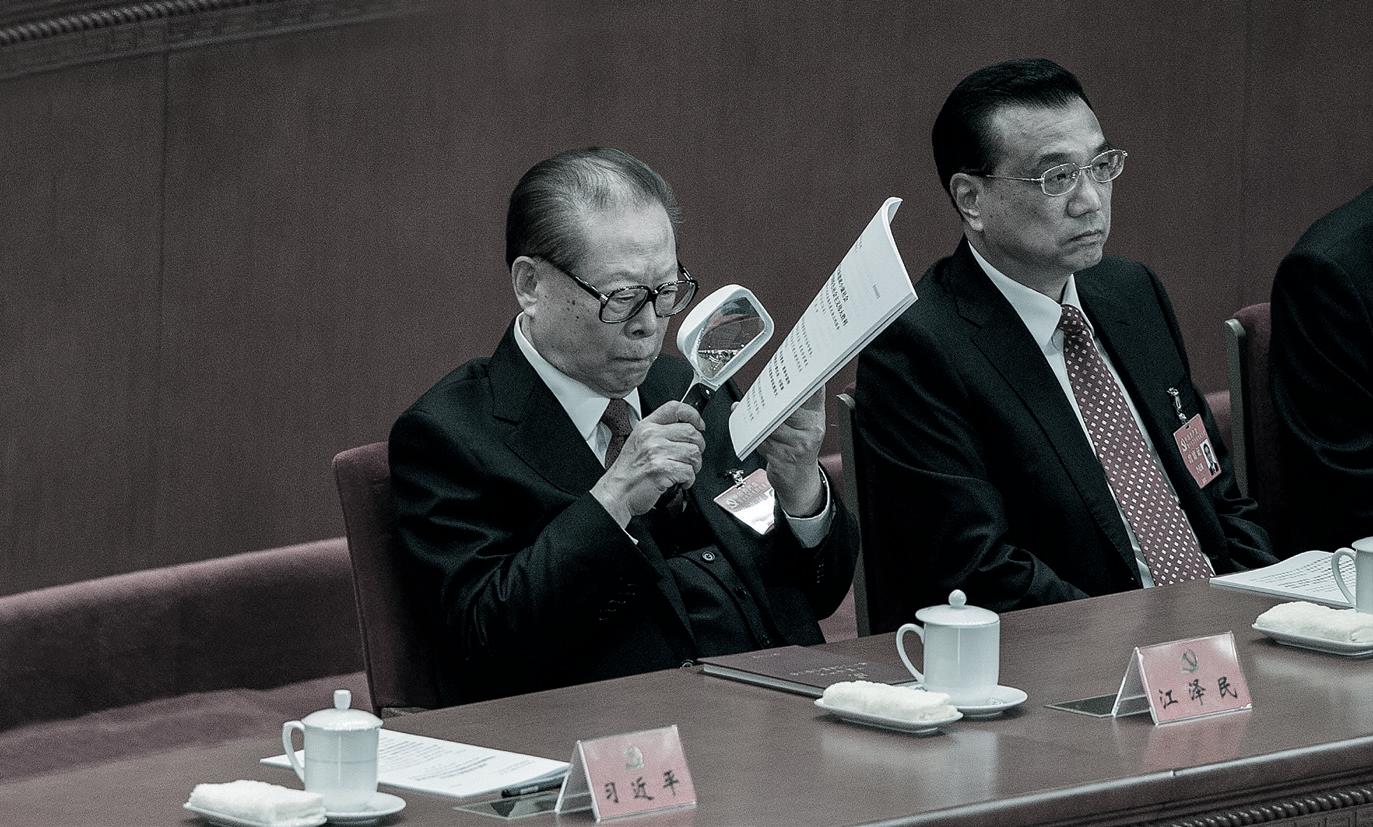
72 | Woke Ideology
Can money persuade Hollywood to be more family-friendly?
73
When the Biden administration fails to act on TikTok, states step up.
74
According to the Fed chair, the war against inflation is far from over.
75 | Startup Companies
New tech hubs are spurring innovation in heartland cities.
76
The European Union’s energy “price cap” proposal is a terrible mistake.
77 | Multinational Firms
Should international corporations divide into regionally focused entities?
78
Marijuana-induced psychosis is more common as THC levels rise.
82
The best gifts to share with your kids are treasured family memories.
Located in an exclusive neighborhood, this home is ideal for entertaining.
The Maipo Valley is an ideal place to reconnect with nature.
A collection of champagnes that are ideal for holiday celebrations.
We’ve discovered the way to enjoy staying on time at the office.
Riding a motorcycle is fun, but it requires a safety-first mindset.

The trick to having great neighbors is to treat them right.
A woman holds a photo of a man killed by the Chinese regime’s persecuation of Falun Gong, during a parade in Washington on July 17, 2014.
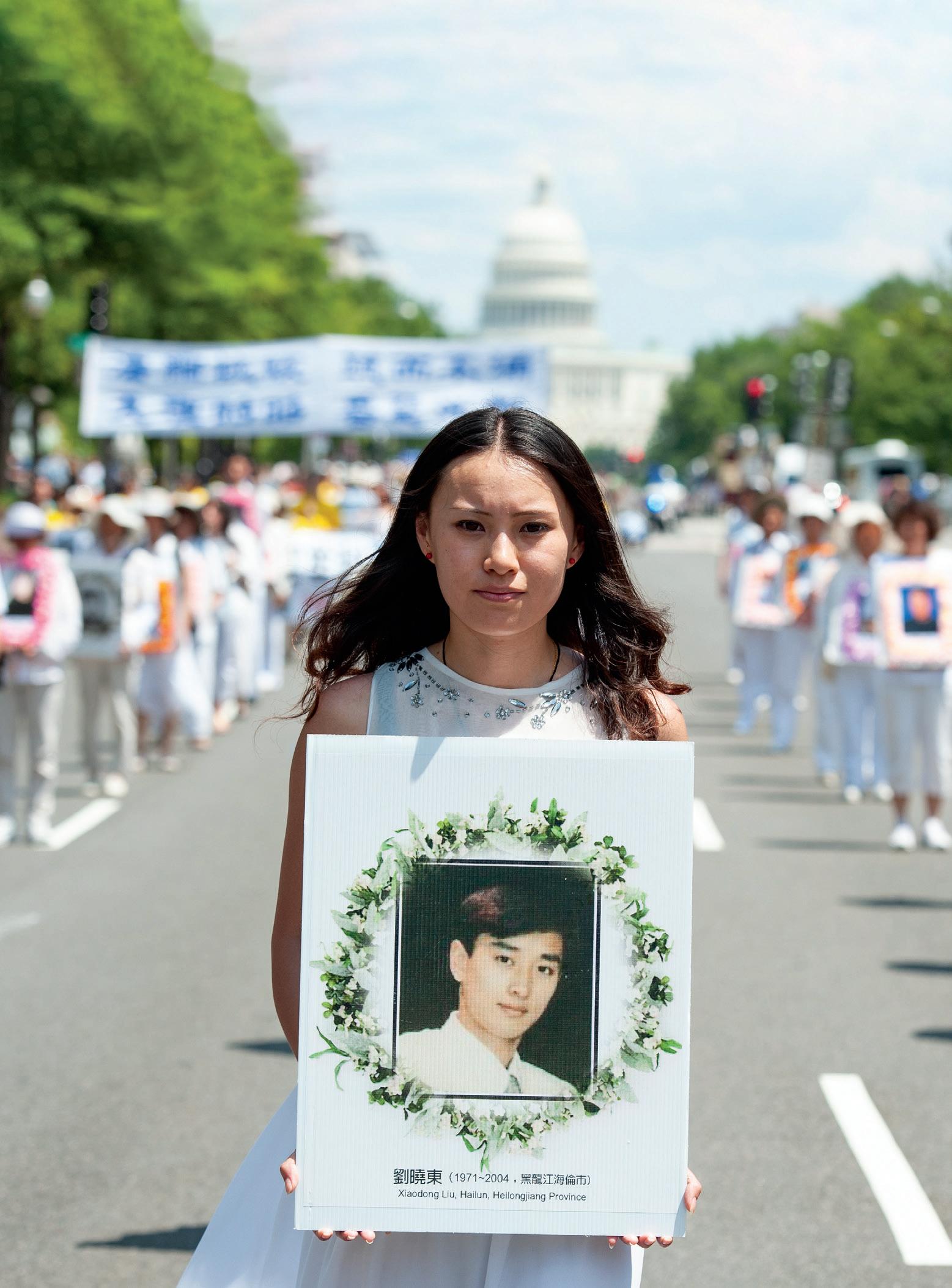
A Chinese policeman (R) approaches Falun Gong practitioners who are holding banners that read “Truthfulness, Compassion, Forbearance” at Tiananmen Square
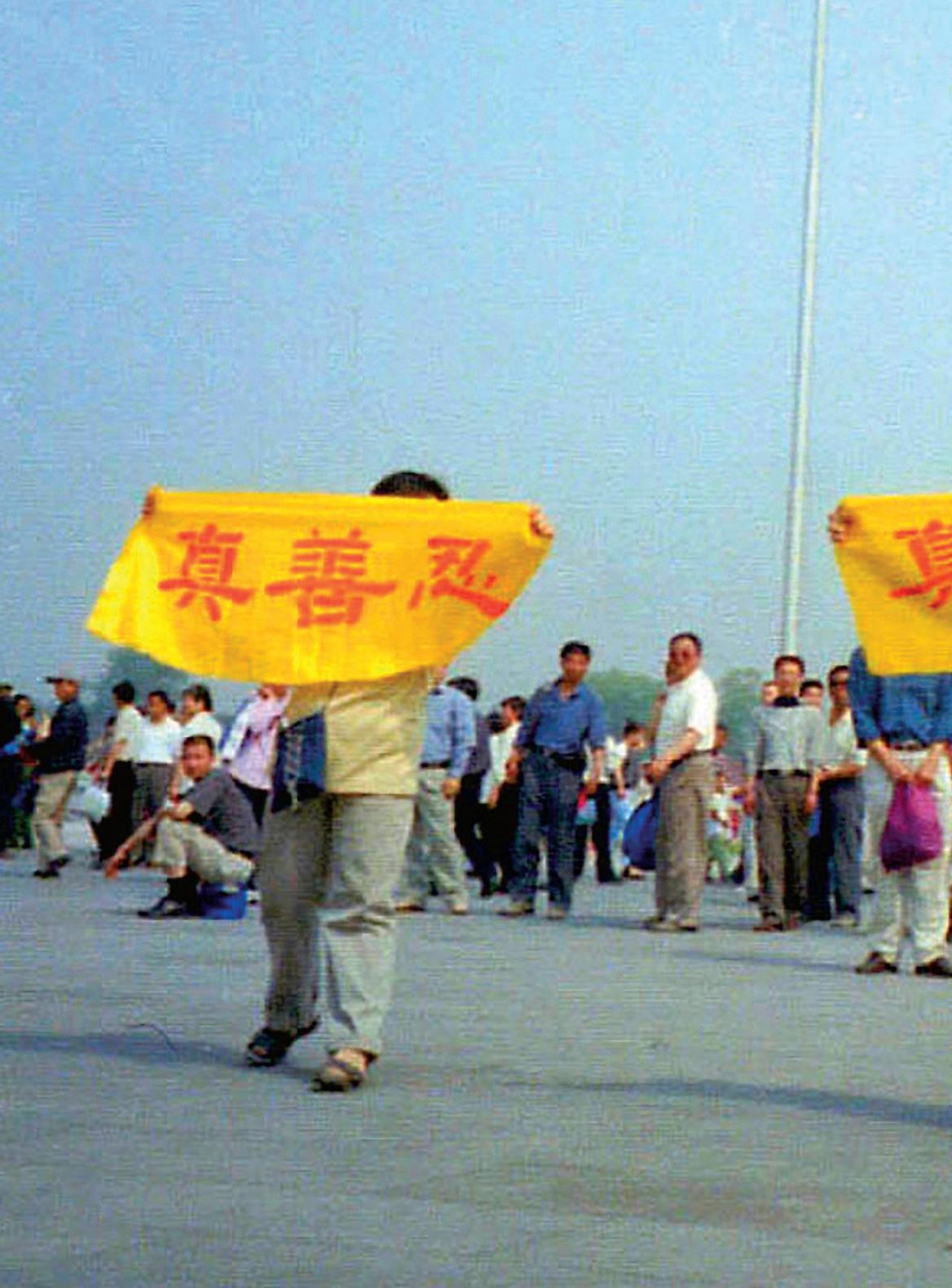
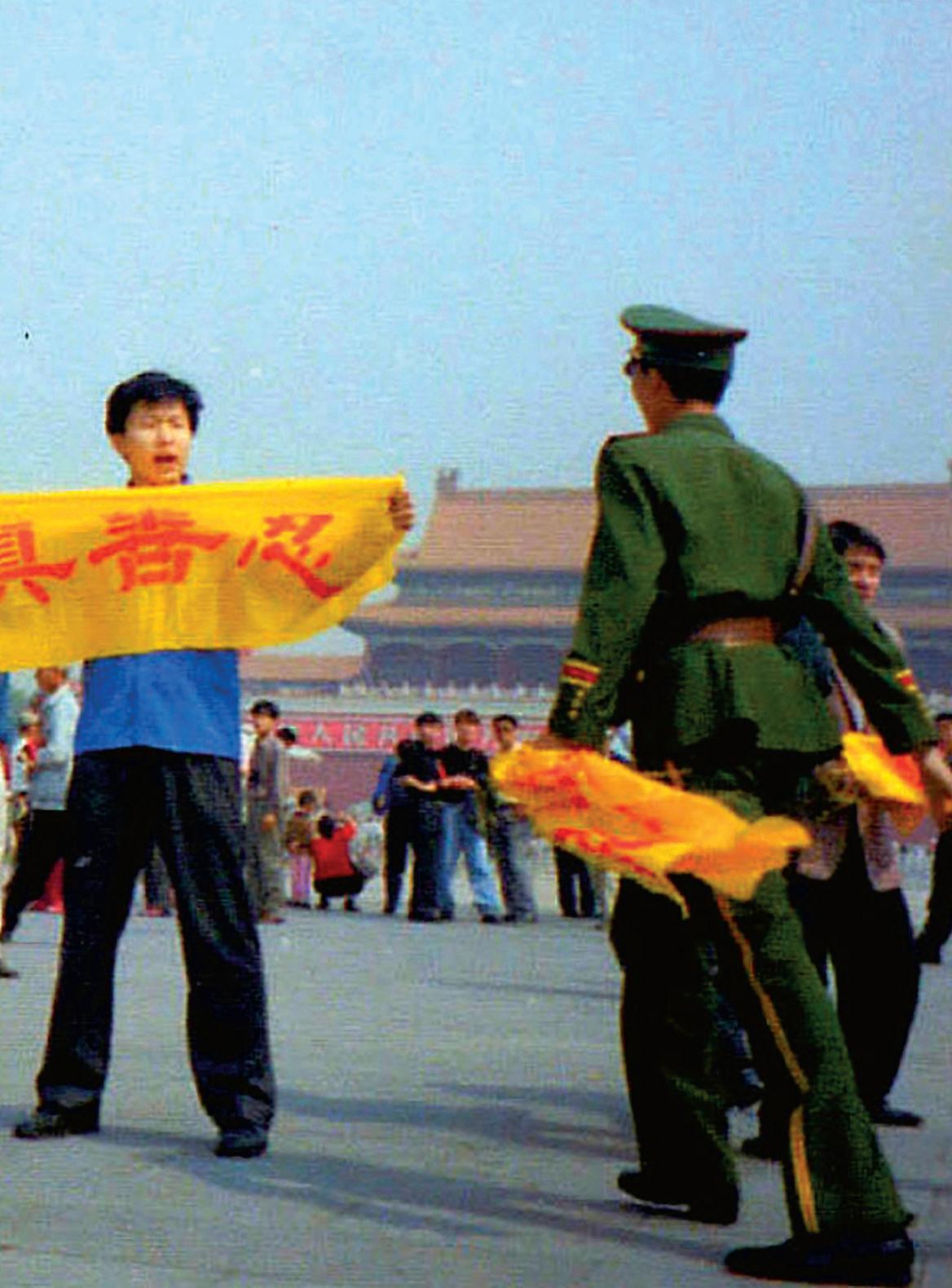 BY EVA FU
BY EVA FU
THAT YEAR, A MASSIVE NATIONWIDE PERSECUTION
began under the orders of Jiang Zemin, then the Chinese Communist Party (CCP) boss, a campaign that indiscriminately targeted adherents of the spiritual practice Falun Gong.
Jiang, described by some rights advocates as one of the worst tyrants in history, died on the last day of November, but the sweeping elimination effort that he unleashed hasn’t stopped.
Over the past 23 years, millions of Falun Gong adherents have been held in labor camps, mental asylums, drug rehabilitation centers, unofficial black jails, or other detention facilities. The vilification, torture, and organized killing through forced organ harvesting arising from the persecution have led to an untold number of deaths. Those who survived are left with injuries and financial and psychological harms suffered from the ongoing abuses.
They’ve been subjected to this savagery for merely refusing to give up their belief in truthfulness, compassion, and forbearance, the core principles guiding the discipline, which also involves a set of slow-moving meditative exercises.
The brutal campaign made Jiang, who officially ruled over China for more than a decade from 1989, the first Chinese leader to face lawsuits domestically and abroad. In 2009, Jiang was among five in senior Chinese leadership indicted in Spain for committing torture and genocide against adherents of the spiritual practice.
Jiang single-handedly started the persecution and mobilized the entire state apparatus to carry out the brutal campaign.
He appeared so eager to solicit international support for the campaign that, at the annual APEC meeting in September 1999, two months after the launch of the suppression, he handed then-U.S. President Bill Clinton a book defaming Falun Gong in the hopes of convincing
(Above) Falun Gong practitioners exercise outdoors in Guangzhou City in the mid-1990s.

(Left) Former Chinese leader Jiang Zemin reportedly gave a secret order that Falun Gong adherents who died from torture would be declared to have committed suicide, according to Minghui.
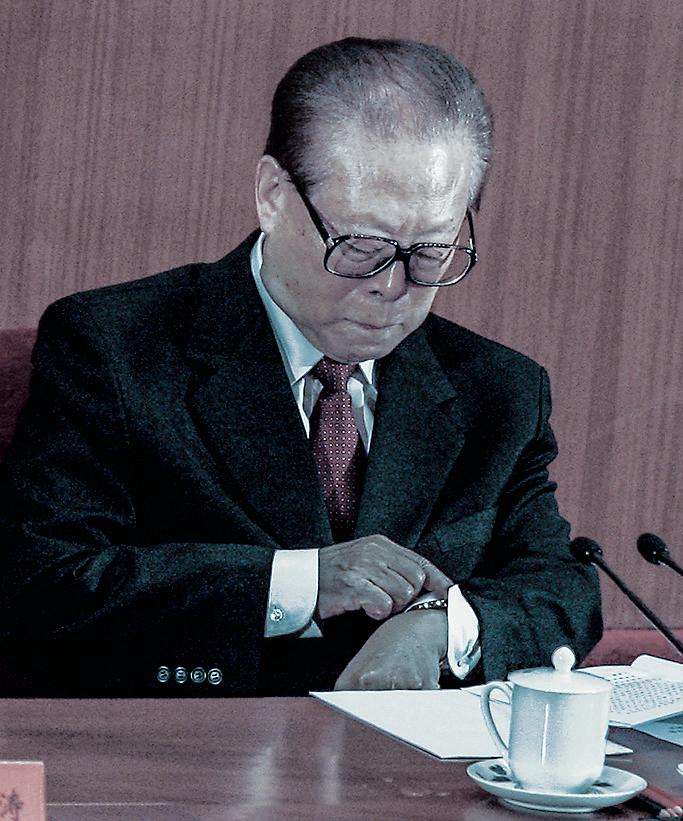
For as many as 100 million Chinese, the year 1999 was a watershed moment in their lives.
Jiang Zemin single-handedly started the persecution and mobilized the entire state apparatus to carry out the brutal campaign.
the president to adopt a “correct” attitude toward the practice, The Associated Press reported at the time.
“The book’s 150 pages in English is a relentless barrage of propaganda from China’s entirely state-run media,” the report reads.
Jealousy and insecurity have been cited as part of the driving force behind Jiang’s animosity toward the spiritual practice. Falun Gong’s tremendous popularity, reaching almost 1 in every 13 Chinese, was something he couldn’t tolerate.
Embarrassed and angry to be caught in the act, Jiang ordered Wang to stop practicing.
“Even my wife believes in Li Hongzhi. Who’s going to believe in me, the general secretary of the Chinese Communist Party,” he said, referring to the practice’s founder.
According to “Anything for Power: The Real Story of China’s Jiang Zemin,” a 2011 book-length series published by The Epoch Times, Jiang’s wife, Wang Yeping, once practiced Falun Gong in 1994. When doing the practice’s exercises one evening, she sensed that someone was mirroring her movements. Opening her eyes, she discovered it was none other than Jiang.
in China practiced Falun Gong by early 1999.

The decision to go after one of China’s largest spiritual communities wasn’t a popular one from the start.
Of the seven members of the Standing Committee of the Politburo, the Party’s inner sanctum, six expressed objections when Jiang proposed the idea to suppress the practice, according to the publication. Zhu Rongji, the premier of China at the time, suggested that such a move would harm the country’s image and that they should just “allow the ordinary practicing populace to just be.” Standing up, Jiang pointed at Zhu’s nose and
shouted: “Foolish! Foolish! Foolish! That would spell the demise of the Party and the country!
“If we don’t solve the Falun Gong problem right away, we are making a mistake of historical proportions.”
Jiang made such a declaration on April 26, 1999, according to the publication, the day after 10,000 adherents peacefully gathered near the government headquarters in Zhongnanhai, appealing for their rights to practice their belief freely and for the release of dozens of practitioners who were detained days prior.
The crowd dispersed after Zhu assured them of his support during a meeting with some Falun Gong delegates. But Jiang, who rose to power after the Tiananmen massacre a decade prior, pushed ahead with the clampdown.
On June 10, Jiang gave direct orders to create an extra-legal agency to coordinate the efforts nationwide. Later known as the 610 Office after the date of its creation, its structure and operations were comparable to the Gestapo in Nazi Germany.
The persecution began on a full scale one month later. State media outlets at all levels pushed out an aggressive propaganda campaign slandering the practice and dehumanizing adherents, while those who refused to give up the belief were subjected to escalating violence and other forms of ill-treatment.
“We have 108 types of torture methods! Do you think you’ll leave here alive?” a guard at the Jilin Women’s Forced Labor Camp in Jilin Province once told an imprisoned Falun Gong practitioner there in 2012, according to Minghui, a U.S.-based website that documents the persecution.
Jiang reportedly gave a secret order that Falun Gong adherents who died from beating and other torture would be declared to have committed suicide and sent for cremation, according to Minghui.
on his lips. His hair was fried and electrocution marks were observed all over his body. The police declared him a suicide victim.
“We have been told that a 5 percent death rate is normal,” a prison unit warden there said in October 2003. “We aren’t concerned about deaths.”
Over the past 23 years, millions of Falun Gong adherents have been held in labor camps, mental asylums, drug rehabilitation centers, unofficial black jails, or other detention facilities.
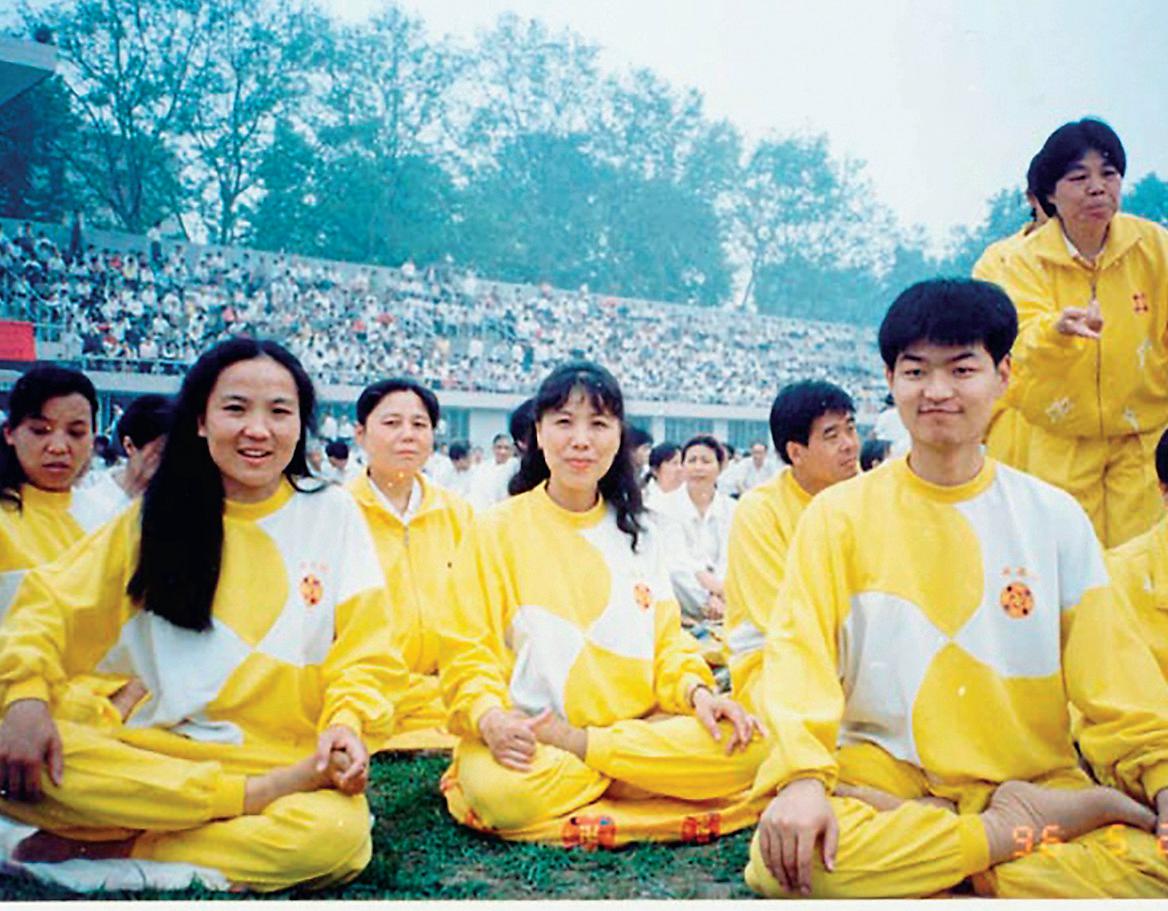
To incentivize perpetrators involved in the scheme, officials reward them with lucrative salaries and often link bonuses with their level of participation. According to a 2001 Minghui report, one police station in Dalian, a port city in northern China, required each officer to arrest nine adherents in order to get a bonus.
In Shanghai, 45-year-old Lu Xingguo was stripped naked and tortured in a cell with a towel stuffed in his mouth to prevent him from making noises.
Lu died within an hour. He lost his teeth and the skin
In Dandong city, home to a population of more than 2.4 million at the time and the capital of Liaoning Province in northeastern China, authorities sent out political cadres and the police force more than 5,000 times to carry out activities to suppress Falun Gong during the first two months of the persecution, according to internal documents that The Epoch Times obtained from a trusted source. The result was the ban of more than 100 practice sites over the period, while 22,000 practitioners from the area were visited by police.
The city also spent 30,000 yuan ($4,311)— about five times the average annual disposable income in 2000—producing a play to attack Falun Gong to “educate” more than 10,000 people; in the years through 2005, it printed millions of posters, leaflets, and artworks defaming the practice that were either disseminated or pinned on public notice boards, according to the document.
Jiang had kept close tabs on the persecution’s progress. In March 2002, Falun Gong practitioners intercepted
the cable lines of the state-run broadcaster in the northeastern Chinese city of Changchun to air 45 minutes of information about the persecution. According to Jiang’s personal biography released in 2005, just 10 minutes after the program ended, a furious Jiang called a close friend in the city, demanding to know who the city’s Party secretary or mayor was. Soon after, authorities from the city made thousands of arrests over the incident. The core participants received sentences of up to 20 years. Most died in prison or shortly after their release.
Jiang wielded political influence from behind the scenes long after he gave up all of his official positions in 2004. He was the leader of the Party faction known as the Shanghai gang, named after the city where Jiang accumulated his political capital as Party secretary. His loyalists, many of whom were key figures overseeing the persecution, occupied various Party branches when current regime leader Xi Jinping assumed office in 2012.

With the millions of personnel deployed to execute the campaign, the persecution has exacted a hefty economic toll on the Chinese state.
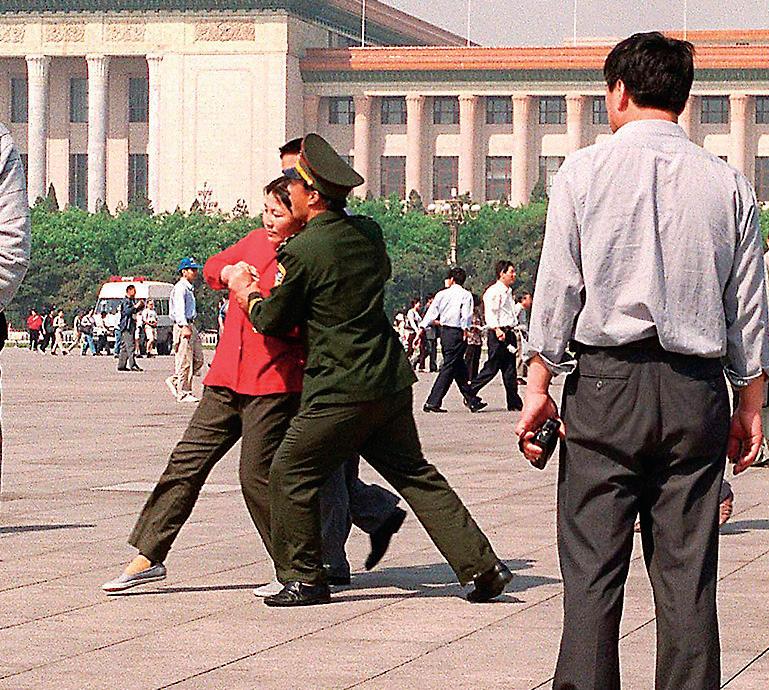
A senior judiciary official in Liaoning was quoted by Minghui as saying that “the financial resources used for
handling Falun Gong have exceeded the costs of a war.” Accountability

Following his death, outside critics have renewed calls for accountability, both for him and for the regime.

“If you believe in human rights and you believe in the legitimacy of people governing themselves and speaking out and having the right of free speech, there’s a lot to hold the Chinese communist dictatorship accountable for, and there’s a lot to hold their leaders accountable for,” former U.S. House Speaker Newt Gingrich recently told The Epoch Times.
“The persecution of Falun Gong and the intensity of it is really stunning and tells you all you need to know about how deeply totalitarian the system is.”
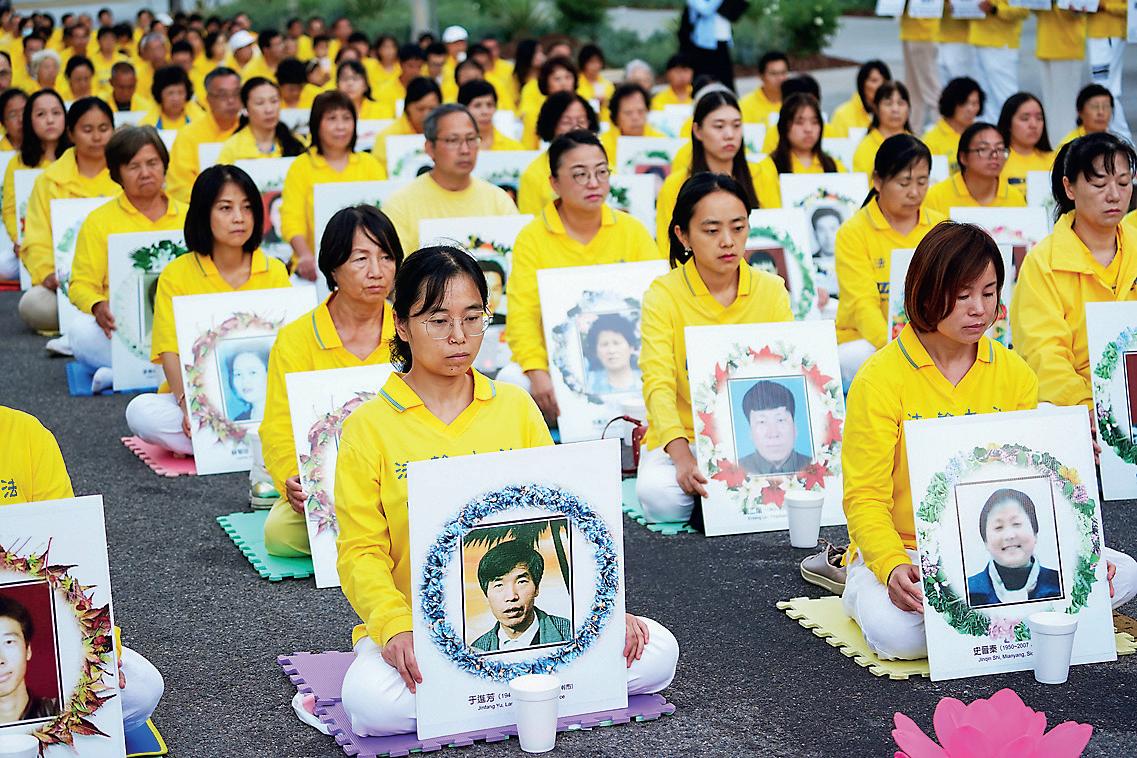
Chen Yonglin, a former Chinese diplomat who defected to Australia in 2005, considers Jiang’s death the prelude to the regime’s eventual downfall.
“The CCP has fallen from the peak of its power and is now in a precarious spot,” he told The Epoch Times.
But Jiang’s death doesn’t diminish the regime’s bloody legacy, Chen said. Sooner or later, he expects to see the “accounts settled”—with Jiang and the Chinese Communist Party.
A senior Chinese judiciary official was quoted as saying that ‘the financial resources used for handling Falun Gong have exceeded the costs of a war.’
 BY EVA FU
BY EVA FU
Police use a hydraulic cannon to spray water on Falun Gong practitioners doing group exercises in May 1999.
 PHOTO VIA FALUN DAFA INFORMATION CENTER
PHOTO VIA FALUN DAFA INFORMATION CENTER
Nosebleeds are the one thing Henr y Yue distinctly remembers besides the torture from his 1 1/2 years held at a Chinese labor camp.
While winding metal coils used in television sets, part of the forced work he had to do day in and day out, blood would sometimes gush out, leaving large crimson patches on his blue-and-white striped prison uniform.
The first time it happened, Yue held up his head and patted his forehead for about a minute to stop the bleeding. There was so much blood that even on the second day, he was coughing it up.
In 2001, Yue was at a facility in eastern China’s Tianjin city serving a sentence as a punishment for engaging in Falun Gong’s meditative exercises during a “brainwashing” session, a program mandated by the communist regime that’s designed to coerce adherents of the spiritual practice to renounce their faith.


The young professional didn’t think his health would decline to such a point. He was in his mid-20s, athletic, and in excellent health before his imprisonment. But every aspect of prison camp life took a toll.
He was forced to toil 16 to 19 hours
each day, with moldy rice and stale greens as his only sustenance; he had to shower in cold water, even during frigid winters; every day, he had to report about how his thoughts had been “transformed”—a euphemism coined by Chinese authorities for an adherent renouncing their belief.
The guards would inflict pain for the slightest sign of disobedience, or, as Yue believes, for the mere satisfaction of doing it. Once, he watched a senior warden, for no apparent reason, smash a chair to pieces on an inmate’s hunched back.
The labor camp set impossibly high production quotas for each detainee, often leaving little room for rest. Yue, who was one of the fastest workers there, remembers having once slept for only a half-hour in trying to finish his quota.
To get by, he at times counted down by the minute for the ordeal to end. It eventually did, but only after he had slaved for 18 months on products that would later be sold in South Korea. Still, he considered himself one of the lucky ones; there were others who had deformed hands or who had lost their fingernails because of the work.
“They treat you like animals,” Yue, who now lives in New York, told The Epoch Times. He cited an infamous order given by Jiang Zemin, the Chinese Commu-
nist Party (CCP) leader at the time of his incarceration, who in July 1999 orchestrated the persecution of Falun Gong and essentially gave free rein to prison staff to use any means possible to get adherents to give up their spiritual belief.
“Ruin their reputations, bankrupt them financially, and destroy them physically,” Jiang had said at the onset of the nationwide suppression, envisioning that he could eradicate Falun Gong in just three months. While this didn’t come true, the persecution turned an estimated 70 million to 100 million Falun Gong adherents into targets of an uninhibited elimination campaign, involving, but not limited to, detention, torture, financial deprivation, hate propaganda, and forced organ harvesting.
Jiang died on Nov. 30, at the age of 96, with his legacy described as one of the world’s worst human rights abusers.
But as long as the persecution apparatus that Jiang created remains in effect, accounts of suffering like Yue’s and the overarching climate of terror endured by Falun Gong adherents over the past 23 years are unlikely to end.
Between September and October, more than 2,000 adherents experienced harassment or arrests, including about
150 who were aged 80 or older, according to Minghui.org, a U.S.-based website that serves as a clearinghouse for information related to the persecution. Those figures represent the tip of the iceberg in the decades-long campaign, which has seen millions of adherents detained and an untold number dead due to torture or forced organ harvesting.
“To some extent, it’s the end of a very terrible, horrific era,” Levi Browde, executive director of the New Yorkbased Falun Dafa Information Center, told The Epoch Times.
With Jiang, the mastermind who elevated a “mafia” ring of acolytes to execute the persecution, now gone, Browde hopes that anyone “who still has somewhat of a conscience” will stop contributing to the mass abuses.
print media, and community bulletin boards, as police assembled en masse to make arrests.
For those who persisted in their belief, everything—their families, their careers, and even their lives—was at risk, even though they were merely exercising their basic rights enshrined in China’s constitution.
and screamed.
It was then that Yue, who had always looked up to the police as heroes who helped make people safe, sank into despair.
Yue, former detaineeAs young as he was, Yue was already moderately well-off as a junior manager at a Japanese joint venture that manufactured children’s clothing. He was earning a salary of up to 1,000 yuan ($142) a month, which, at the time, placed him among the top earners in his town in Tianjin, a major coastal city in China’s north.
“Facing a group who only wanted to better themselves, they could still be so ruthless,” he said. “They were persecuting good people under the authority of the state.”
The West’s Greenlight Browde, then a software engineer in New York, took up the spiritual practice in the fall of 1998 after noticing how it changed his best friend and co-worker into a kinder and more considerate person. Soon, the slow-motion exercises replaced his hour-long gym routine every morning.
In June 1999, Jiang created an extralegal police task force that became known as the “610 Office,” with the sole mission to annihilate Falun Gong. A national campaign was launched a month later. Hate propaganda filled the airwaves,


That financial cushion was stripped that October, after Yue went to Tiananmen Square in the country’s capital to petition authorities to reverse their decision.
After he returned to Tianjin, local police officers arrested him and tortured him with two electric batons for 40 minutes, stopping only after one of them accidentally shocked himself
The practice, he said, pointed the way to allow one to “be the person you want to be” in a world where often “the various complexities of human nature get the best of us.”
“I find that very freeing,” he said.
It wasn’t long after the persecution that the same friend who introduced Browde to the practice found that his mother in China, also an adherent, was missing, an event that brought the persecution close to home.
“THEY TREAT YOU LIKE ANIMALS.”Henry
Browde and others formed a small group to go door-knocking to tell Americans about what was happening in China. He traveled to protest during several of Jiang’s overseas visits, in Ukraine, Lithuania, and the two U.S. trips in 2000 and 2002.
At the time, Browde said, it felt like he and others who were raising awareness about Falun Gong’s plight were “swimming against the tide.”

The West, having just welcomed China into the World Trade Organization the previous winter, was “desperate” to bring the communist country into the world political arena—even at the cost of their values and legal principles—and the Chinese officials knew it, Browde said.
He recalled a run-in with two Chinese officials in October 2002, during a demonstration ahead of Jiang’s meeting with President Goerge W. Bush in Crawford, Texas. Bush was set to give Jiang a tour around his ranch, which Browde described as a “huge PR coup
for the CCP on the world stage.”
“This was normalizing the CCP in showing that it was an equal to the United States, not just politically and financially,” he said. “So we felt it was our duty that we had every chance possible to make sure that people understood that this person coming to visit with our president here in Texas was a tyrant.”
As he and hundreds of other adherents gathered on the road leading to
the ranch, two officials from a Chinese Consulate car came out and started to take photos of the participants. When the adherents objected, out of safety concerns due to participants having family in China, one of the Chinese officials fetched a Stetson cowboy hat from the car, put it on, and walked toward them with his arms folded.
The message, as Browde saw it, was, “You can’t do anything to me.”
“That’s one of the moments where I first realized that the Chinese officials were succeeding at getting their way to do what they want in our country,” he said.
That was more than 20 years ago, and the tide has shifted since then.
The Chinese regime’s state-sanctioned forced organ harvesting from imprisoned Falun Gong adherents is encountering growing condemnation in the United States and around the globe.
Meanwhile, over the past few years,
Chinese leader Jiang Zemin said at the onset of the nationwide supression of Falun Gong adherents, ‘Ruin their reputations, bankrupt them financially, and destroy them physically.’
the regime’s threatening overtures against Taiwan, its mass imprisonment of Uyghur Muslims in the Xinjiang region, its suppression of Hong Kong, and its harsh COVID measures on the Chinese population at large have also sparked a significant backlash in China and abroad.
Following Jiang’s death, Chinese state media was awash with eulogies lionizing the former leader. In an official obituary, the Party, without mentioning the specific incident, credited Jiang for taking a hardline stance during the 1989 Tiananmen protests, which called for political reform.
While that wasn’t a surprise to adherents, the praise from some Western media
outlets over Jiang’s alleged role in facilitating the country’s economic rise was.
Such characterizations amounted to a whitewashing of Jiang’s bloody legacy, according to Yue.
Not only did the former leader unleash the full force of the state against a massive group of innocents, but his rule also spawned the endemic corruption that now permeates every aspect of Chinese society, Yue said.
In 2015, Yue, who in total was arrested half a dozen times, was one of the first in his county to file a lawsuit using their real name with China’s highest legal body asking Jiang to be brought to justice. In about a year and a half, the number of similar lawsuits filed
against the former leader over harms suffered because of the persecution snowballed to about 210,000.
While at the labor camp, Yue had once wished Jiang dead, although his resentment has long since dissipated.
“We don’t have enemies,” he said.
Yue, however, does regret that now he won’t be able to see Jiang stand trial for his crimes.
He also questioned whether the Chinese public held much warm sentiment toward Jiang. In 2011, rumors of Jiang’s death circulating in Hong Kong reportedly prompted some in China to buy fireworks in celebration.
“For them, it was something they had looked forward to,” Yue said.
Jiang’s death has added political uncertainties to Beijing as it faces challenges both domestically and abroad.
Browde saw the anti-lockdown protests that recently erupted across China as part of a growing pattern of Chinese people “being more clear” about the regime’s history and abuses.
This awareness, he said, has been growing for years; in part, thanks to adherents’ grassroots efforts to tell people about the persecution.
In recent years, the Falun Dafa Information Center has collected acts of courage of various scales, including entire villages signing petitions using their real names to call for the release of detained Falun Gong practitioners.
“That’s unprecedented—a bunch of people signing their real names to a petition and sending them to the government on an issue that the CCP takes so seriously such as Falun Gong,” he said.
“So if they’re brave enough to do that, they should be brave enough to do other things, such as say no to COVID-19 lockdowns.
“At some point, that would hit a tipping point.”
Frank Fang contributed to this report.
(Top Left) Protesters hold placards that say “The Heavens Will Destroy the Chinese Communist Party” at a vigil in Hong Kong, on June 4, 2020. (Left) Falun Gong practitioners protest against then-Chinese leader Jiang Zemin’s persecution of the practice in China, in New York, on Sept. 8, 2000.


An overview of the Chinese regime’s unrelenting campaign to eradicate a peaceful meditation practice, devastating millions of lives
 BY EVA FU & FRANK FANG
PHOTO BY EDWARD DYE/THE EPOCH TIMES
For more than 23 years, the communist regime in China has deployed a comprehensive campaign of repression against adherents of the spiritual group Falun Gong. Millions of Falun Gong practitioners have suffered detention, torture, harassment, forced labor, and organ harvesting. How the persecution started and how the Chinese Communist Party (CCP) has executed this expansive campaign is explained below.
BY EVA FU & FRANK FANG
PHOTO BY EDWARD DYE/THE EPOCH TIMES
For more than 23 years, the communist regime in China has deployed a comprehensive campaign of repression against adherents of the spiritual group Falun Gong. Millions of Falun Gong practitioners have suffered detention, torture, harassment, forced labor, and organ harvesting. How the persecution started and how the Chinese Communist Party (CCP) has executed this expansive campaign is explained below.
Falun Gong, also known as Falun Dafa, is a meditation practice that features moral teachings based on three core tenets, “truthfulness, compassion, and tolerance,” along with a set of meditative exercises.
In 1992, Li Hongzhi, the practice’s founder, introduced it to the public in Changchun, a city in northeastern China. It spread quickly by word of mouth to other parts of the country. By 1999, roughly 70 million to 100 million people around the country had taken up the practice, according to official estimates at the time.
Li himself is a four-time Nobel Peace Prize nominee. The practice was also recognized by state bodies for its contributions to society, and some adherents received awards for their community service before the regime began an all-out suppression campaign in July 1999.
The discipline’s rapid growth, with its practitioners outnumbering the 60 million Party members at the time, meant the practice was viewed by the regime as a threat to its authoritarian rule. Meanwhile, the values that Falun Gong espouses were at odds with the atheist Marxist ideology underpinning the CCP.

Then-Chinese leader Jiang Zemin, who personally ordered the persecution, repeatedly expressed his vehemence toward the practice in remarks and in interviews with foreign media.

Jiang, in a letter released immediately after the April 25 appeal, expressed alarm at the “substantial number of Party members, cadres, intellectuals, soldiers, workers, and peasants” among Falun Gong practitioners and vowed to toughen ideological control.
“Could it be that Marxism, materialism, and atheism that we communists embody can’t defeat what Falun Gong promotes? That’d be a tremendous joke if true,” he wrote in the letter.
On April 25, 1999, around 10,000 Falun Gong practitioners gathered at the appeals office near the CCP’s headquarters in Beijing to appeal for their right to practice freely. It became the largest peaceful demonstration that China had seen in a decade, since the Tiananmen Square massacre.

What triggered the appeal was the arrest of dozens of adherents in the nearby megacity of Tianjin who had protested a defamatory article about their faith. The environment was also becoming more restrictive: The publication of Falun Gong books had been banned; and police in some areas had been harassing adherents, searching their homes, and beating them up.
The petitioners met with then-Premier Zhu Rongji and delivered three requests: to release the practitioners who’d been arrested, reverse the publication ban, and allow them to practice in public without fear. After learning that the Tianjin practitioners had been released, the petitioners left quietly that evening.
Authorities would later seize upon the event to justify the persecution, launched three months later, claiming that practitioners were laying “siege” to the regime.
The CCP was intent on wiping out Falun Gong; Jiang initially aimed to crush the practice within three months. Top Chinese leaders also ordered officials to “defame their reputations, bankrupt them financially and destroy them physically,” according to a military colonel who attended the meeting.
Police officials declared that if practitioners were beaten to death, it would be considered suicide, according to Minghui.
In June 2001, more than a dozen female adherents died in a labor camp in Harbin, a city in northern Heilongjiang Province, in what authorities claimed was a mass suicide. “Only 15 or 16 out of 3,000 have died. How is this a lot?” the labor camp reportedly told the family of Li Xiuqin, one of the victims. They saw only her ashes.
An illustration of suffocation torture: Guards cover a Falun Gong practitioner’s head with a plastic bag and threaten not to remove the bag until the victim agrees to sign a declaration renouncing his faith. Guards may then kick and beat the person while shocking him with electric batons.

The campaign was thorough and mobilized all levels of society. Propaganda maligning the practice appeared in state newspapers and on television and radio, as well as school textbooks and community boards.
The Department of Culture directed the mass destruction of millions of Falun Gong materials, including book burnings, and the jailing of bookshop owners. Workplaces fired people who refused to give up their faith, while students from primary school to college were expelled. One high schooler was sentenced to five years in prison after refusing to join a school-organized parade that slandered the practice—even though he wasn’t old enough to be sent to jail.

A Shanghai primary school punished a teacher who was a Falun Gong practitioner by demoting her to the role of cleaning the school bathrooms, a decision one colleague said harked back to the abuse inflicted during the Cultural Revolution.

With the court system under the control of the CCP, trials in China are a mere formality. Adherents are often detained for months or longer before trial and at times denied legal assistance. Lawyers representing them experience harassment, assault, or threats, and are frequently interrupted in court when advocating for their clients. Wu Shaoping, a human rights lawyer now in the United States, told The Epoch Times he was stopped mid-argument and escorted out of the court by police when making the case that his client had been charged illegally. His client was sentenced to nine years in prison one month later.
On June 10, 1999, an extralegal Gestapo-like agency was set up and named the “610 Office” after the date of its creation. The 610 Office enjoys wide-ranging powers and directs various sectors of society to carry out the persecution campaign. A 2017 report by the human rights watchdog Freedom House estimates that the annual budget for all 610 Offices across China is around 879 million yuan ($135 million).
In 2002, a Falun Gong practitioner from Changchun was beaten to death after being arrested for hijacking TV airwaves to broadcast programs debunking state pro-

paganda about the practice. The head of the city’s 610 Office overseeing the persecution instructed police to keep the matter confidential. He described the campaign to destroy Falun Gong as “an arduous political task” and told the police “not to fear blood or deaths,” a former officer present at the meeting told Minghui.
The 610 Office is also involved in state-sanctioned forced organ harvesting, resulting in an unknown number of deaths, according to the World Organization to Investigate the Persecution of Falun Gong.
China’s censors have wiped the Chinese internet of any authentic materials on Falun Gong, while allowing misinformation and propaganda about the spiritual practice to fill cyberspace. Words related to Falun Gong have been scrubbed online, and there have been cases in which practitioners were detained for using words related to the practice on China’s popular messaging platform WeChat.
The Great Firewall, which prevents Chinese citizens from accessing many foreign sites such as Facebook and Google, also blocks overseas websites relating to Falun Gong.
The regime’s censorship exists not only in cyberspace—it also denies practitioners’ rights to freedom of speech. Practitioners who speak with neighbors or strangers about Falun Gong run the risk of being detained—or worse, sentenced to prison.
Teachers are required to indoctrinate their students with anti-Falun Gong propaganda. In April 2020, the primary school attached to China’s Jinan University held a “national security class,” during which students were taught that Falun Gong “posed a threat” to society.
Finding that public opinion hadn’t turned against Falun Gong, the regime launched in 2001 a brazen disinformation campaign in a bid to incite public hatred against the practice and its adherents. In January 2001, five individuals set themselves on fire in Tiananmen Square, an incident that China’s state-run media blamed on Falun Gong. Following the tragedy, the number of hate crimes against Falun Gong practitioners increased.
The incident turned out to be a staged event. Suspicious circumstances surrounding the event have since been revealed and documented in the award-winning film “False Fire.”
The regime also cooked up false stories about alleged practitioners—such as a person who killed her own child before taking her own life—in hope of spinning public opinion in China. An independent investigation later revealed that the person never existed. Chinese officials have openly taken part in spreading the propaganda both in China and overseas. In 2004, a Falun Gong supporter brought and won a defamation lawsuit against the Chinese deputy consul-general in Toronto for attacking him in a letter published in the Toronto Star.
During the 1999 Asia-Pacific Economic Cooperation summit in New Zealand, Jiang handed out booklets defaming Falun Gong to participants of the meeting.
Despite the repressive climate, the group has persisted in grassroots efforts to call attention to the regime’s abuses. Practitioners around the country—at great personal risk—distribute homemade booklets, posters, and CDs to households and passersby to refute the regime’s propaganda. They hang banners in prominent places as a symbol of their perseverance.
Since 2004, adherents have been urging Chinese people to disassociate themselves from the crimes committed by the CCP by quitting its affiliated organizations.
In 2015, adherents began a wave of lawsuits seeking to bring former leader Jiang to justice.
People in some areas of China have shown support for practitioners’ efforts to counter the persecution. In 2017, around 300 people in Huludao city of Liaoning Province signed a petition calling for the unconditional release of a local Falun Gong practitioner, Minghui reported.
 Falun Gong practitioners take part in a candlelight vigil to commemorate the practitioners killed in China for their belief, in Washington on June 22, 2018.
PHOTO BY MARK ZOU/THE EPOCH TIMES
Falun Gong practitioners take part in a candlelight vigil to commemorate the practitioners killed in China for their belief, in Washington on June 22, 2018.
PHOTO BY MARK ZOU/THE EPOCH TIMES
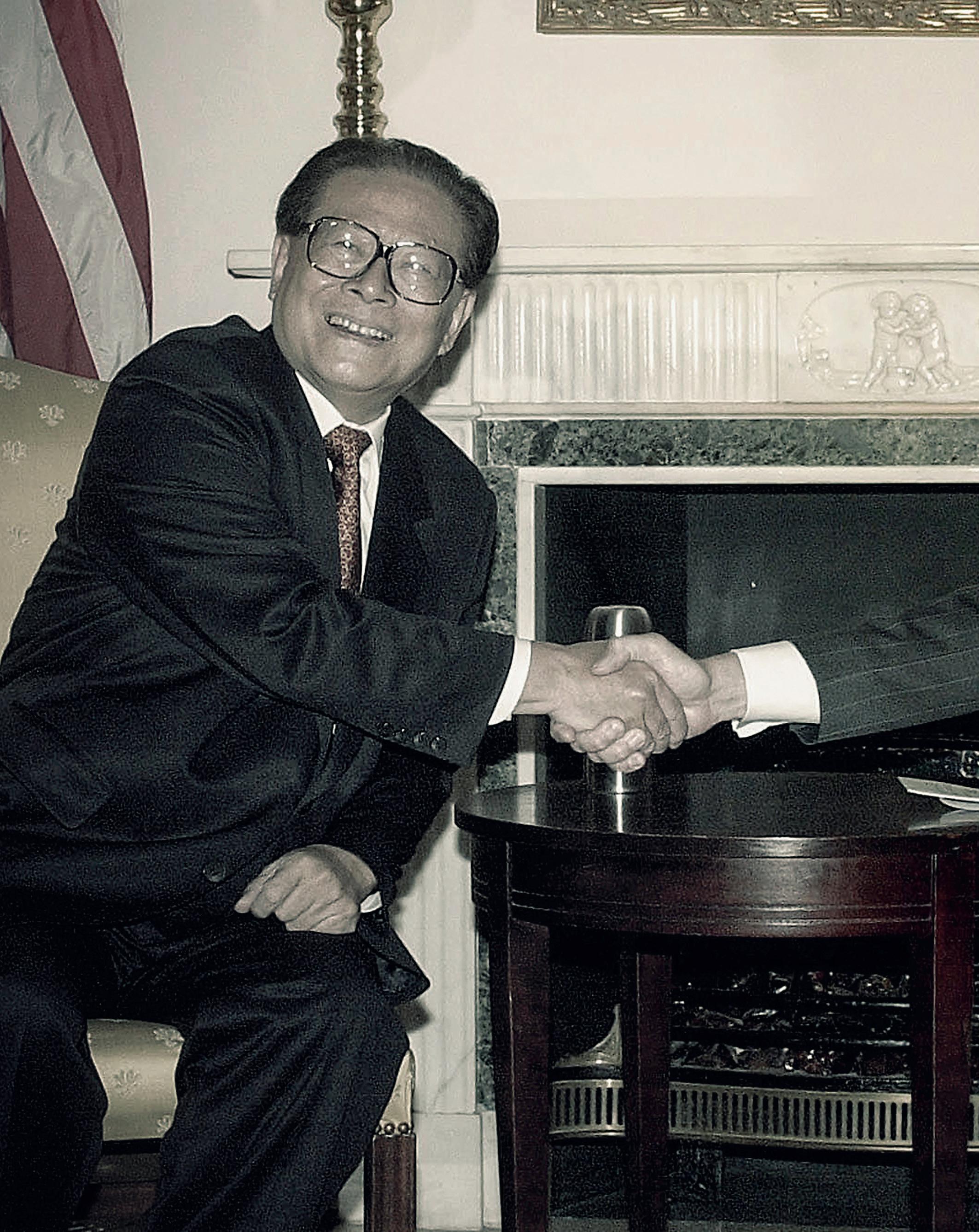 BY EMEL AKAN News Analysis
BY EMEL AKAN News Analysis
Immediately following the death of former Chinese Communist Party leader Jiang Zemin, numerous Western media outlets began to laud his efforts to open the Chinese economy to the outside world and create a “global economic juggernaut.”
They cited rapid economic growth throughout a decade of his leadership in the post-Tiananmen era as evidence of his accomplishment. However, little is said about how China’s meteoric growth came at the expense of Western businesses and workers following its admission to the World Trade Organization (WTO) in 2001.

According to the World Bank, China’s economy has grown by more than 1,200 percent (in today’s U.S. dollar terms) since joining the WTO, making it the world’s second-largest economy, the largest exporter, and the dominant industrial power.
Jiang, who served as the communist regime’s top leader from 1993 to 2003, frequently bragged about his role in enrolling the country in the WTO.
However, the growth of trade relations with China has been particularly devastating to U.S. workers. Beginning in 2009–10, Chinese manufacturing production surpassed that of the United States, and the gap has since grown even wider, costing millions of U.S. manufacturing jobs.
The Economic Policy Institute estimated that the growth of the U.S. trade deficit with China eliminated 3.7 million U.S. jobs between 2001 and 2018.
Although some may regard Jiang as a hero, “he was not good for America or the rest of the free world,” according to Clyde Prestowitz, a former presidential adviser who led the first U.S. trade mission to Beijing in 1982.
“[Jiang] negotiated masterfully to get China into the WTO and used the WTO as a disciplinary element in revitalizing the Chinese economy,” Prestowitz told The Epoch Times.
“His great accomplishment was in using the WTO debate to convince the West that China was taking the capitalist, free trade road, while, in fact, making the WTO a tool of China’s state-driven industrial policy.”
Bill Clinton, who was U.S. president at the time, brokered China’s accession to the WTO in 2001. He told the
American public that the move meant that the regime would “import one of democracy’s most cherished values, economic freedom,” which would “have a profound impact on human rights and liberty” in China.
But the warm relations with the regime began even before the Clinton administration. U.S. President Richard Nixon was the first sitting U.S. president to visit mainland China in 1972. Successive administrations encouraged U.S. trade relations with China, in hopes that globalization would bring about democratic reforms in the communist country.
However, China hasn’t lived up to its obligations on fair trade over the past two decades—and has little desire to do so.
China’s rise “came at the expense of Western democracy, security, and common sense,” according to Keith Krach, former undersecretary of state and chairman of the Krach Institute for Tech Diplomacy.
“We all too often turned a blind eye and shied away from talking directly about their lack of transparency, reciprocity, and environmental standards; their human rights abuses and use of slave labor; and their countless violations of prior agreements and international law,” he told The Epoch Times.
Many observers agree with Krach that Beijing is guilty not only of incidental violations of its membership terms but also of a general attitude toward trade and labor that runs counter to the WTO’s rules and founding principles.
Last year, the Information Technology and Innovation Foundation published a paper, “False Promises II,” explaining the gap between China’s WTO commitments and its practices over the past two decades.
For example, China pledged to WTO members that its authorities wouldn’t influence the business decisions of stateowned enterprises (SOE), either directly or indirectly. That hasn’t been the case, according to the report. All SOEs or private Chinese enterprises have a Chinese Communist Party cell that has influence over the management of companies, according to domestic law.

The growth of the SOE sector both in market valuation and in total numbers is a clear example of China breaking
the WTO rules, according to the ITIF.
Other areas of violation of WTO norms include massive government subsidies, forced technology transfer, and joint venture requirements.
“As the result of our naivety, we handed over priceless intellectual property by allowing access to our most prized research institutions. We also gave them sophisticated process engineering for some of our most valuable products and technologies by building state-of-the-art plants in China,” Krach said.
that has only become worse in the face of the outcry against it. In every sector, from biotechnology to aerospace to telecoms, China is engaged in state-sanctioned IP theft, according to the ITIF. Cyber theft, forced labor, and numerous other Chinese industrial policies have skewed the playing field against U.S. and European businesses.
THE GROWTH OF THE U.S. trade deficit with China eliminated 3.7 million U.S. jobs between 2001 and 2018, according to the EPI.
The United States, over time, became dependent on China “by outsourcing manufacturing, which enabled them to ransack small and medium-size firms in the industrial Midwest with their weapons of mass production,” he said.
Chinese corporations have openly misappropriated the intellectual property of foreign competitors, a behavior
While Chinese corporations face low barriers to doing business in the United States and Europe, Western firms aren’t particularly welcome in China, because of the country’s unfair protection and financial favoritism for its SOEs.
In China, domestic companies have better access to capital and raw materials, according to observers. Differentiated treatments also include government protections over legal disputes, bank loans, and subsidies. As a
result, foreign companies operating in China face a competitive disadvantage.

“On top of that, we permitted them into our low-cost capital markets without having to comply with standard accounting practices or the ability to be audited, which financed their surveillance state and military buildup,” Krach said.
For more than a decade, Chinese companies have taken advantage of U.S. capital markets while operating under lax standards.
Beijing refused to allow audit inspections of its publicly traded companies in the United States, citing state-secret laws. Hence, Chinese firms didn’t follow the same disclosure requirements as their U.S. counterparts, creating significant risk for investors.
The U.S. government has taken steps in the past two years to enhance oversight of U.S.-listed Chinese companies.
During his term, Jiang significantly influenced China’s economic and political relationship with Taiwan,
which continues to this day.
On the economic front, trade between China and Taiwan increased at an unprecedented rate during his tenure.
“As China’s economy opened, Taiwan’s businesses flooded in initially with cheaper commercial goods,” Rupert Hammond-Chambers, president of the U.S.-Taiwan Business Council, told The Epoch Times.
As the Chinese economy advanced, the low-cost products were gradually replaced by more sophisticated technological products from China, he said.
According to Hammond-Chambers, this was part of a strategy to control the self-governing island through economic interdependence, and Jiang developed it more fully.
And on the political front, the popularity of Taiwan’s then-President Lee Teng-hui plummeted in Beijing during Jiang’s initial term.
A crisis erupted between China and Taiwan when Lee visited the United States to attend his graduate school reunion at Cornell University. The decision to grant
(Far Left) A Chinese man reads a book from a World Trade Organization bookstand in a bookshop in Beijing on Nov. 5, 2001.

(Top Left) ThenChinese Foreign Trade and Economic Cooperation Minister Shi Guangsheng signs his country’s World Trade Organization accession documents during a ceremony in Doha on Nov. 11, 2001. (Bottom Left) U.S. automobile giant General Motors’ assembly line at its Shanghai plant in January 2000. Over time, the United States became dependent on China “by outsourcing manufacturing,” an expert says.

Lee a U.S. visa overturned more than 25 years of U.S. diplomatic precedent.
This sparked the subsequent missile crisis in 1995 and 1996, Rupert noted.
“A demonstration of PRC pique. The U.S. put several battle groups in the area of Taiwan, and China’s military backed down,” he said, using the acronym for the regime’s official name, the People’s Republic of China.”
The incident is viewed as the beginning point for the modernization of the Chinese military, an effort to ensure that the People’s Liberation Army isn’t put in a similar position in the future.
China–Taiwan relations haven’t changed significantly in the 25 years since then, according to Hammond-Chambers.
“It’s a tale of two stories: Economic convergence coupled with an uptick in political and military tensions concerning Taiwan’s sovereignty. The contradiction in the two situations stands true today.”
Cathy He, Rita Li, and Michael Washburn contributed to this report.
A surgery takes place at a hospital in Chongqing, China, on Aug. 9, 2013.
 BY PETER PARKS/AFP/GETTY IMAGES
BY PETER PARKS/AFP/GETTY IMAGES
 BY DOROTHY LI
BY DOROTHY LI
Four soldiers carried an injured young man from prison at night. White-garbed doctors in a military van waiting nearby then got to work: One used a scalpel to open the man’s abdominal cavity, while others quickly took out his kidneys and put them in a container. After gouging his eyeballs out, the corpse was thrown into a black body bag.
That macabre scene occurred in the northern port city of Dalian about 30 years ago. It was a “secret military order” that George Zheng received when he was an intern at a military hospital there at that time.
“When I cut [the veins and arteries], blood immediately spurted out. There was blood spurting from all over his hands and body. This blood was flowing, verifying without a doubt that this man was alive,” Zheng recounted in a 2015 interview with The Epoch Times in Toronto, Canada, using a pseudonym to protect his identity.
He said he didn’t know what the order was before being asked to hold the body. The horrific scene offered him a glimpse of the sprawling system of live organ harvesting orchestrated by the communist regime, involving the military and its affiliated hospitals. He said he left the hospital soon after.
Zheng’s account aligned with others who had participated in or witnessed the regime’s opaque practice of forcefully procuring organs from living prisoners—including those detained simply for their spiritual belief—and using them to supply the country’s transplant industry.
The incident described by Zheng occurred in the 1990s. Since then, the dark practice has been industrialized to staggering proportions, according to extensive research and evidence that has emerged over the past decade and a half. It occurred as a result of the Chinese Communist Party’s persecution of Falun Gong beginning in 1999, which led to an exponential increase in the country’s captive population, who in effect became a large organ bank.
In 2019, an independent people’s tribunal concluded that forced organ harvesting has taken place in China for years “on a significant scale” and that
Chinese doctors carry fresh organs for transplant at a hospital in Henan Province, China, on Aug. 16, 2012.

killing to supply the transplant industry continues to this day. The main victims were detained Falun Gong practitioners, the tribunal stated.
The horrific abuse first came to light in 2006, when a Chinese military doctor, a journalist, and another informant approached The Epoch Times. Among them was a woman who was a former worker at a hospital in northern China. The woman, using the pseudonym Annie, said her ex-husband, a neurosurgeon at the same hospital, participated in the forcible removal of corneas from about 2,000 im-
prisoned Falun Gong practitioners from 2001 to 2003. They were all still breathing at the time of extraction.
“This whole scheme and the trading of organs was organized by the government health system. The doctors’ responsibility was simply to do what they were told to do,” Annie said in a 2006 interview with The Epoch Times.
Her account was what led to the joint investigation by David Kilgour, a former Canadian cabinet minister, and David Matas, a Canadian human rights lawyer. With no response to their request to visit China, the two men investigated Chinese hospitals by examining their
websites and media reports, as well as through undercover phone calls with doctors in 15 provinces.
In July 2006, they released the first edition of their report, “Bloody Harvest,” concluding that forced organ harvesting was indeed happening.
“They are crimes against humanity. They are crimes against us all,” Kilgour and Matas wrote in the updated version of the book, which includes new evidence.
Ethan Gutmann, a veteran China analyst in the United States who was initially skeptical about the allegations, started his own investigation into the matter. After seven years of research, Gutmann came to a similar conclusion in his 2014 book, “The Slaughter.”
“The leadership was aware of it, and
it was state-sponsored—ultimately, the state allowed it to happen and encouraged it to happen,” Gutmann said in a 2014 interview with The Epoch Times.
A sudden and mysterious boom in China’s transplant industry started in the early 2000s. Despite the lack of an official organ donation system, organ transplantation rates shot up, hundreds of new national transplant centers opened, and websites offered wait times as short as weeks for the transplant of a vital organ— something unheard of in countries that rely on voluntary donation systems.

The shorter wait times drew patients from all over the world, who traveled to China for “life-saving” operations. Among them was Mordechai Shtiglits. In November 2005, he embarked on a journey to Shanghai after spending a year and a half at the Sheba Medical Center in Israel waiting for a new heart.
It didn’t take long for Chinese doctors to find a suitable heart. One week after his arrival in Shanghai, Shtiglits was told that he could get his new heart the next day,
according to a 2013 investigative report in the German newspaper Die Zeit.
A Chinese surgeon suggested that the heart came from a 22-year-old “donor” who had died in a traffic accident. But the report states that such a situation is “extremely unlikely.” While more than 60,000 people die in road traffic incidents in China per year, according to the report, Chinese doctors wouldn’t be able to know in advance that anyone would die in an accident. Moreover, the country didn’t have a system for rapid organ allocation at the time.
Dr. Jacob Lavee had treated Shtiglits for years. He described his patient’s experience as the first time he became aware of forced organ harvesting in China. Lavee recounted the scene when the seriously-ill patient announced that he would have a heart transplant in China in two weeks.

“I looked at him and I asked: ‘Do you listen to yourself? How can they schedule a heart transplant ahead of time two weeks?’” Lavee said in the 2015 documentary “Hard to Believe.”
Lavee had been aware of Israeli
The main gates of the former Masanjia Women’s Labor Camp in Liaoning Province, China, in October 2004. Masanjia now appears to be divided between a drug rehab facility and a prison, though the same prisoners suffer there in the same way as before.

Whistleblower Annie at a press conference in Washington on April 20, 2006.
It was her first public testimony about large-scale organ harvesting atrocities in China.
patients traveling to China for kidney transplants and thought the organs were procured from poor villagers. That was itself an unethical practice, but it was entirely different from heart donation—one can survive from the removal of a single kidney, but extracting a person’s heart results in death.
The case of the Israeli patient wasn’t an isolated incident. Chinese websites had publicly promoted ultra-short waiting for organ transplants, often within weeks. For example, investigators highlighted that the Shanghai-based Changzheng Hospital claimed on its website that “the average waiting time for a liver supply is one week among all the patients.”
In addition to short waiting times, Chinese hospital websites even publicly promised that if the initial organ transplant failed, they could continue to find suitable organs until it was successful.
“It may take only one week to find out the suitable [kidney] donor, the maximum time being one month. ... If something wrong with the donor’s organ happens, the patient will have the option to be offered another organ donor and have the operation again in one week,” the China International Transplantation Assistant Center website stated, according to the book “Bloody Harvest.”
Investigators later confirmed that some patients indeed receive multiple organs, with some getting third or fourth organs. For example, a man from Asia went twice to Shanghai between 2003 and 2004. The first time, a Chinese doctor brought him four sets of kidneys in two weeks, but none of the four were compatible. A few months later, when he came back to China, he was presented with four more sets of kidneys, until the eighth set was a match.
“When we saw him, he was doing fine. But eight human beings had been killed,” Kilgour said in the documentary “Medical Genocide.”
China now has the world’s second-largest transplant industry after the United
States. There are more than 700 transplant centers in a sprawling organ transplant system, with more than 160 national centers registered and approved by authorities in 2007, according to data collected by investigators. But before 1999, there were only 150 transplant institutions in China.
Based on the analysis of infrastructure and capacity at transplant hospitals, investigators estimate that the regime performs 60,000 to 100,000 transplants each year, according to a 2016 report co-authored by Matas, Kilgour, and Gutmann. The estimation far
exceeded the 10,000 transplants that Huang Jiefu, then-deputy minister of health, said were performed each year.
Such a mammoth output of the country’s transplant industry points to a large organ pool. However, there was no official organ donation and distribution system in China until 2015.
The first organ transplant operation in China occurred in the 1970s. Chinese people are reluctant to donate their organs because of the country’s tradition that views the body as a gift from their parents and prescribes that it be left untouched after death. By 2003, the coun-

A 2016 report found that the regime performs an estimated 60,000 to 100,000 transplants each year, which far exceeded the 10,000 transplants that the then-deputy minister of health said were performed each year.
try’s organ donation figure remained at zero, China’s state media revealed.
Most of the organs for transplant had come from death-row prisoners, senior Chinese officials acknowledged for the first time in 2005. The claim marked a U-turn for the regime, which had over
the years denied procuring organs from prisoners, a practice that was condemned by human rights organizations and outlawed by countries outside China, given that death-row prisoners lack the ability to provide free consent.
However, the number of death-row executions doesn’t explain the number of transplants being conducted in the country.
In 2015, amid growing scrutiny of its transplant abuses, the Chinese regime announced that it would no longer source organs from death-row prisoners for transplants and that it would solely rely on a voluntary donation system.
This official statement failed to satisfy investigators, who asserted that the nascent organ donation system couldn’t be the main source for the staggering number of transplants.


Researchers have even called into question the veracity of China’s official organ donation figures. A 2019 study published in BMC Medical Ethics found that data from the official organ donation database matched “almost precisely to a mathematical formula.” For instance, in 2016, data collected from the Chinese Red Cross, which has no affiliation with the International Red Cross, showed 21.3 organs were procured from each donor in a 10-day period, which the authors described as “a clearly impossible feat.”

An independent tribunal and researchers have concluded that the main source fueling the rapid expansion of China’s organ transplant industry was detained Falun Gong practitioners.
The organ harvesting industry coincidently boomed at the same time that the regime escalated the national campaign to eradicate Falun Gong.
Chen Ying, a woman from the eastern port province of Shandong who now lives in France, was among those who have languished in Chinese detention centers. Chen was arrested three times between 2000 and 2001 for failing to renounce her belief in Falun Gong. While she was tortured each time, what she didn’t understand at the time were the physical examinations, she told investigators.
“At the end of September 2000, as I would not tell them my name, I was called out by the police and taken to a hospital for a complete medical examination: cardiac, blood, eyes, etc.,” Chen told investigators. “I had to carry chains on my legs, and I was attached to a window frame. The police injected me with unknown substances. After the injections, my heart beat abnormally quickly. Each one gave me the impression that my heart was going to explode.”
Like Chen, many adherents reported that they were subjected to physical examinations, particularly blood tests—a prerequisite for organ transplantation. Others who have escaped China since being detained, including Uyghurs,
also spoke of receiving blood pressure tests and other medical tests, during a 2019 hearing before an independent people’s tribunal in London.
“Why would detained Falun Gong practitioners receive specific physical examinations (including xrays, ultrasound, blood tests) while at the same time being subjected to brainwashing, labor work, torture, or torture death?” Dr. Torsten Trey, executive director of the advocacy group Doctors Against Forced Organ Harvesting, asked during the same hearing.
practice was ordered by the highest levels of the Chinese regime, rather than just being a crime conducted by some unregulated hospitals and unethical surgeons.
In one case, a senior Chinese military official made it clear that the order was from Jiang Zemin, the former Chinese leader.
CHINA NOW HAS the world’s secondlargest transplant industry after the United States. There are more than 700 transplant centers today, but before 1999, there were only 150 transplant institutions in China.
Among other pieces of evidence, doctors and nurses, during secretly recorded phone calls by investigators who presented themselves as potential patients needing a transplant, have acknowledged using organs from Falun Gong practitioners.
Phone calls conducted by the World Organization to Investigate the Persecution of Falun Gong, a U.S-based nonprofit, and published in 2017 indicate that this grisly
“At the time, it was Chairman Jiang. There was an instruction to start this thing, organ transplantation,” said Bai Shuzhong, former minister of health of the People’s Liberation Army General Logistics Department.
The existence of the order also was confirmed by Bo Xilai, a disgraced high-ranking official who was a key figure within the political faction loyal to Jiang, during another phone call.

When Bo visited Hamburg, Germany, in September 2006, an investigator posing as an official from the Chinese embassy in Germany spoke with him by phone. Asked about whose order it was to harvest organs from Falun Gong practitioners, Bo replied, “President Jiang’s.”
Like other high-ranking officials and military officers in the Jiang faction,
Bo, as well as his right-hand man Wang Lijun, had played a role in the forced organ harvesting from living Falun Gong practitioners, investigators found.

In the early 2000s, Bo served as the head of Liaoning, a northeast province that’s home to the notorious Masanjia forced labor camp. Under Bo’s watch, Masanjia emerged as one of the deadliest camps for Falun Gong practitioners, who referred to it as a “dark den of evil.”
Liaoning province was also the first region where whistleblowers alleged that live organ harvesting took place.
At that time, Wang was the police chief of Liaoning’s Jinzhou city. In 2009, a policeman who worked under Wang told investigators that Wang had ordered that they “must eradicate all” Falun Gong practitioners.
The policeman recounted how two military medical professionals conducted a forced organ removal operation in April 2002 in a surgical room at a military hospital in Shenyang, the provincial capital of Liaoning.
The patient, a female Falun Gong practitioner in her 30s, was still alive at the time of extraction; her body bore “countless wounds” resulting from a week of torture, the man said. He witnessed the entire operation.
“They cut her chest with a knife. ... She shouted ‘Ah’ loudly, saying ‘Falun Dafa is great,’” he said.
“She said, ‘You killed me, one individual.’”
No anesthetics were used to cut out her heart and two kidneys, the man said. The woman died in pain.
Wang ran a laboratory in the same building as his security bureau, in which executions, organ harvesting, organ transplants, and related experimentation were carried out, he revealed during an award ceremony in 2006. The award, for his team’s pioneering research on practical organ transplantation, was from the Guanghua Science and Technology Foundation, a charitable organization under the direct leadership of the Chinese Communist Party’s Youth League.
Wang said in his acceptance speech:
“For a veteran policeman to see someone being executed and to see this person’s organs being transplanted to several other persons’ bodies, it was profoundly stirring. This is a great endeavor that involved much hard work from many people.”
While the regime continues to cover up its multibillion-dollar organ transplant business, more medical professionals and lawmakers in the West have started to speak out.
The United States, the European Union, medical organizations, and rights advocacy groups have voiced concerns about China’s state-sanctioned forced organ harvesting; the U.N. has yet to issue a statement. Dozens of human rights
experts affiliated with the global body in 2021 expressed shock and dismay at what they said were credible allegations of forced organ harvesting.
Organ tourism to China is already banned in Israel, Taiwan, Italy, and Spain. The UK also changed its bioethics law to prevent British patients waiting for organs from going to China for transplants.
Earlier this year, the International Society for Heart and Lung Transplantation banned research from China, citing concerns about the country’s transplant practices.
For Trey, there’s still much work to be done to end the practice.
“The international society is overdue to take significant, meaningful steps to end forced organ harvesting in China,” he told The Epoch Times.

“Now is the time to help the Chinese people to end this barbaric practice. If one cannot impose changes on the Chinese government, at least Western parliaments are completely free to host hearings, pass resolutions, or adopt laws.
“We have that freedom here in the West; what are we waiting for?”
A 2019 study showed that in China in 2016, 21.3 organs were procured from each donor in a 10-day period, which the authors described as ‘a clearly impossible feat.’
On July 20, 1999, the Chinese regime launched a sweeping campaign to eradicate the spiritual discipline Falun Gong. Chinese Communist Party leader Jiang Zemin deemed the meditation practice— which had gained 70 million to 100 million adherents by 1999—a threat to the Party’s authority. Those who refused to give up their faith were sent to detention facilities, where they were brutally tortured; untold numbers have perished. The Chinese regime also initiated a hate campaign that turned the entire country against adherents.
Though the Chinese constitution expressly guarantees freedom of religion, many religious and minority groups face illegal suppression under the Chinese communist regime.
Under former paramount leader Jiang Zemin’s directive to “ruin their reputations, bankrupt them financially, and destroy them physically,” China’s security officers were encouraged to use tough tactics to inflict relentless torment on Falun Gong practitioners. Officials offered incentives to their underlings, such as bonuses, in exchange for arresting more practitioners or using brutal methods with enthusiasm.

Chinese authorities often implicate the family members of Falun Gong practitioners who refuse to give up their faith. Their spouses and children are monitored and harassed at the workplace or at school, while their homes are frequently searched. As a result, family members will try to dissuade Falun Gong adherents from practicing, leading to family discord, abuse, and even divorce.

Many children of practitioners become targets of bullying at school. Later in life, their education and career prospects suffer due to discrimination. Authorities use the mounting guilt a parent feels over his or her child’s situation to break the practitioner’s will to continue practicing.

With hundreds of thousands of practitioners arrested, tortured, enslaved in labor camps, or killed, many children are left unattended. The U.S.-based website Minghui.org has documented nearly 900 cases of children who were abandoned because their parents were imprisoned or died of torture.


In order to evade the authorities, many Falun Gong practitioners go into hiding. In some cases, authorities have confiscated adherents’ apartments in public housing. These practitioners are forced to wander from place to place. In order to leave no trace behind, they often carry few belongings, with little means of survival.


Under the CCP, no one is allowed to possess books of Falun Gong’s teachings, nor audio tapes, video tapes, banners, posters, and other materials. Seven days into the persecution campaign, the authorities boasted that they had confiscated 2 million Falun Gong books.
In 1999, paramount leader Jiang Zemin said the persecution should “ruin [practitioners] financially,” by means of fines or dismissal from their jobs. Minghui.org has documented thousands of cases of practitioners who were fined by local courts simply for their faith. Family members are also often pressured to pay huge sums as bribes to prison authorities, in the hope that it will lessen the practitioners’ torment.
China’s education system requires students, from primary school through university, to attend political and ideological classes, where they are taught to toe the Party line. On exam questions, students are forced to criticize or slander Falun Gong.

Prison guards use force-feeding to target practitioners who protest their detention by going on a hunger strike. Tubes are inserted through the nose and into the esophagus, causing suffocation and excruciating pain. Adherents are often force-fed gruel, salt solutions, unknown drugs, hot pepper, liquor, and even bodily fluids.
Insults and humiliation compound detainees’ misery. Jailed practitioners aren’t allowed to go to the restroom, and female adherents aren’t allowed to use pads when they menstruate. Some are stripped naked and humiliated in public. Some are forced to confess their “crimes” on camera.
Minghui.org has documented thousands of cases of sexual torture, including gang rape, electric shocks to victims’ genitals, and forced abortion. At the notorious Masanjia Labor Camp, guards threw 18 female practitioners into male cells and encouraged the inmates to rape the women. Survivors are severely traumatized.
Today’s Chinese workers are still subjected to “study sessions” in the workplace, similar to those seen during the Cultural Revolution. The sessions delineate the “correct views” that Chinese people should have, according to the Party. These include public denunciations of Falun Gong based on editorials from state media and other Party materials.


Common torture methods include electric shocks, confinement, and exposure to extreme weather. Many survivors have recounted being shocked with high-voltage electric batons for hours at a time. The shocks burn the skin and damage internal organs. Practitioners also are handcuffed in uncomfortable positions for prolonged periods.


Shortly after the persecution began, the number of organ transplants conducted in China skyrocketed. Independent investigations have since found that hospitals across China remove the organs of Falun Gong practitioners against their will, to be sold for profit. A recent independent tribunal in London ruled that there is “overwhelming evidence” that organ harvesting is taking place “on a significant scale.”
According to accounts on Minghui.org, practitioners have been fed poisons and unknown drugs while detained. Guards mix the substances into detainees’ meals or water. After the practitioners are released, they may suddenly fall ill and die.

Within the first month after the persecution was launched, state-run news outlets carried hundreds of articles defaming Falun Gong, for the goal of turning public opinion against the group and garnering public support for the persecution. Staterun television constantly ran reports that spread falsehoods about adherents, portraying them as irrational individuals.
Falun Gong practitioners’ phones are tapped and their internet activities monitored. Surveillance cameras in public areas and neighborhood compounds are used to catch adherents who distribute information related to Falun Gong or the persecution. Internet browsing histories, phone records, social media posts, and video footage become evidence used by authorities to punish adherents for their faith.



Neighborhood committees and local security agents are mobilized to monitor Falun Gong adherents, especially those just released from prison. During sensitive periods, such as major political events in Beijing, police conduct home visits to intimidate adherents and ensure they don’t gather or disseminate literature about China’s persecution campaign.
The Chinese regime accelerated the development of its “Great Firewall” after 1999 in order to prevent Chinese citizens from accessing uncensored information about Falun Gong. To this day, search terms related to the spiritual practice are flagged as “sensitive,” and internet users are blocked from accessing content.

Across the country, Falun Gong practitioners who refuse to give up their faith are rounded up and placed into detention centers. They are tried in show trials, under vague charges and without legal representation. Many are sentenced to years in prison.


Practitioners are arbitrarily sentenced without trial, and forced to work up to 20 hours a day, making products such as toys, chopsticks, clothing, and electronic parts. Many goods are destined for export to countries like the United States. Those who don’t comply or meet production quotas are subjected to further beatings, torture, or deprivation of sleep.
Sometimes dubbed as “reeducation centers,” these facilities are aimed at coercing practitioners into renouncing their faith. Adherents are forced to watch and read hate propaganda that vilifies their beliefs, for hours on end. They are constantly monitored and often tortured, both physically and psychologically.

Healthy practitioners are branded as insane and sent to hospitals meant for the mentally handicapped, where they are injected with unknown drugs in toxic doses. These may induce hallucinations or damage the nervous system. As of 2015, at least 1,000 practitioners were documented to have been held at psychiatric facilities throughout China, according to accounts collected by the Falun Dafa Information Center.


On Jan. 23, 2001, Chinese authorities orchestrated a “selfimmolation” incident in Tiananmen Square, in order to turn the tide of public opinion against Falun Gong. Five people reportedly set themselves alight in the square. Chinese media claimed that the five were Falun Gong adherents, and media around the world repeated the regime’s narrative. This narrative was added to school textbooks in China, ensuring that Falun Gong was vilified for the younger generation.
The Chinese regime has extended its influence over Chinese-language media outlets around the world through financial ties, such as investments, acquisitions, and advertisements. These media, in turn, disseminate reports that are taken verbatim from the regime’s propaganda apparatus, for the purpose of inciting hatred against Falun Gong practitioners outside of China.
Although its very existence is illegal, the office holds enormous power, wielding influence over nearly all government agencies.
PHOTO BY CHINA PHOTOS/GETTY IMAGESNNazi germany’s infamous Gestapo is long gone but its crimes haven’t been forgotten. What’s less known is that the communist regime in China also has a Gestapo-like agency whose sole mission is to brutalize and persecute innocent civilians deemed enemies of the state.
The agency, called the “610 Office,” has been in existence since 1999.
Hu Shaobin, a former director at the 610 office in central China’s Wuhan city, openly acknowledged that the agency he worked for was a current-day Gesta-
po, with the power to mobilize officials working in the military, police department, judiciary, and public security.
Over the years, victims have recounted the merciless attitude of those working at the shadowy body.
“When no one is around, nobody will ever know if I beat you to death,” Wang Xin said. Wang, a staff member at a county-level 610 Office in China’s northeastern Shangdong Province, was known for brutally beating his victims and subjecting them to forced feeding.

“I could throw you into a brainwashing class,” Zheng Guolun, who worked at the regional 610 Office in central China’s Chongqing city, said in 2015. “Tomorrow is
New Year’s Day and you wouldn’t be left in peace until the Lunar Chinese New Year.”
Xie Shinong, of a 610 Office in southwest China’s Chengdu city, said, “We don’t follow the law.”
“Here is $4,000 yuan [$560]. If you don’t want it, you won’t receive anything else. It is useless if you take it to any other authority,” Lei Yancheng, a regional deputy director, told the family of Liu Shufen, after Liu died from persecution in 2003.
These unsettling words were all directed at Chinese citizens who shared one thing in common—they were all practitioners of a spiritual discipline known as Falun Gong. Their accounts
companies and universities.
Its very existence is illegal since it has never been approved by the National People’s Congress, China’s rubber-stamp legislature, or the 24-member Politburo made up of Party elites.
Nonetheless, the office holds enormous power, wielding influence over nearly all government agencies, including law enforcement, courts, prosecution, and justice.
The 610 Office has been accused of committing a litany of crimes against Falun Gong practitioners, including kidnapping, unlawful detention, torture, and state-sanctioned forced organ harvesting.

The number of staff at the 610 Office isn’t publicly known. Sarah Cook, research director for China, Hong Kong, and Taiwan at Washington-based nonprofit Freedom House, estimated in 2011 that at least 15,000 officers were working for the office, according to data extrapolation based on district-level numbers on local government websites.
The Chinese regime has also provided ample funding to the body. In a 2017 report, Freedom House estimated that the annual budget for all 610 Offices in China was around 879 million yuan (about $135 million).
were reported on Minghui.org, a U.S.based nonprofit organization dedicated to reporting on the persecution of the group in China.
While the 610 Office’s crimes have been documented for years, it’s now under deep scrutiny following the death of its founder, former Chinese Communist Party (CCP) leader Jiang Zemin, who died from leukemia and multiple organ failure on Nov. 30 at the age of 96.

Jiang couldn’t countenance Falun Gong’s significant popularity in China during the 1990s, which reached an estimated 100 million adherents.
“Jiang Zemin saw this as a threat to the survival of the Party, which couldn’t toler-
ate the existence of a social structure beyond its control,” a French military think tank wrote in a report published last year.
As a result, Jiang set up the 610 Office on June 10, 1999, with its name derived from the date of its founding. A little more than a month later, he officially launched a brutal campaign to persecute Falun Gong practitioners in an attempt to eradicate the practice, targeting innocents in a violent, deadly suppression that experts have described as genocide.
The office is an extralegal Party organization with offices and branches throughout China, including state-run
The 610 Office derived its authority from its connection with the Political and Legal Affairs Commission (PLAC)— once a powerful Party organ controlling China’s entire security apparatus that was dominated by CCP officials loyal to Jiang. The commission is still in existence, though its power has been weakened under the current Chinese leader Xi Jinping.
From 1999 to 2012, the first three heads of the CCP Leading Group that
oversees the 610 Office—Li Lanqing, Luo Gan, and Zhou Yongkang—were all loyal to Jiang. While in charge of the office, Luo and Zhou were also the heads of PLAC.

Internal documents obtained by The Epoch Times show that the 610 Office was disbanded between 2018 and 2019 and that its functions were merged into other CCP organs, including the PLAC, as well as the Ministry of Public Security (MPS).
“Since the 2018 consolidation, Bureau 4 [of the MPS] has taken over the responsibilities and functions of the former Central 610 Office,” the Falun Dafa Information Center wrote in a report published in May. “References to the 610 Office continue to appear on some local websites and in victim accounts, but much less frequently than in the past.”
The report also noted that “several million” Falun Gong practitioners have been detained since 1999.
“There are at least 100,000 cases of torture documented by Minghui.org, and reason to believe the true number is several times higher,” the report stated.
Some former 610 Office officials have stepped forward, exposing details of what they had done in persecuting Fa-
lun Gong practitioners.
One of them, in a letter submitted to Minghui.org in 2016 recounting his involvement, said how he regretted taking part in the regime’s suppression. He didn’t provide his real name, but stated that he used to hold the position of an office clerk and his main duty was working with local police.
“Our 610 Office not only physically harmed Falun Gong practitioners but also despicably cut off their source of income,” the man wrote.
“There was an elderly couple who were owners of a very good hotel. Because they were Falun Gong practitioners, we brought the police along to harass them, with police vehicles
Five sacked “610 Office” directors and deputy directors.
frequently appearing before its front doors. In the end, the hotel couldn’t maintain its normal operations and the family lost their livelihood.”
Once, he and others in the office tracked down a senior female practitioner in a remote village, who had to flee a city because she was being harassed.
“She told us that her body used to be frail, but practicing Falun Gong had allowed her to become healthy,” the man wrote. “But we intimidated her, threatened her, and told her to turn over her Falun Gong texts, preventing her from continuing to be a practitioner.
“Because she couldn’t practice Falun Gong under normal conditions, her health deteriorated quickly. She had a relapse of heart disease, had blood in her urine, and her legs became swollen like an elephant,” the man added. “Eventually, I saw that her family sent her to the hospital for emergency treatment.”
The man added that after learning from his friend what Falun Gong was really about, he decided to try out the practice for himself.
“Through rational analysis, I gradually realized that I was deceived by the evil Party’s propaganda. Falun Gong is not like what [China’s state-run] television said it was,” he wrote. “It is us, the poor ‘610 Office’ members, who have been brainwashed.”
Another insider who came forward was Hao Fengjun, who once worked for the 610 Office in the National Security Bureau in northern China’s Tianjin city but fled to Australia in 2005 because he didn’t want to participate in the persecution anymore.
Hao said in 2005 that some of his former co-workers saw the persecution as a way to make money.

“In the 610 Office, of course, there were people who worked very hard because the more Falun Gong practitioners they arrested, the more bonus they got,” Hao said.
Even more profitable than making arrests in China was collecting intelligence on overseas Falun Gong adher-
ents. According to Hao, basic information about practitioners’ personal lives, if deemed valuable, could be worth as much as 50,000 yuan (about $7,200).
The 610 Office has offered a lot of money to those willing to take a job. According to leaked documents obtained by The Epoch Times, staff members working at the regional 610 Office in northeastern China’s Harbin city in 2018 had an average annual salary of about 200,000 yuan (about $28,400)—which was about seven times higher than the average salary of the city’s residents that year.
is a common fate for Falun Gong practitioners,” the author of the Bitter Winter report stated. “There should be something deeply wrong in a system that would encourage you to sell the life and liberty of your neighbors for $300.”
IN 2011, AT LEAST 15,000 officers were working for the office, estimates show.
To encourage police officers to arrest more people of faith, China also set up a quota system. According to Bitter Winter magazine, an online publication that reports on religious persecution in China, the National Security Bureau in northeastern China’s Dalian city set up a “quarterly performance assessment plan” to combat religious beliefs for police stations in its jurisdiction in 2018.
IN 2017, FREEDOM House estimated that the annual budget for all 610 Offices in China was around 879 million yuan (about $135 million).
Canada and US Hao also revealed that there were more than 1,000 spies watching and informing on Falun Gong adherents in Canada.
A regional 610 Office in China has gained a foothold in the North American country. According to leaked 2018 documents obtained by The Epoch Times, the regional PLAC in Beijing’s Fangshan District instructed its 610 Office officials to travel to Montreal, Ottawa, and Toronto, where they would conduct sessions to promote the Party’s hate propaganda against the spiritual practice.
According to the document, “anti-heretical religion seminars” were held in the Chinese communities in those
three Canadian cities “to publicize related Chinese laws and regulations for dealing with heretical religions, and basic knowledge of anti-heretical religions.”
The document emphasized that the seminars had achieved their intended purpose, with local citizens who attended expressing that they won’t “believe in,” “promote,” or “participate in” Falun Gong or other religions targeted by the Party.
In 2021, the U.S. State Department announced sanctions against Yu Hui, a former director of the regional 610 Office in southwestern China’s Chengdu city.
Yu was sanctioned “for his involvement in gross violations of human rights, namely the arbitrary detention of Falun Gong practitioners for their spiritual beliefs,” Secretary of State Antony Blinken said in a statement.
Following the announcement, Sen. Marco Rubio (R-Fla.) took to Twitter to applaud the U.S. administration for its decision.
“For over 20 yrs, the CCP has persecuted millions of Falun Gong practitioners, reportedly arresting 6,600 in 2020 alone,” Rubio wrote. “More sanctions are needed to punish officials who violate religious freedom in #China, #Xinjiang, & #Tibet.”

“The assessment is based on a 100-point evaluation system with specific scores assigned for each arrested believer depending on his or her faith,” Bitter Winter reported.
A police station was awarded 10 points for arresting a Falun Gong practitioner, and five points for throwing one into detention. Any station chief could lose his job over failure to fulfill the quota.
Even regular citizens are encouraged to aid the state’s oppression. The CCP has rewarded those who are willing to reveal information about anyone who’s practicing Falun Gong. In July 2021, Bitter Winter reported that a Chinese citizen surnamed Xu received 2,000 yuan (about $300) for providing tips that led the police to arrest two Falun Gong practitioners in September 2020.
“We wonder whether Xu realizes that for $300 he sent two fellow citizens to jail and most probably to torture, which
A woman holding a baby walks out of the Forbidden City in Beijing on Sept. 1, 2020.
 PHOTO BY WANG ZHAO/AFP VIA GETTY IMAGES
PHOTO BY WANG ZHAO/AFP VIA GETTY IMAGES
The chinese regime’s family planning policy, better known as the “one-child policy,” has led to more than 330 million abortions over four decades. This population control plan saw women subjected to forced sterilizations, forced abortions, and seeing their infants killed, and has led to China’s demographic crisis that threatens the country today.

While there has been some reporting on the horrors committed under this draconian policy, the role of recently deceased Chinese top leader Jiang Zemin in directing its harsh implementation is less well known.
In one city in northeast China’s Shandong province, more than 130,000 people were forcibly sterilized or forced to have an abortion in only half a year in 2005, according to a Chinese human rights activist. An overseas Chinese expert believes that this is a direct result of Jiang’s orders to upgrade the importance of family planning work to the same level as the economic and political work of the Chinese regime.
While Jiang was the CCP’s top leader for more than a decade beginning in 1989, even after his formal retirement, he controlled much from behind the scenes because of the influence of his faction within the Party.
Jiang “triggered the collapse of China’s population,” causing its fertility rate to drop to 1.22 per woman in 2000 from 2.3 in 1990, Yi Fuxian, a senior scientist in obstetrics and gynecology at the University of Wisconsin-Madison and author of “Big Country with an Empty Nest,” a book on China’s one-child policy, wrote in a Dec. 2 tweet.
In 1979, the Chinese regime began the one-child policy, which allowed married couples to have only one child, in a campaign ostensibly aimed at boosting the country’s standard of living by curbing population growth. The policy caused widespread forced abortions, forced sterilizations, and infanticide.
After Jiang took power, he ordered the establishment of a responsibility system in 1991, in which top Party and local government officials were held personally accountable for the family planning policy. Those who failed to control birth
numbers in their jurisdiction would face disciplinary punishments and the loss of promotion opportunities.
According to Chen Kuide, executive director of the nonprofit Princeton China Initiative, China’s one-child policy entered its harshest period while Jiang was the top leader of the Chinese Communist Party (CCP) and its military from 1989 to 2004.
“The inhumane practices [of forced abortions, sterilizations, and infanticide] occurred most frequently in this period, which resulted in a sharp drop of birth rates [in China],” Chen told the Chinese-language edition of The Epoch Times on Dec. 1.

According to data from the country’s Ministry of Health cited by Chinese state media, 336 million abortions were performed from 1971 to 2013, and Chinese doctors also inserted 403 million intrauterine devices (IUDs) in Chinese women for birth control.
The 1980s and 1990s witnessed the most heinous human rights situation in rural regions in China, according to Chen Guangcheng, a prominent Chinese lawyer and rights advocate now living in the United States. While in China, Chen campaigned on behalf of women who were forcefully sterilized and had their children aborted by force, which led to his jailing for four years and then house arrest. He made a dramatic escape to the United States in 2012.
Chen told the Chinese-language edition of The Epoch Times that in 1992, during Jiang’s administration, the CCP’s propaganda department issued an order that CCP mouthpiece media shouldn’t report on human rights violations related to family planning. This ban remained in effect until 2005. The police, courts, and public prosecutor’s offices also were prohibited from accepting family planning cases.
Chen is from China’s eastern Shandong province. He said that in his hometown during those two decades, local authorities organized veterans and sent them to villages to implement the policy.
“These veterans lived in the villages, which provided them accommodation and food. When they saw a woman pregnant with a second child, they immediately dragged her to the local clinic and forced abortion on her,” Chen said.
Other punishments for families with a second child or pregnant with a second baby included fines, torture, the demolishing of houses, and confiscating private property, including livestock.
When Chen and his friends probed
into how the policy was being run in his home city of Linyi, their findings were shocking, he said.
According to Chen, in just six months in 2005, more than 130,000 people in the city were forcibly sterilized or forced to undergo abortions, and more than 600,000 family members or neighbors were harassed or tortured. Chen and his friends exposed their findings to the media and reported them to the relevant authorities, only to find themselves targeted by the regime for seeking to publicize the abuses.
The year 1991 saw the cruel killing of infants in Shandong province. As the year was the year of sheep, according to the Chinese lunar calendar, the killing of infants is also called the “killing of lambs” by Chinese people, according to Yang Jianli.
In 2016, Yang, a Chinese scholar and human rights activist who now lives in the United States, wrote about the horrendous killing of babies in China in 1991 and published his article on the website of Human Rights in China, a U.S.-based rights group established by Chinese students and scientists.
Yang wrote that the CCP county secretaries of Guan county and Shen county in Shandong province launched the “Childless Hundred Days” campaign in 1991, in which the massive slaying of babies and the abortion of fetuses occurred. Zeng Zhaoqi and Bai Zhigang, CCP secretaries of the two counties, ordered a forcible abortion of every pregnancy in the 100 days from May 1 to Aug, 10 that year.
There were literally no newborns during this period, and even newlyweds having their first child weren’t spared. Any babies born alive during an induced abortion were strangled.
Yang noted that similar brutal infant killings happened across the country in 1991.
Zeng and Bai were both promoted because of their “excellent performance” in implementing the regime’s family planning policy, and neither of them ever expressed remorse for killing babies that year, as Yang condemned in his article.
Most shockingly, according to Yang, Zeng later served as a deputy director of the office of the Shandong Provincial Working Committee for the Care of Children.

“I am not a judge, but if I were to charge them with a crime, I could only judge them for their actions back then as ‘crimes against humanity,’” Yang wrote.
In a city in China’s Yunnan province, the local family planning director forced a 37-year-old pregnant woman, whose baby was due in 10 days, to a local hospital. The woman was kept in the hospital for three days and an obstetrician fed her medicine every day to kill
ABORTIONS WERE performed from 1971 to 2013, and Chinese doctors also inserted 403 million intrauterine devices in Chinese women for birth control, data show.
Chinese human rights activist Chen Guangcheng campaigned on behalf of women who were forcefully sterilized and had their children aborted by force, which led to his jailing for four years and then house arrest. He made a dramatic escape to the United States in 2012.

CCP SECRETARIES OF Guan county and Shen county in Shandong Province ordered a forcible abortion of every pregnancy in the 100 days from May 1 to Aug, 10, 1991.
Yang Jianli, a Chinese scholar and human rights activist who now lives in the United States, wrote about the horrendous killing of babies in China in 1991 and published his article on the website of Human Rights in China.
her fetus. On the third day, the doctor used an eight-inch-long syringe to inject a poisonous shot into her womb directly into the head of the fetus. She gave birth to a dead baby on the night after the shot. The hospital charged her 40 yuan (about $6) for the funeral expenses of the killed baby.
This case, from 2005, is recounted in the book “The Fetus Who Was Executed by the National Policy of China,” and the woman is named Tang Leqiong. Hers is one of the 84 forced abortions detailed in the book.
After four decades of diving birth rates, the communist regime discontinued the one-child policy in 2013,
allowing two children. In May, it announced that families could have three children.
China’s fertility rate was 1.16 in 2021, far below the 2.1 OECD standard for a stable population and among the lowest in the world.
Chen said the cold-blooded nature of forced abortion subverts the traditional Chinese concept that human life is the top priority and makes the whole society no longer value human life.
“More seriously, people’s morality has deteriorated.”
Fang Xiao and Luo Ya contributed to this report.
The persecution of Falun Gong laid the groundwork for the CCP’s digital dictatorship
 Chinese police officers patrol Tiananmen Square in Beijing, in this file photo.
PHOTO BY CANCAN CHU/GETTY IMAGES
Chinese police officers patrol Tiananmen Square in Beijing, in this file photo.
PHOTO BY CANCAN CHU/GETTY IMAGES
The legacy of former Chinese leader Jiang Zemin, who died last month, includes ushering China toward becoming a modern surveillance state.
“Jiang took critical steps in the early days of the internet in China to build the system today known as the Great Firewall, cutting off Chinese users from the rest of the world,” Sarah Cook, research director for China, Hong Kong, and Taiwan at Freedom House, wrote on Twitter after China’s state-run media announced Jiang’s death on Nov. 30.
China gained access to the internet in 1994, while Jiang was the communist regime’s top leader as the general secretary of the Chinese Communist Party (CCP). Jiang would eventually hold the position until November 2002.
According to Cook, the first stages of the Great Firewall—China’s vast internet censorship and surveillance apparatus— were built as early as 1996.
One of the first steps China took to censor the internet occurred on Feb. 1, 1996, when the communist regime’s cabinet-like State Council issued a regulation order on networking. One of the rules in the regulation states that “no units or individuals shall establish or use other channels for international networking on their own accord.” The order also specifies that a license is needed for anyone wanting to provide internet access to users.
In 1997, China’s Ministry of Public Security issued a regulation, stating that it’s responsible for the “security, protection, and management of computer information networks, and the internet.”
The regulation also prohibits the use of the internet to “create, replicate, retrieve, or transmit” anything inciting to resist
or violate the constitution, laws, or administrative regulations.
Soon after, Jiang took internet censorship to a new level after starting an elimination campaign against Falun Gong practitioners in July 1999.
“[Jiang] expanded the targets of repression with a 1998 crackdown on the China Democracy Party, the first prosecutions of cyber dissidents, and most significantly, the 1999 launch of a campaign to wipe out Falun Gong, then practiced by tens of millions of Chinese,” Cook wrote.
“The development of online censorship was subsequently accelerated to contain news of abuses committed during these crackdowns and to restrict use of the internet for political organization.”
China’s Great Firewall now blocks Chinese citizens from accessing online content deemed unacceptable by the communist regime, including Twitter, Facebook, and Minghui—a website set up by a U.S.-based nonprofit dedicated to reporting on the persecution of Falun Gong in China. The Epoch Times also is blocked in China.
U.S.-based China affairs analyst Tang Jingyuan said the Great Firewall was more than just a tool for Jiang to prevent the persecution of Falun Gong from being publicized—it was also a tool to allow him to brainwash the Chinese people.
“To this day, the internet firewall has become the most important infrastructure of the CCP’s digital totalitarianism,” Tang told The Epoch Times. “It has since been extended to include other functions, such as monitoring and tracking people.”
The Great Firewall would become a part of the Golden Shield Project, which was launched by China’s Ministry of Public Security sometime between 1998 and 2000. The Golden Shield Project is a nationwide surveillance network with tracking capabilities driven by information databases.
Heng He, a U.S.-based China affairs commentator, told The Epoch Times that the Golden Shield Project, much like the Great Firewall, was created with the intention of using it against Falun Gong practitioners. And some of the early databases included those containing information on people practicing Falun Gong, he said.
While it’s widely known that Fang Binxing, a prominent cyber expert, was the architect of the Great Firewall, it’s less known that Jiang’s eldest son, Jiang Mianheng, was the one who provided oversight to the development of the Great Firewall and Golden Shield Project.
The young Jiang was once the vice president of the Shanghai branch of the state-run Chinese Academy of Sciences, the country’s top research institute. He resigned from the post in 2015.

Like his father, Jiang Mianheng saw the internet as something that the communist regime must have tight control of.
“China must build a national network that is independent of the internet,” the
younger Jiang said during a conference in 2000, also saying that China should break the West’s “monopoly on information resources and related industries.”
China’s Ministry of State Security (MSS), the 610 Office, and the Political and Legal Affairs Commission are among several different CCP agencies that have been relying on the Great Firewall and also the Golden Shield Project in their efforts to persecute Falun Gong practitioners, according to Heng.
Jiang established the 610 Office—a Gestapo-like agency that operated outside the law—for the sole purpose of persecuting Falun Gong practitioners. Internal documents obtained by The Epoch Times show that the office was disbanded between 2018 and 2019 and that its functions were merged into other CCP organs, including the PLAC and MSS.
Heng noted that the Golden Shield Project has since evolved into the “Skynet Project,” a massive surveillance system involving millions of cameras, many with facial-recognition capability, throughout China.

China’s effort to censor Falun Gong online has previously been disguised in the form of innocent-sounding computer software. In 2009, China’s IT officials demanded that all personal computers sold in the country must have the internet software “Green Dam Youth Escort” pre-installed. The regime claimed that the software was designed mainly to block pornography and filter illicit content.
The software turned out to be a censoring system targeting words related to Falun Gong. A team at the University of Michigan found a file named “Falun-
Word.lib” with 37,468 Chinese characters, of which more than 90 percent are Falun Gong-related. The word “610,” a reference to the 610 Office, appeared 63 times in the file.
Now, a search on China’s biggest search engine, Baidu—using the words “Falun Gong” in either English or Chinese— shows nothing but hate propaganda, slander, and disinformation about the spiritual practice as search results.
Currently, the Chinese regime enforces a social credit system, which assigns each citizen a score of “social trustworthiness.”
People can have points taken away from their social credit score by committing behaviors deemed undesirable by the CCP such as jaywalking. Those with low social credit scores are deemed “untrustworthy” and thus deprived of access to services and opportunities. They could be barred from traveling by plane or attending schools, among other things. Critics have slammed the system as a violation of human rights.
FROM L: KEVIN FRAYER/GETTY IMAGES, LI CHEN/THEChina’s Great Firewall, with its first stages built as early as 1996, now blocks Chinese citizens from accessing online content deemed unacceptable to the communist regime.Facial recognition and artificial intelligence displays are seen on monitors at Huawei’s Bantian campus in Shenzhen, China, on April 26, 2019.
It was Jiang who provided one of the first indications that the communist regime would develop the system decades ago.
During a Party congress in November 2002, Jiang said there was a need to “establish a social credit system compatible with a modern market economy.”
The idea became a concrete plan in 2014, when the State Council issued the “Planning Outline for the Construction of a Social Credit System (2014–2020).” The document states that the system is “an important component part of the Socialist market economy system and the social governance system.”
In September 2019, the National Development and Reform Commission, the communist regime’s top economic planning body, announced it had completed the first round of a corporate social credit system covering about 33 million firms. The announcement didn’t state how many of these firms were foreign or private companies.
Four months later, a group of 25 U.S. senators wrote a letter to then-U.S. Trade Representative Robert Lighthizer, expressing concerns about how China’s corporate social credit system could threaten U.S. companies and workers.
Bitter Winter magazine, an online publication focusing on religious persecution in China, suspects that information about people’s religious faith has been added to the social credit system. Several medical workers in China told the magazine in 2019 that Chinese authorities had imposed a requirement stating that they had to ask about their patients’ religious status, but none of them “could understand the real intentions for this.”
“Some patients didn’t know why such questions were asked, but they still gave a truthful account of their religious faith. It isn’t a good thing. It may seem innocuous at the moment, but the government can exploit this information if it needs to,” an unnamed medical worker from central China’s Henan Province told the magazine.
A director of a hospital in eastern China’s Shandong Province said the information collected from patients, including their religious status, was uploaded to a government-run database.
“Not only the Public Security Bureau reviews these records, but employers can also access them. As soon as some -
one has a ‘blemish,’ they will be restricted to purchase tickets for travel. Employers won’t hire them either,” the director said, according to the magazine.
“As the CCP improves its ability to monitor online activity, basic communication has become increasingly dangerous for Falun Gong adherents in China,” the Falun Dafa Information Center wrote in a report published in May.
“The CCP’s surveillance machinery reaches beyond state-owned mobile phone companies or internet gateways into message groups and social media platforms run by ostensibly private companies.”
The report pointed to the example of Song Xiaomei, a 51-year-old woman from Liaoning Province, who was arrested and beaten by police in October 2021 after returning from a trip to Japan. She was arrested because she shared information about the persecution on Twitter during her overseas trip.
Song was charged with “undermining law enforcement” for her tweets. In January, she was sentenced to 4 1/2 years in prison.
Another example involved Gao Xiaoqi, a Falun Gong practitioner who was arrested in July 2020.
“She had been identified as a practitioner with Skynet’s facial recognition technology because she had previously met with other Falun Gong practitioners in the area, and was sentenced to nine years in prison,” the report reads.
In China, Falun Gong practitioners often distribute flyers to the public to convince people not to believe in hate propaganda and disinformation about the practice being promoted by China’s state-run media. However, many of them have been arrested and persecuted, as their acts are caught on surveillance cameras.
One recent example is Ke Fanghua, a 78-year-old female practitioner from Henan Province, who was detained in May after local police saw her passing out flyers on camera, according to Min-
ghui. Prior to her detention, she had already spent more than eight years in prison, during which she was subjected to forced labor, beatings, and brainwashing activities.
While Jiang may have started some of the technologies and systems, the Chinese regime under current leader Xi Jinping has further developed and perfected them to form China’s current high-tech dictatorship.
Chris Meserole, research director of the Brookings Institution’s Artificial Intelligence and Emerging Technology Initiative, said during a congressional hearing in September that China “began building out an unprecedented apparatus for online censorship and surveillance” after the internet became available in China.

“When Xi Jinping took power in 2012, he moved quickly to consolidate that apparatus under his control, while also investing heavily in the equipment infrastructure and training to build out real-world surveillance programs like Skynet, smart cities, Sharp Eyes, and early pilots of the social credit system,” Meserole said.
“Since these systems often lack due process and public oversight, the Xi regime has effectively built out the world’s most comprehensive digital architecture for repression.”
The expert gave examples of how this system is used for control.
“GPS sensors and smartphones and cars, plus facial recognition that can track citizens across the city, make it difficult for private and covert religious communities to form and operate undetected,” Meserole said. “While smart televisions and cell phones make it possible to remotely watch and hear private prayers within a home”
“Put in Orwellian terms—Big Brother now has clear authority to extend its watchful eye over people of faith.”
Luo Ya and Ning Haizhong contributed to this report.
FOR 54 YEARS, CHINA WASN’T ON GAIL RACHLIN’S RADAR. Then, in the fall of 1997, it entered her life unexpectedly.
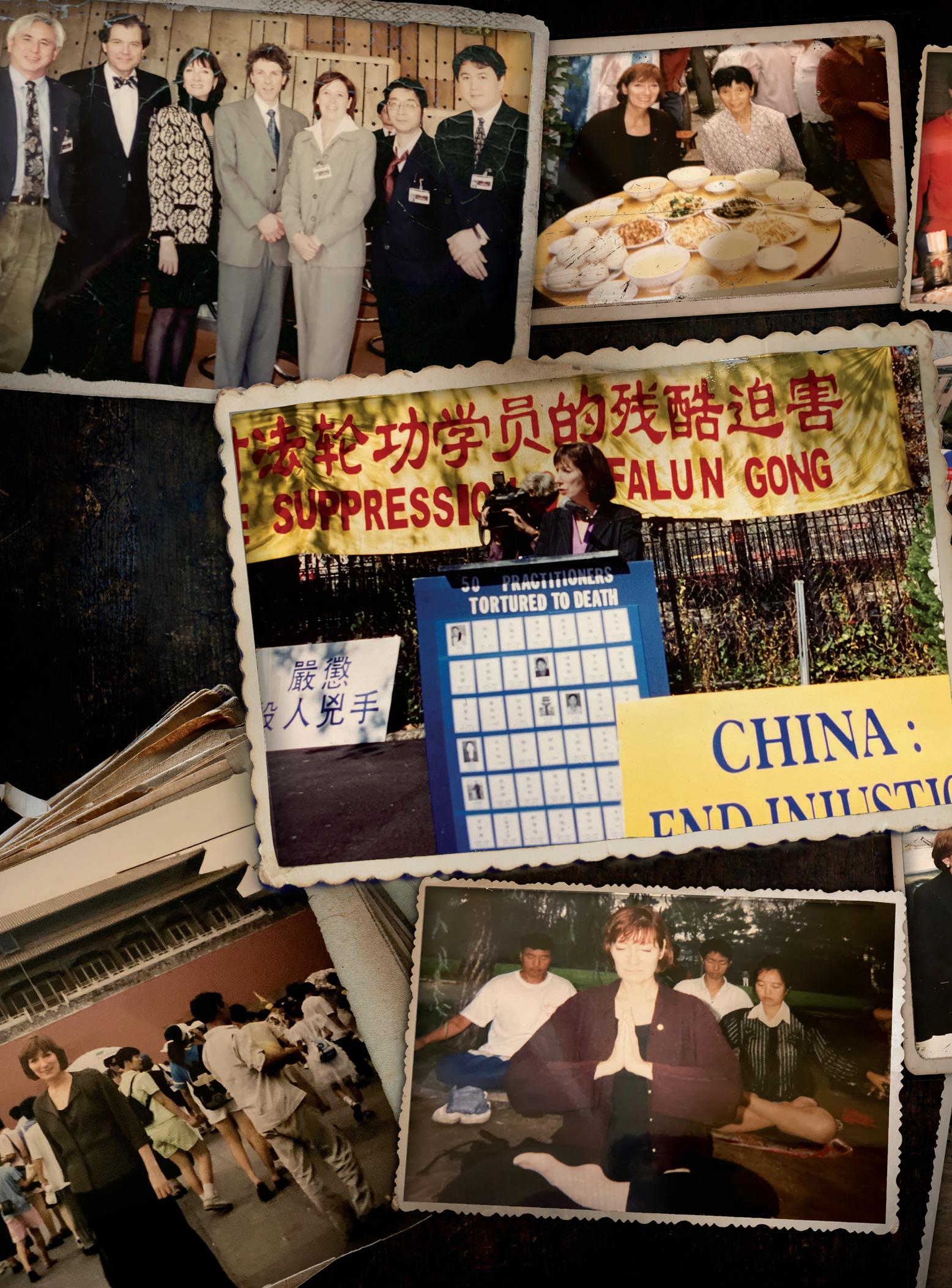
 BY TERRI WU
BY TERRI WU
FOR 54 YEARS, CHINA WASN’T on Gail Rachlin’s radar. Then, in the fall of 1997, it entered her life unexpectedly.
At a health expo at New York City’s Javits Center, she was looking for business opportunities and health solutions for herself and noticed a young man at a booth. A former public relations (PR) executive, she had moved on to running her own PR business.
She was good at reading people, and his energy stood out to her.
“What do you sell?” she walked up to him, thinking it was vitamin pills.
“No,” the man laughed, “This is free.”
“Nothing’s free in New York!” she replied.
Sure enough, the young man taught her an exercise of Falun Gong, free of charge. Also known as Falun Dafa, Falun Gong is an ancient belief rooted in the traditional Chinese culture of Buddhism and Taoism. It’s based on the tenets of truthfulness, compassion, and forbearance and features a set of five
slow-moving meditative exercises.
Immediately, Rachlin felt a surge of energy in her body. So she learned more of the exercises and took up the practice. An ovarian cancer survivor since 29, she had been looking for alternative health practices.
Within a month, Rachlin’s doctor informed her of a lump the size of a ping pong ball in one of her breasts. As the doctor was doing more tests to determine whether it was cancer, she focused on doing more Falun Gong exercises and readings of its texts. Two months later, her doctor confirmed that the lump had shrunk to less than a quarter of the original size and wasn’t a concern anymore. Soon afterward, she fully recovered.
“I became a real believer because it was just amazing,” Rachlin, now 79, told The Epoch Times, referring to the spiritual practice.
Together with another seven women, all Chinese Americans, who went to Riverside Park at 105th Street to do the Falun Gong exercises together, she began promoting the practice locally.
In August 1998, a friend got Rachlin a contract to visit Beijing to try to attract Chinese businesses to an expo at the World Trade Center in New York City.
For that purpose, she had meetings with Chinese officials in Beijing. During the first week of her visit, when she and three officials were chatting about working out, Rachlin said, “I do exercises, too!”
“It was my first time meeting Chinese communist government [officials]. I told them I was practicing—I just started the year before—Falun Gong, and they all looked at each other, literally froze,” she recalled.
“I was very proud. I didn’t realize anything; nobody had said anything to me before,” she added. “As the naïve American, I mentioned I was practicing [Falun Gong], and my wonderful health changes.”
After some awkward silence, one official with the English name Bill said he practiced qigong too for quite a few years. Then, the group changed topics.
Rachlin at the time didn’t know then that many people in China were drawn to the healing effect of qigong—physical and breathing exercises connected to traditional Chinese culture—in the 1980s and 1990s. Qigong was a fad in Chinese society.

Li Hongzhi, the founder of Falun Gong, introduced the practice to the public in 1992 as a form of qigong. By 1998, Falun Gong had become the most popular qigong known to the Chinese population. By July 1999, official estimates placed the number of adherents at 70 million to 100 million.
The following week, she said she sensed a heightened curiosity from the Chinese officials as they arranged for her to tour some Chinese manufacturing factories:
“They were all looking at me, like, what is she doing here? What is she going to do?”
It wasn’t until later during the trip that she understood why.
Rachlin took a side trip to Changchun, the capital of Jilin Province in northeast China, for a personal reason: the city is the hometown of Falun Gong’s founder, where the practice spread through word of mouth. There, she participated in group exercises; she estimated that there were 2,000 people at one park and 5,000 in another.
“I was blown away,” she said, compar-
ing the number to her local group of eight in Manhattan.
Falun Gong adherents in Changchun were amazed to know that an American shared their belief. At Jilin University, she met some and had tea with them. They chatted through her interpreter. She still remembers some of the stories that the Chinese Falun Gong practitioners shared with her.
One resonated with her deeply.
A woman, 65, a retired medical professional, said her doctor had told her five years ago that she had only six months to live. After that, she took up Falun Gong and thought that if she was going to die, she might as well be spiritual and peaceful. Rachlin specifically remembered that she used the word “peaceful.” The woman said she survived her terminal illness because of Falun Gong.
Rachlin still remembered that the woman had short gray hair. But at the roots, an inch was black.
“Can you imagine all the roots were black? It was her hair growing,” she said.
“I was like, ‘What happened with that? What is this?’
“And she said, ‘I think I’m doing better.’ She was so cute,” Rachlin recalled.
In Changchun, other Falun Gong adherents warned Rachlin to “be careful.” They told her that police had been showing unusual interest in the group lately
by frequently appearing at exercises in public parks and questioning different practitioners. She recalled the conversation with the Chinese communist officials and understood why Bill later asked her in private her reason for practicing Falun Gong.
After six weeks in China, Rachlin returned to New York without securing any Chinese visitors to the expo. She realized years later that mentioning Falun Gong may have partially contributed to that outcome.
Rachlin’s life returned to normal, and she continued to spread the word about Falun Gong in New York City. After news on April 25, 1999, that more than 10,000 Falun Gong adherents had peacefully protested outside of the central Chinese Communist Party (CCP) compound in Beijing calling for an end to the regime’s escalated suppression of the practice, Rachlin started using her company to create videos and other materials to tell the Falun Gong’s side of the story.
The persecution, which began a few months later, swept the entire country. Many volunteer organizers of group exercise sites similar to the ones Rachlin had attended in Changchun were arrested overnight.
Having visited Changchun and know-
ing Falun Gong practitioners in China, it felt close to home.
“This is my family. How could anybody touch them? This is not right,” she said.
“So, it was a personal thing for me. It really was, and I’ve always felt that. I still do.”
Thus, given her professional PR background, she volunteered as a spokesperson for Falun Gong.
“I had no idea about China before. I didn’t know about the Cultural Revolution,” she said, referring to a period of great upheaval launched by the Party from 1966 to 1976 during which the country’s cultures and traditions were destroyed. “I read it maybe as a kid, but I was never a history major.
“World history-wise, it wasn’t a big deal because, as an American, I was interested in my country: red, white, and blue. And I wanted to find out what’s going on here. Not politically, but how do people live in Texas differently than in California?
“I didn’t think in the scope of China until I got involved with the practice and heard from some of my friends. What
Rachlin
practitioners at Jilin University in Changchun, Jilin Province, China, in 1998.

For 16 years, Gail Rachlin had lived in her apartment in the United States and never had any incidents.
HOWEVER, AFTER THE PERSECUTION STARTED BETWEEN JULY AND SEPTEMBER IN 1999, HER HOME HAD THREE BREAK-INS.
the Chinese practitioners went through there was devastating. I could not believe, as a Westerner, that the Chinese people live that way in China, being restricted.”
“My name is Gail Rachlin. Normally, when I stand up here, I’m a spokesperson for Falun Gong, but today, I’m a plaintiff in this case because I, too, have been violated by the Chinese government on American soil,” she read from her statement outside the U.S. District Court for the District of Columbia in April 2002.
On April 3, 2002, more than 50 Falun Gong adherents in the United States, including Rachlin, filed a lawsuit against the Chinese Ministry of State Security, the regime’s intelligence agency, the Ministry of Public Security, the agency that oversees domestic security, and state-run broadcaster China Central Television for directing a “continuing criminal enterprise” of death threats, break-ins, beatings, arson, and wiretapping against them.
The lawsuit was based on the Racketeer Influenced and Corrupt
Organizations Act (RICO), a law enacted in 1970 to address problems associated with organized crime.
For 16 years, Rachlin had lived in her apartment near Central Park and never had any incidents. However, between July and September 1999, her home had three break-ins.
The first one occurred on July 25, 1999, days after the persecution began in China on July 20. When she got home, she saw the back door to the service entrance was left open, and a chain lock at the door was broken. While nothing seemed to have been taken, upon a careful search, she realized that tax records were taken from the top drawer of the filing cabinet in her home office.
Rachlin was shocked.
“Why would they [the CCP] try to do anything to me? I’m an American busy leading my life. And my meditation was just a part of it.”
The police couldn’t understand it either, she said.
“Every now and then, the police would check back because they couldn’t believe it. And a couple of them were shocked that China would be so bold. The Chinese Communist Party would be so bold as to do this.”
The second time in August, she lost her address book. After that, she installed two locks on her front and back doors. The third time in September, the back door locks were broken, and the door was dented.
“The bottom line is that practitioners should be able to walk the streets of Washington like anybody else, and they can’t, simply because they are Falun Gong practitioners,” Martin McMahon, the lawyer representing the Falun Gong plaintiffs in the RICO lawsuit, said in an interview in 2003.

For Rachlin, this was literally the case, except that it was in New York, not Washington.
In March 2000, after hosting a press conference inside the United Nations headquarters in Manhattan, she went to lunch a few blocks away with fellow Falun Gong spokesperson Erping Zhang. When they walked out of the restaurant after lunch, they saw a group of Chinese delegation members on the same sidewalk.
Rachlin said she could sense the hostility in the air as the officials were yell-
ing at them in Chinese; Zhang told her to quickly cross the street to the other side and not look back.
As they were crossing the street, a Chinese delegation member threw rocks at them. Shortly after, the police stopped the rock thrower.
By August 2003, the CCP hadn’t responded to the RICO lawsuit. Instead, they sent a letter to the Department of Justice, asking the DOJ to “do something about the lawsuit,” according to McMahon, who said the DOJ shared the letter with him. The plaintiffs asked for a default judgment, which was denied on June 3, 2008, on the grounds of insufficient evidence to waive immunity under the Foreign Sovereign Immunities Act. According to Rachlin, it was difficult to prove that a contractual relationship existed between the CCP and the thugs who carried out the death threats, breakins, beatings, arson, and wiretapping.
The RICO case was perhaps the first attempt in outlining and pushing back against the CCP’s transnational repression. The regime’s sprawling global cam-
paign to surveil, harass, intimidate, and forcibly repatriate dissidents abroad has in recent years been more extensively documented.
In a 2021 report, Freedom House said that the CCP ran “the most sophisticated, global and comprehensive campaign of transnational repression in the world.” U.S. prosecutors have also brought several criminal cases against Chinese intelligence officers, officials, and Americans working with them in a series of alleged plots to surveil, harass, or forcibly repatriate dissidents living in the United States.
While the persecution raged in China, overseas adherents also felt huge pressure due to the CCP’s aggressive efforts to wipe out international support for the practice.
“We must seize the opportunity of Western countries’ rising demand for us and push the related countries to ban or restrict the activities of the ‘Falun Gong’ ... and strive to eliminate their long-term
operational bases, sponsors, and partners,” so wrote a 2015 policy paper of the “610 Office”.
The “610 office,” established on June 10, 1999, is a Gestapo-style body specializing in directing the persecution of Falun Gong.
“The Office employs around 15,000 individuals across all Chinese and overseas territories” and its agents “act without any legal basis to eradicate the Falun Gong movement,” according to a 2021 report by the French Military School Strategic Research Institute, a think tank under the country’s military.
Several months into the persecution that officially began in July 1999, Rachlin started noticing fewer media reports on Falun Gong. For example, Mike Wallace of “60 Minutes” interviewed Falun Gong’s founder in Rachlin’s apartment in 1999, but the program wasn’t aired. Between late 1999 and early 2000, CNN followed her and Zhang for a day as they visited various congressional offices; that program wasn’t aired. Another New York Times interview didn’t result in an article.


“This would happen not two, three times but five, eight times. And it was like, we couldn’t get our word out!” Rachlin said. “So, for me, it became so frus-
trating. The West, why don’t you get it? [Falun Gong] is something that is so good.
“Nothing ever got published, nothing. This was the CCP, even back then.”
It wasn’t until much later that the regime’s efforts to influence and buy the silence of Western corporations were detailed by researchers and reporters.
A 2013 report by the National Endowment for Democracy outlined the CCP’s transnational media controls. It said that the CCP used subtle influence methods in the form of “political and economic incentives” to “lead media owners and journalists to avoid topics likely to incur the CCP’s ire, especially commentary that challenges the legitimacy of one-party rule or reports that touch ‘hot button’ issues such as the plight of Tibetans, Uighurs, and Falun Gong practitioners.”
As the persecution went underground in China, and the world seemed to have moved on with little news about Falun Gong, overseas adherents decided to go on the offensive. They aimed at the highest-ranking communist official responsible for ordering and
Los Angeles Falun Gong practitioners call for the prosecution of former Chinese leader Jiang Zemin for initiating the illegal persecution of Falun Gong practitioners in China, on Sept. 2.

directing the persecution: then-CCP general secretary Jiang Zemin.
Terri Marsh, executive director of the Human Rights Law Foundation (HRLF), spent more than a decade trying to bring Jiang to justice worldwide. In October 2002, she filed a civil case on behalf of persecuted Falun Gong practitioners against Jiang in a federal district court in Illinois over crimes including genocide and international crimes. Among the abuses listed in the suit were widespread torture, disappearances, forced labor, sexual crimes, and unlawful round-ups and detention.
This first lawsuit launched a legal wave against Jiang and his cohorts worldwide.
filed globally against Jiang and his affiliates had kept the former leader “in effect in jail in China.” Jiang didn’t leave China for 20 years.
In November 2009, Jiang was indicted in the Spanish national court for committing crimes of genocide and torture against Falun Gong. According to Marsh, the judge would have had Interpol take Jiang to Spain had the CCP not influenced Spain to change the law to disallow universal jurisdiction, which would have allowed the courts to try Jiang for crimes committed in China.
Gail Rachlin said she spent the past 25 years of her life learning “what it means to put other things before yourself.”

“I had hoped Jiang Zemin would survive long enough to become a defendant in a criminal case at a United Nations Tribunal or a Court in China for the crimes he perpetrated against Falun Gong believers, in addition to other dissident groups,” Marsh told The Epoch Times.
She was content, however, with the fact that the more than 50 lawsuits
One month later, after four years of investigation, an Argentine federal judge asked Interpol to issue an arrest warrant for Jiang over torture and genocide against Falun Gong. Previously in April 2008, Judge Octavio de Lamadridheld held hearings with 17 Falun Gong witnesses testifying against Jiang at the Argentine Consulate in New York.
Originally filed in December 2005, the case is still ongoing in Argentina. Lamadridheld resigned before Christmas 2009. His interim successor im-
mediately reversed the arrest warrant in January 2010 and closed the case. Falun Gong adherents appealed twice, the latest in April 2013 in the criminal court of appeal, the nation’s second-highest court, keeping the case active.
Marsh’s case was dismissed in September 2003 by a U.S. District Court judge in Chicago for head-of-state immunity, insufficient service of process, and lack of personal jurisdiction. On appeal, the 7th Circuit affirmed the first two grounds of dismissal, but noted that the court wasn’t unsympathetic to the plaintiffs’ claims. The Supreme Court declined to hear the case.
“The decision by our government to immunize Jiang Zemin as a headof-state and literally defend him in federal court in Illinois is astonishing considering our government’s treatment of Saddam Hussein, another international criminal,” Marsh said.
While the federal government may have stepped in to assist the former leader in a U.S. legal action, the states have acted differently.
In June, the attorneys general of 23 states wrote a joint amicus brief to the Supreme Court, urging it to hear a case brought by Falun Gong adherents
against the Chinese Anti-Cult World Alliance (CACWA), a CCP front group operating in the United States.
The complaint described around 40 incidents of threats or physical assault against Falun Gong adherents while participating in public activities raising awareness about the persecution, such as attending parades, handing out flyers on the street, or managing a Falun Gong information stand.

In one incident in July 2011, two plaintiffs described in graphic detail an attack orchestrated by Li Huahong, head of the CACWA. According to witnesses, at Li’s direction, a “backup” mob of 20 to 30 surrounded the two Falun Gong practitioners in Flushing, New York. One of them was held there for about 30 minutes until the police arrived, while the mob yelled, “Kill her,” and “Beat her to death.”

In their brief, the state attorneys general said that a lower court’s ruling dismissing the case is “wrong on an issue of national importance that stands at the center of our constitutional tradition”—namely, religious liberty.
“America’s commitment to religious freedom is ‘essential.’ ... It constitutes ‘one of our most treasured and jealously guarded constitutional rights,’” the attorneys general wrote, quoting previous court opinions.
In October, the Supreme Court declined to hear the case.
The 23 states were Alabama, Arizona, Arkansas, Florida, Indiana, Kansas, Kentucky, Louisiana, Mississippi, Missouri, Montana, Nebraska, New Hampshire, North Dakota, Ohio, Oklahoma, South Carolina, South Dakota, Tennessee, Texas, Utah, Virginia, and West Virginia.
While the CCP’s influence operations and harassment of U.S. citizens may have once been dismissed by the mainstream, such activities have received broader attention amid growing exposure and awareness of the Chinese regime’s malign actions both domestically and abroad.
“I think nowadays we can understand more what’s happening. Especially with the [zero-COVID] protests, people are waking up,” Rachlin said. “For me, back
then, I felt our people [Falun Gong] were waking up, and they just wanted their freedom to meditate.”
She added that the facts of the persecution still needed to be brought out because now people would understand it.
“Now is the time that [the truth of the CCP] must come out so that people can understand who we are and welcome this practice into their hearts,” she said.
Rachlin will be 80 years old next year. Looking back on her life, she has never
felt as positive as during the period after she started practicing Falun Gong, she said.
“Life would be tough or not tough, but I always got through—that’s the only way I could put it,” she said.
Rachlin has spent the past 25 years of her life learning “what it means to put other things before yourself.”
“It sounded like a far-fetched idea. But when you put it in reality, it’s not. It’s a more wholesome way to live.”
Jiang spawned the systemic graft that now permeates China
Most westerners know about Jiang Zemin through Robert Lawrence Kuhn’s biography “Man Who Changed China: The Life and Legacy of Jiang Zemin.” Now that Jiang is gone, it’s time to evaluate his legacy to see how he changed China.

Jiang ruled China for 13 years from 1989 to 2002, including 11 years as the paramount leader of the Chinese Communist Party (CCP), the state, and the military. To keep the new leadership under his control after his retirement from the Party and the state, he extended his position as the chairman of the Central Military Commission (CMC), the head of the Party’s military, for two more years. After that, Jiang oversaw Hu Jintao’s ruling from behind the scenes for another eight years.
In that sense, he was the second longest ruler in communist China, after only Mao Zedong, the regime’s first leader.
Every CCP paramount leader has his own legacy. Mao is the founder of the People’s Republic of China; his legacy is the theory and practice of “Continuing Revolution” (繼續革命). Deng Xiaoping’s legacy is “Reform and Openness,” as well as the Tiananmen Square Massacre.
What is Jiang’s legacy? One is “Rule by Corruption”(腐敗治國). Another is the persecution of Falun Gong. According to He Qinglian, a China expert, economist, and author of “The Pitfalls of Modernization,” one of three keywords to describe the Jiang era is corruption.
When Jiang was handpicked by Deng and other elder leaders, it was a surprise to everyone, including Jiang himself. Compared to previous Party leaders, Jiang didn’t have revolutionary war exploits. He was just the Party secretary
Jiang Zemin ruled China for 13 years from 1989 to 2002. Then, he oversaw Hu Jintao’s ruling from behind the scenes for another eight years, making him the second-longest ruler in communist China, after only Mao Zedong, the regime’s first leader.
By Heng Heof Shanghai, ready to retire. He didn’t have his own faction, not even allies in the Party.
During his first several years in power, he still had Deng and other Party elders to look after or restrain him. But when Deng and others faded out of the picture, Jiang needed to find his own way to rule the country. The best and easiest way to build his authority was by “promoting corruption” and “selective anti-corruption to eliminate his adversary.” That’s exactly what he did.
Jiang promoted the goal of “getting rich.” A well-known motto of Jiang’s is: “Silently get rich. This is the best.”(悶聲大發財,這是最好 的) He made this comment in the middle of a speech to a group of Hong Kong reporters. It was out of the blue and off-topic, but reflected his real thoughts and values.
Under Jiang’s rule, state properties fell into the hands of powerful Party leaders’ families. A typical case is Shandong Luneng Group, which owns the Shandong Taishan Football Club. The company was the subject of a long investigative report by Caixin magazine, a Chinese business publication, in 2007.
China’s former leader Jiang Zemin reads a report during at the 19th Communist Party Congress at the Great Hall of the People in Beijing, on Oct. 24, 2017.
Luneng was a state-owned enterprise in northeast China’s Shandong Province. Its business covered coal, electricity, mining, real estate, finance, and sports. Until the end of 2005, Luneng was the No. 1 enterprise in Shandong, worth 73.8 billion yuan ($9.22 billion in 2006). The ownership changed to employee-owned from state-owned in 2002. Then, in 2006, after secret backroom dealings, the ownership changed again. This time, to privately owned from employee-owned.
Two companies from Beijing obtained a 91 percent stake in the firm, but nobody knew who was behind those two companies. It was reported that the real person who bought Luneng was Zeng Wei, the son of Zeng Qinghong, Jiang’s right hand. Zeng Wei later bought a $32 million mansion in Sydney, Australia.
There were many rounds of stateowned enterprise reform, and every time, the reform was accompanied by the loss of fortune from the state to benefit powerful people. As an example, a Chinese state-run media report showed that one state property worth 100 million yuan was valued at only 1.25 million yuan for a private buyer.
As for China’s high-ranking officials, it’s hard to know how many were corrupt.
During Chinese leader Xi Jinping’s anti-corruption campaign that commenced in 2012, Zhou Yongkang, former security tsar and former member of the Politburo Standing Committee— the CCP’s highest-level decision-making body—was convicted of three crimes. One of them was accepting huge bribes, which alone led to a life sentence in prison.
His son, Zhou Bin, was sentenced to 18 years in prison and a 350 million yuan ($50 million) fine for bribery and other crimes. There was a joke in China that Hu Jintao, the CCP leader under Jiang’s shadow, was so surrounded by bad guys that he was literally fighting behind enemy lines. Both of his vice chairmen of the CMC were charged with corruption: Guo Boxiong was convicted and sentenced to life in prison, while Xu Caihou died in the hospital before the trial.
Hu’s security force head Zhou Yongkang was a bad guy. Ling Jihua, Hu’s office director, also was a bad guy. The Ministry of Public Security was full of bad guys. It’s a miracle that Hu survived Xi’s anti-corruption sting at all.
The Jiang faction has two groups. The core members of his faction are the ones who have blood on their hands during the persecution of Falun Gong, while the general members are those who have
In 2016, JP Morgan agreed to pay US$264 million to settle charges that it employed well-connected Chinese princelings in order to win business in China.

benefited from Jiang’s policies—mostly corrupted officials. The core members of the faction were given more opportunities to engage in graft.
When Xi began his anti-corruption campaign, the first targets were the officials from the political and legal system. They weren’t charged with human rights abuses; all of them were charged with corruption and other crimes.
More than half of the former heads of the notorious 610 Offices at the state level were investigated, tried, and sentenced to jail terms. They have one charge in common: bribery. Li Dongsheng, Zhang Yue, Fu Zhenghua, and Sun Lijun, just to name a few. All of their crimes can be traced back one or two decades during the Jiang era (since Hu was under Jiang’s shadow, he hardly had his own era). None of their crimes were exposed for decades because Jiang needed them to do his dirty work, and letting them get rich through graft was the reward.
The corruption of the ruling class was so widespread and notorious that the
United States and other Western firms were competing to hire “princelings,” the sons and daughters of high-ranking Chinese officials so they could use them as a key to open and secure the lucrative China market.
In 2016, JP Morgan agreed to pay $264 million US to settle charges that it employed well-connected Chinese princelings in order to win business in China. And JP Morgan isn’t the only one. While such corporate scandals received much scrutiny in the West, it failed to take into account the China side of the equation. China’s corruption was so endemic that it made such egregious bribery both necessary and possible. And it existed long before the JP Morgan scandal; such practices had been around for at least two decades, mostly during the Jiang era.
Paired with corruption, Jiang used another strategy, selective anti-corruption efforts, to get rid of his adversaries. Chen Xitong, former CCP Beijing secretary, was most likely to be promoted to replace Zhao Ziyang, the CCP general secretary who was purged for not supporting the crackdown in Tiananmen Square.
Chen was Beijing’s mayor during the 1989 student protest. Later, he became the Party secretary of the city. Due to his achievements in Beijing and the role he played in the bloody suppression of the student protests, Chen always thought he was superior to Jiang. Jiang also considered Chen his biggest enemy. When the time was right, Jiang finally put Chen in jail for corruption charges.
Unlike other corrupt high-ranking officials, Chen never admitted the charges against him. He claimed that he was the victim of political persecution, with which many agree.
In most countries, corruption is something hard to avoid and needs to be fought all the time. Under Jiang’s rule, it was a purposeful design promoted from the very top. It was not only the grease for China’s economic development but also the key component that secured Jiang’s political power.
Yes, Jiang did change China—for the worse.
Jiang used corruption paired with selective anti-corruption efforts to stay in power and get rid of his adversaries.
There’s more evidence of a genocide perpetrated against Falun Gong adherents in China than the plentiful evidence of ongoing human rights abuses against Uyghurs and other ethnic and religious minorities in Xinjiang that are called a genocide, former U.S. State Department official Miles Yu said in an exclusive interview.
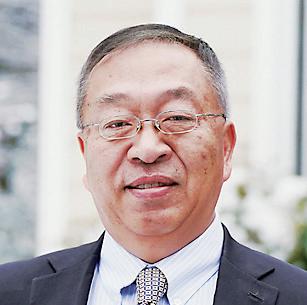
The Trump and Biden administrations both have designated the repression of Uyghurs in China as a genocide. Now, Yu—who previously advised then-Secretary of State Mike Pompeo on strategies related to China—is supporting the view that there’s not only a Uyghur genocide taking place in China, but also one against Falun Gong.
Falun Gong is a peaceful spiritual practice based on Buddhist and Daoist principles that was popularized in China during the early 1990s. The practice’s following of 70 million to 100 million adherents by 1999 was seen as a threat by the Chinese Communist Party (CCP), which then instituted a policy of persecution to the point of genocide, to eradicate the practice.
“I am surprised that [a] genocide charge against the CCP re FLG [Falun Gong] has not become a focal point of international human rights campaigns targeting the CCP,” Yu told The Epoch Times in an email.
“When deciding [a] genocide designation, the most difficult legal barrier is to prove ‘intent’ of the perpetrator.”
According to international human rights lawyer Beth Van Schaack in her analysis of the Uyghur genocide: “The
biggest challenge to establishing the commission of genocide is the mens rea (or mental state) requirement that the perpetrator(s) not only intend to commit the underlying act(s), but that the acts are committed with the intent to destroy, in whole or in part, a national, ethnic, racial, or religious group.
“The intent element is the hallmark of genocide and what distinguishes
it from other international crimes, such as war crimes or crimes against humanity.”
Yu believes “it would be much easier to prove this [intent] in the FLG case than the Uyghur case, because the CCP has tried harder to disguise its genocidal repression against the Uyghurs while its repression against the FLG has been more blatant.”
There is more documentary evidence of a genocide against Falun Gong than there is against the Uyghurs, Yu said.
“The documentation of the CCP’s criminality re: FLG is also more apparent and systemic.”
International lawyer Terri Marsh, executive director of the Human Rights Law Foundation, agrees.
“The evidence does support a claim of genocide,” she told The Epoch Times in an Aug. 9 email. “There is a plethora of evidence documenting China’s well-coordinated plans and policies to subject Falun Gong believers to a widespread suppression campaign that features torture, rape, extrajudicial killing, and other forms of degrading and injurious treatment in regions across China.”
The Human Rights Law Foundation wrote a 2015 paper that described the CCP’s “struggle” or “douzheng” ( 斗争) campaign, including planning that amounts to intent constitutive of genocide to eradicate Falun Gong through extralegal methods such as imprisonment, torture, and forced organ harvesting.
Unfortunately, additional scholarly attention to the Falun Gong genocide is relatively lacking.
“The genocide against Falun Gong
“I am surprised that [a] genocide charge against the CCP re FLG [Falun Gong] has not become a focal point of international human rights campaigns targeting the CCP.”
Miles Yu, former official, U.S. State Department
stands out as anomalous because it is virtually ignored,” according to a 2018 study published in the international journal Genocide Studies and Prevention.
To overcome this elision in reporting and prosecution of the Falun Gong genocide, Yu advises using the w’s (ICT) past designations as templates.
“It would not be a bad idea to use the ICT’s genocide designations for Rwanda and Srebrenica as a template for the FLG genocide designation,” Yu wrote.
Yu said time is running out to make the designation, as some of the perpetrators are aging.
He noted that ICT typically would specify one individual as the designee of a genocide designation. In this case, that would be former CCP leader Jiang Zemin, who died last month at the age of 96.
But with Jiang’s death, the “ICT would have to find another designee, which could well be quite possibly the entire CCP government, in which case, I think other victims of the CCP’s atrocities (e.g.
the Tibetans, the religious devotees of different orders, the Uyghurs, the Mongolians, etc.) could all join to push for a designation of the entire CCP regime as genocidal,” Yu said.
Genocide is illegal under international law, as found in the U.N. Genocide Convention in 1948, and also under U.S. law (18 U.S.C. Section 1091). The definition of genocide in both laws includes attempts at the eradication of not only ethnic, but also religious, groups such as Falun Gong.
While this eradication could be in the form of mass killing, it can also be through forced conversion. Falun Gong adherents in China have suffered both, including systematic detention of millions, torture, and the deaths of likely well over 1 million practitioners, including from forced organ harvesting. Extensive evidence for the latter crime was found by an independent people’s tribunal called the China Tribunal, which issued its final judgment in 2020.
Businessman Zhiheng Tang, a victim of the persecution of Falun Gong, shows a reenactment of a persecution torture method by the CCP in Washington on April 25, 2019.

Genocide could be in the form of mass killing and through forced conversion. Falun Gong adherents in China have suffered both.
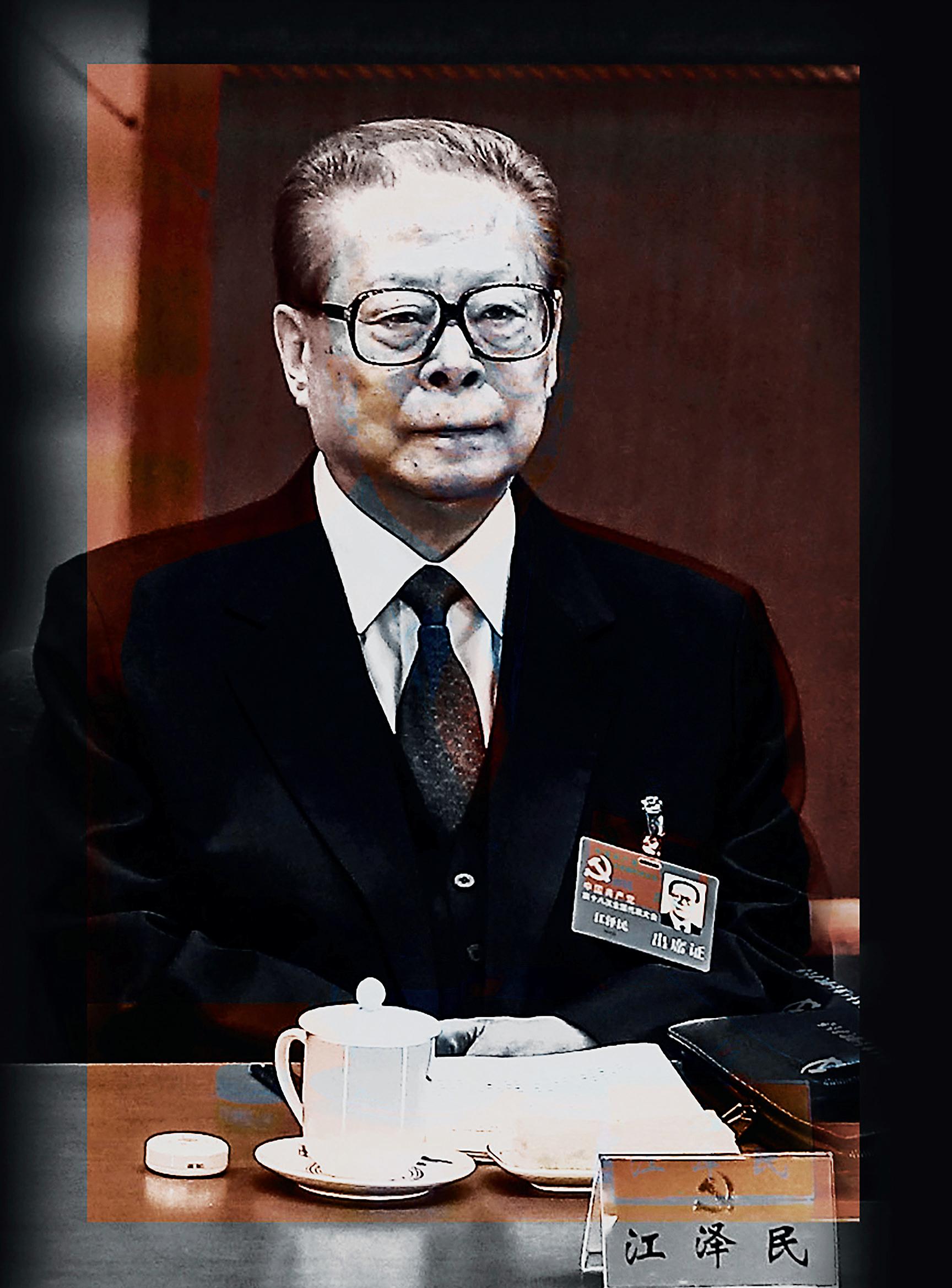
What’s the legacy of a man who ordered the genocide of as many as 100 million people? For the sake of the victims and posterity who will one day look back upon this tragic era and hopefully draw lessons from it, we mustn’t mince words. We must be clear.
Jiang Zemin belongs alongside the worst tyrants in history—the dregs of humanity who directed unmeasurable suffering upon their fellow man.
For hundreds of millions in China, Jiang will mostly be remembered as the architect of the most systematic, deadly, and protracted assault on Chinese citizens in decades: the persecution of Falun Gong.

With Jiang’s death, his victims and many Chinese with a sense of justice will breathe a sigh of relief. Although his henchmen may continue the atrocities, at least Jiang will no longer be able to harm them. There will be one less figure of evil in the world.
As a traditional spiritual and exercise discipline in the Buddhist tradition, Falun Gong quickly gained popularity in China after its public introduction in 1992. It attracted “qigong” enthusiasts and those drawn to its moral philosophy based on the virtues of truthfulness, compassion, and forbearance. Indeed, Falun Gong enjoyed considerable official support from open-minded government officials, who saw it as a way to improve public health and moral values.

By early 1999, estimates by China’s State Sports Commission put the number of Falun Gong adherents as high as 70 million people, exceeding the total membership of the Chinese Communist Party (CCP). State-run television pointed to more than 100 million followers.
Although Falun Gong doesn’t espouse any political ideology or aspirations, Jiang came to see Falun Gong as a threat to the CCP because of its popularity, independence from the state, and traditional spiritual philosophy.
Thus, in the spring of 1999, Jiang single-handedly mandated that Falun Gong must be “eradicated.” On July 20, 1999, he initiated a Cultural Revolution-style campaign of propaganda, book burnings, mass imprisonment, and coercive “trans-
formation” of Falun Gong practitioners.
Jiang took the campaign personally, almost to the point of obsession.
According to a Nov. 9, 1999, Washington Post report, “It was Jiang who ordered that Falun Gong be labeled a ‘cult,’ and then demanded that a law be passed banning cults.”
The move, like the campaign itself, was self-serving.
“The crackdown was undertaken to demonstrate and solidify the power of the Chinese leadership. ... Communist Party sources said that the standing committee of the Politburo did not unanimously endorse the crackdown and that President Jiang Zemin alone decided that Falun Gong must be elim-
inated,” according to the same Washington Post article.
A Party official noted that “this obviously is very personal for Jiang.”
In 2001, CNN senior analyst Willy Lam wrote that senior officials criticized Jiang’s suppression as a way “to promote allegiance to himself.”
In 2002, Jiang reportedly issued “shoot to kill” orders against Falun Gong practitioners after five practitioners tapped television broadcasts in Changchun to show images of their faith being freely practiced around the world. An animated documentary based on this incident, “Eternal Spring,” has been selected as Canada’s entry for the 2023 Oscars Best International Feature Film.
The consequences of Jiang’s fateful decision in 1999 have been devastating. Millions of innocent Falun Gong practitioners have been abducted from their homes or off the street, then illegally jailed in prisons and gulags, some for more than a decade.

Under Jiang’s leadership, the CCP sanctioned the systematic use of violence and torture against Falun Gong adherents in order to force them to recant their practice of Falun Gong.
“The [Chinese] government for the first time this year sanctioned the systematic use of violence against the group [Falun Gong], established a network of brainwashing classes, and embarked on a painstaking effort to weed out followers neighborhood by neighborhood and workplace by workplace,” according to a 2001 Washington Post article.
Electric batons, sexual abuse, and injections with psychiatric drugs became routine, leaving untold numbers of people permanently scarred, disabled, or insane.
In 2006, the U.N. Special Rapporteur on Torture Manfred Nowak reported that in 66 percent of all alleged torture cases in Chinese detention camps, Falun Gong practitioners were victims. A 2013 New York Times report on the Masanjia Labor Camp states, “All agreed that the worst abuse was directed at Falun Gong members who refused to renounce their faith.”
In a 2017 report, Freedom House found that “Falun Gong practitioners across Chi-
na are subject to widespread surveillance, arbitrary detention, imprisonment, and torture, and they are at a high risk of extrajudicial execution.” The organization independently verified 933 cases of Falun Gong adherents sentenced to prison terms of up to 12 years between January 2013 and June 2016.
While the torture and abuses meted out by Chinese security forces have led to more than 4,800 confirmed deaths of Falun Gong practitioners, the true number is believed to be much higher, due to the risk and difficulties of confirming these cases and sending them overseas.
Yet, Jiang’s worst crime is the state-sanctioned mass killing of Falun Gong practitioners, so that their vital organs could be extracted and sold for organ transplantation.
Hamid Sabi, counsel to the China Tribu-
nal, presented to the United Nations Human Rights Council testimony that forced organ harvesting had been committed “for years throughout China on a significant scale ... and continues today,” according to a 2019 Reuters report. He said that the harvesting has involved “hundreds of thousands of victims,” mainly practitioners of Falun Gong. In a 2021 statement, U.N. experts found the allegation credible and were extremely alarmed by it.

According to a video published by End Transplant Abuse in China (ETAC), the former PLA Minister for Health Bai Shuzhong, in one forensically examined phone call, stated that Jiang directly ordered the killing of Falun Gong practitioners for their organs.
As Jiang and the CCP leadership have gone about executing the campaign against Falun Gong, they’ve developed and refined an array of repressive mechanisms. Since 1999, the CCP has expanded the network of detention centers and black jails, rewarded torturers with promotions and bonuses, and created an extrajudicial security force called the 610 Office, which operates as a Gestapo for Falun Gong.
It has honed its misinformation and propaganda skills, neutered the judiciary, and created the most expansive system of internet censorship and surveillance in the world. Though originally designed to target Falun Gong, these tools are now being used against Uyghurs and other Chinese citizens.
In response to his role in orchestrating the attempted eradication of Falun Gong, Jiang has been the target of dozens of international lawsuits and more than 200,000 legal complaints filed by victims within China.
Jiang’s death won’t bring back to life the untold hundreds of thousands of Falun Gong practitioners who may have died over the past 23 years because of his actions. Nor will it repair the millions of families that have been torn apart. Nor may it diminish the ferocity with which Falun Gong practitioners across China continue to be jailed and tortured today.
But for people who practice Falun Gong around the world, it does bring some hope that it will open a new opportunity for people in China to follow their conscience and bring an end to the killing.
FROM TOP: MINGHUI, JENNIFER ZENG/EPOCH TIMESSAM BANKMAN-FRIED, the owner of the failed cryptocurrency exchange FTX, has been denied bail after his arrest in the Bahamas at the request of the U.S. government.

Chief Magistrate Joyann Ferguson-Pratt ruled that Bankman-Fried’s $250,000 bail request would be denied on the basis that Bankman-Fried poses a flight risk because of his access to financial resources.
The judge ordered the 30-year-old to be remanded to a Bahamas correctional facility until Feb. 8, 2023.
Bankman-Fried was arrested by Bahamas law enforcement
at the request of the U.S. attorney for the Southern District of New York, who notified the Bahamas Attorney General’s Office that it had filed criminal charges against the former crypto billionaire, who once had an estimated net worth of $26 billion. Prosecutors have filed charges against Bankman-Fried, including wire fraud, as well as conspiracies to commit wire fraud, commodities fraud, securities fraud, money laundering, and fraud against the United States.
He faces up to 115 years behind bars if he’s convicted of all eight charges.
The largest bank in Denmark, Danske Bank, has pleaded guilty to defrauding American banks and will forfeit $2 billion, according to the Department of Justice.

The United States has struck a deal with Pfizer to pay the pharmaceutical giant almost $2 billion for 3.7 million more courses of Paxlovid, according to the company.
A TD Bank survey has found that “82 percent of American respondents remain confident in their ability to manage their spending” despite consumer anxiety about inflation.

The boyfriend of Breonna Taylor, who was shot dead by Louisville Metro Police Department officers in 2020, has reached a $2 million settlement with the city of Louisville, his lawyer announced.
57% The current backlog of unresolved immigration cases represents a 57 percent increase over the 1,262,765 cases that were outstanding at the end of President Donald Trump’s final year in office, according to the Transactional Records Access Clearinghouse.

“We cannot allow the Chinese Communist Party to continue to buy up our nation’sSouth Dakota Gov. Kristi Noem, on the state’s proposed legislation to restrict farmland purchases by China, in a press release. THIS PAGE FROM TOP: SAMIRA BOUAOU/THE EPOCH TIMES, ALEX WONG/ GETTY IMAGES, BREONNA TAYLOR FAMILY; RIGHT PAGE FROM TOP: ALEX WONG/GETTY IMAGES, JOHN MOORE/GETTY IMAGES
“TheRep. Jim Jordan (R-Ohio), on House Republicans seeking testimony from Biden administration officials on the origins of COVID-19 and the U.S. funding of research at China’s Wuhan Institute of Virology. ECONOMY
THE FEDERAL RESERVE has voted to raise the benchmark federal funds rate by 50 basis points, to a target range of 4.25 to 4.5 percent at the December policy-setting meeting of the Federal Open Market Committee, the highest level since late 2007.
In total, the Federal Reserve has raised interest rates seven times since March, totaling 425 basis points.
During the post-meeting press conference, Fed Chair Jerome Powell warned that there is still a long way to go in the fight against inflation. Most officials now anticipate raising rates above 5 percent next year, which is higher than previously projected.
 DHS Says It Will Close Gaps Along Southwest Border Wall
DHS Says It Will Close Gaps Along Southwest Border Wall
NEARLY TWO YEARS AFTER newly elected President Joe Biden ordered a halt to construction on the project, the Department of Homeland Security announced that it will work to close gaps along the southwest border of the wall between the United States and Mexico.
Shipping containers fill gaps in the U.S.–Mexico border wall in Yuma, Ariz., on Sept. 27.
Biden had made a 2020 campaign promise that he wouldn’t build “one more foot” of the border wall, which was one of then-President Donald Trump’s most prominent objectives.
Overall, the new work will occur in the Border Patrol’s San Diego sector, which includes western Arizona and part of eastern California, and the El Paso sector, which covers western Texas and New Mexico.
 ELECTION
ELECTION
Democrat Kristin Kassner, a first-time candidate, is now leading her Republican opponent Lenny Mirra in the race for the newly redrawn North Shore district, a coastal region between Boston and New Hampshire.
Prior to the recount, Mirra, a five-term Republican, had led Kassner by 10 votes out of the 24,155 votes that were cast across the district, according to the original certified results from Election Day.
However, the 10-vote margin is within the legal threshold that allows for a recount, and Kassner later submitted a petition asking for a district-wide recount of the Nov. 8 election.
POLITICS 2022THE FBI NOT ONLY HAS possession of a laptop computer owned by Democratic National Committee staffer Seth Rich—who was murdered in 2016 by unknown assailants—but a report detailing forensic imaging of what’s being described as Rich’s work computer, the bureau revealed in a new filing.
The FBI’s records office located the report while searching for the work computer, Michael Seidel, chief of the office, said in a sworn declaration filed with a federal court in Texas.
He described the document as “a three (3) page forensic report detailing the actions performed by an outside entity to image the work laptop.”
The report was among four documents that never had been disclosed by the FBI in relation to Rich’s case.
TAIWAN’S MILITARY SAID on Dec. 13 that it detected 29 Chinese aircraft, including 21 that flew into the island nation’s airspace, and three naval vessels near its territory, as the Chinese Communist Party intensifies pressure on the self-ruled island. Taiwan’s defense ministry stated that aircraft, navy vessels, and landbased missile systems were deployed in response.

UK POLICE EARLIER THIS MONTH sought to interview six Chinese diplomats over an assault on a Hong Kong pro-democracy protester in Manchester, only to find the officials had either left the country or were about to do so, Foreign Secretary James Cleverly said.
Foreign Affairs Committee Chair Alicia Kearns said the protester, who was “grievously assaulted,” has been denied justice by the diplomats’ escape, and called on the government to declare them persona non grata.
On Oct. 16, a peaceful protest outside the Chinese Consulate General in Manchester descended into a short scuffle after Consul General Zheng Xiyuan and a group of masked men appeared from the consulate to snatch a banner that depicted a caricature of Chinese leader Xi Jinping as an emperor wearing no clothes.
Bob Chan, a pro-democracy Hong Kong protester, who was holding the banner, was dragged onto the consulate grounds and beaten, before a Greater Manchester Police officer intervened.

THE U.S. SPACE FORCE has established a unit in South Korea as the two allied nations seek to further synchronize space operations in the U.S. Indo-Pacific Command region, the agency announced.
Lt. Col. Joshua McCullion will lead the new U.S. Space Forces Korea (USSFK), which is a subordinate unit to the U.S. Space Forces Indo-Pacific, USSFK said in a statement. The team will be tasked with monitoring, detecting, and tracking incoming missiles, as well as bolstering the military’s overall space capability.
The activation ceremony for the USSFK in Pyeongtaek, South Korea, on Dec. 14.

The USSFK is the first Space Force command on foreign soil and the second such command established within the Indo-Pacific Command area.
MEMBERS OF CANADA’S Parliament of all political stripes approved a Senate bill that would create new offenses in connection with forced organ harvesting and trafficking—after nearly 15 years of similar legislative efforts.
Once the bill receives royal assent and officially becomes an act of Parliament, Canada will join the ranks of countries such as the UK, Italy, Israel, Belgium, Norway, Spain, South Korea, and Taiwan that have approved measures to combat forced organ harvesting, organ transplant tourism, and organ trafficking.
Chattanooga, Tennessee, is an example of a city outside the major tech hubs with thriving startup ecosystems, according to an expert.

The Biden administration fails to take action, so states step up to the plate. 73

A new initiative supports the growth of startups in many neglected cities. 75
The cap would create big arbitrage incentives and only benefit China. 76


Can cash nudge Hollywood toward family-friendliness?
When the choice is profits or profanity, or booty of one kind versus booty of another, Hollywood has for many years, perhaps surprisingly, leaned decidedly away from the increased revenues that clean fare brings.

In case you were unaware, R-rated films make less money than those you can take Junior and Princess to with a clear conscience—a lot less. And the trend seems to be increasing.
This fact was placed in the spotlight with the recent decision to rerelease “Father Stu,” the true story of Stuart Long, a hard-living amateur boxer from Montana whose troubled childhood included a family climate of hostility to religion after his younger brother’s death at age 4. Despite this, Stu experienced a conversion, entered seminary, and was allowed to be ordained as a Catholic priest despite being diagnosed, while a seminarian, with a degenerative muscle disease that would ultimately take his life.
As originally released in April, the film’s profanity reached Scorsese-esque levels, with four-letter words numbering over 200, all of which producer and star Mark Wahlberg decided to edit out for rerelease this month. Taking in over $21 million, “Father Stu” is already a hit. But researchers discovered long ago that the big difference between R-rated movies and others wasn’t nudity and sexual content but the presence of curse words. Movies with characters who watch their mouths rake in more money, so Wahlberg can now count on a lucrative second wind for his powerful biopic.
There are obvious parallels between Long’s biography, which Wahlberg spent millions to bring to theaters, and the actor’s own life. During his teenage years and early adulthood, the pop icon once known as Marky Mark took part
in a number of violent attacks with racial overtones, and would serve 45 days of a two-year sentence behind bars. Wahlberg is himself a beneficiary of Hollywood’s preference for the smutty; his breakthrough into cinematic stardom came with 1997’s “Boogie Nights,” a critically and commercially successful romanticization of southern California’s porn industry of the 1970s, a film for which Wahlberg has apologized.
of their children should give it a shot convincing an adolescent male that he really isn’t missing much and see how far they can get with him.
Then, of course, there’s Disney’s explicit sexualization-of-children agenda, wedged in tightly with homosexual activism. In March, Manhattan Institute senior fellow Christopher Rufo posted an internal Disney corporate video conference discussing strategy against Florida’s parental rights in education law, in which executive producer Latoya Raveneau boasts of implementing a “not-at-all-secret gay agenda” and regularly “adding queerness” to children’s programs.
In later years, he has reembraced his Catholic faith in a very public fashion (though apparently dissenting from the Church’s opposition to same-sex marriage), and last month told Fox News that the cleaned-up rerelease of “Father Stu” was fashioned with youths in mind.
“I really wanted young people as a whole to see it, but especially young boys,” he said. “We want to prevent kids from making a lot of the same mistakes that we made–certainly mistakes that I made.”
Significantly, Wahlberg said the expletive-deleted version of the movie didn’t undermine its message. How many other R-rated offerings from Hollywood could this also be said of? How many of their producers would admit as much?
We have a motion picture industry in which even superhero movies have leapt into the R realm faster than a speeding bullet, e.g. “Blade,” “Darkman,” “Deadpool,” “Logan,” “Suicide Squad,” and “Watchmen.” And those who think this development isn’t unfair to parents seeking to shield the eyes and ears
Florida Gov. Ron DeSantis, who signed the law earlier this year, told Fox News: “Why is the hill to die on to have transgenderism injected into kindergarten classrooms, or woke gender ideology injected into second-grade classrooms? Meanwhile, if we had done a bill that prohibited talking about the abuse of Uyghurs in China, Disney would have supported that legislation because they won’t say a word about that.”
Communist China actually bans men from television if they’re found to be effeminate, and yet Disney, despite its “gay agenda” in America, thanked four Chinese Communist Party propaganda departments and a public security bureau in the Xinjiang region in the credits of the 2020 live-action remake of its 1998 “Mulan” animated feature. Some of the remake’s scenes were filmed in Xinjiang, a region where more than 1 million Muslims, mostly Uyghurs, are held in concentration camps.
For Hollywood, clearly, it isn’t simply bare bottoms on the silver screen competing with the studios’ bottom line. There’s an aggressive woke ideology embedded in the fabric of Tinseltown that all the ticket sales and streaming service fees in the world likely can’t stop.
There is an aggressive woke ideology embedded in the fabric of Tinseltown that all the ticket sales and streaming service fees in the world likely can’t stop.

Biden administration fails to take action, so states step up to the plate
It’s time to ban tiktok. The social media app is wildly popular with young adults and children but controlled by an authoritarian regime in China. Apple rates the platform for users ages 12-plus. Yet the Chinese Communist Party (CCP) uses the app’s secret algorithm to influence and track their opinions, messaging, keystrokes, and locations.
One billion users globally are vulnerable to the theft of their passwords and future blackmail. Based on data already collected, TikTok could leverage American leaders over the entire 21st century.
TikTok is expanding into online purchases, music, search engines, warehouses, and fulfillment centers. It would like to become an everything app that replaces Google, Apple, Twitter, Amazon, and Facebook.
Unfortunately, the Biden administration is doing next to nothing against the threat that TikTok poses to the American public and economy. The silence of most Democrats on the issue is a form of complicity.
But Republicans in Congress and state capitals across the United States are increasingly voicing their concerns and stepping up to the plate.
Nebraska Gov. Pete Ricketts was the trendsetter, having banned TikTok on state-owned and leased devices two years ago. In the past few weeks, other Republican leaders—including in Texas, South Dakota, South Carolina, Maryland, and Arkansas—have taken similar actions.
The State of Indiana filed two lawsuits against Tiktok, alleging that the app deceives consumers about content and security. Indiana claims the algorithm purposefully addicts young people. One lawsuit claims it promotes inappropriate content and is linked to mental and eating disorders.
Indiana’s Attorney General Todd Rokita, a Republican, said, “TikTok is actively exposing our children to drug use, alcohol abuse, profanity, and sexually explicit material at a young age.”
In South Carolina, the Republican governor not only removed the app from government devices, but asked state offices to block TikTok’s website, as well.
buying of American farmland. Companies from China often purchase land near U.S. military bases, threatening surveillance of strategic assets, including nuclear weapons.
“South Dakota is showing the nation how to create a state-led response to threats from communist China,” the governor wrote. “We are taking the lead on preventing Beijing from accessing the private data of our citizens and throttling our food supply.”
Larry Hogan, the Republican governor of Maryland, issued an emergency cybersecurity directive prohibiting technologies from both Russia and China, including TikTok, from the executive branch of government.
South Dakota’s tourism bureau deleted its TikTok account, which had 61,000 followers.
These states are stepping up to pay the price for U.S. national security.
South Dakota Gov. Kristi Noem, a Republican, who signed the state’s executive order against TikTok, wrote that the CCP collects personal information on users, including internet browsing data and keystrokes. That would mean it could harvest passwords.
In an opinion article, Noem criticized the Biden administration for insufficiently protecting the United States from foreign adversaries.
“Mr. Biden hasn’t demanded that Beijing or TikTok cease gathering the data of American citizens, and he hasn’t pushed Congress to ban the app nationally,” she wrote. “By refusing to respond to this threat, the president is allowing China’s communist leaders to continue their attack on American security.”
Noem also plans to work with South Dakota’s Legislature to address China’s
Noem will get support from most of South Dakota’s voters as 53 percent are Republicans, compared to only 37 percent Democrats. China can be a bipartisan issue—perhaps many Democrats will support her measures. But TikTok users and farmland owners could turn against her.
Taking a strong position against the CCP, even on a bipartisan issue in the United States, carries political risk.
The Biden administration faces increasing risk from its limited options on the TikTok issue as well. Whether it bans the app or not, someone will be unhappy.
But in the long run, President Joe Biden will best be served by what best serves the American people. That’s a complete ban on TikTok. He should use his influence with our allies and partners internationally to do the same. India already has a national ban on the app, so he has a precedent to promote a unified global approach.
Sometimes, a leader needs to lead public opinion, not just follow. In any case, that global public opinion is increasingly concerned about communist China’s political influence, which could be used to alter global public opinion itself.
Therefore, banning TikTok is a matter of now or never. Biden must get the point from states around the nation and step up to the plate.
One billion users globally are vulnerable to the theft of their passwords and future blackmail.
MILTON EZRATI is chief economist for Vested, a contributing editor at The National Interest, and author of “Thirty Tomorrows” and “Bite-Sized Investing.”
Fed makes clear that the inflation fight is far from over
Federal reserve chairman Jerome Powell spoke frankly on Nov. 30. His thoughtful and balanced talk made clear that the Fed sees the inflation fight as its priority. He explained the uncertain timing between Fed action and its effect on inflation but made clear that further interest rate increases are integral to the effort.
Unlike so much that comes out of Washington, Powell’s talk was long on perspective and short on promises. In other words, it addressed practical realities. He did allude to the possibility that the Fed might moderate the pace of interest rate increases, attributing such a possibility to technical considerations and not— as so much media intimates—as a sign that the inflation fight might be winding down.
The forthrightness with which Powell spoke was a far cry from his behavior in 2021. Then, even as inflation built quickly and in a frightening way, he joined with Treasury Secretary Janet Yellen and insisted, against all the evidence, that the price pressure was “transitory.” In retrospect, it has become clear that his position last year was more political than anything else.
As 2021 approached its close, Powell’s term as Fed chairman was also drawing to an end. He needed President Joe Biden’s support to secure a second term, and he knew that the president wanted to downplay the otherwise obvious inflationary pressure for his own political reasons. Powell spoke accordingly.
Since securing reappointment, Powell and the Fed have taken on a very different perspective. First thing in 2022, the Fed has made clear, as Powell did in this recent talk, that it’s focused on quelling inflation. Monetary policymakers began to act
this past March. They started to raise short-term interest rates and reverse the quantitative easing program under which they had until they pushed additional liquidity into financial markets.
Since then, the Fed has pursued this new line of action aggressively, raising interest rates, occasionally by 0.75 percentage points at a go, and increasing short-term rates by a cumulative 3.7 percentage points from March levels through early December.
tinue, he did suggest that the size of each rate hike might be moderate— that perhaps instead of 0.75 percentage point increments, the Fed might raise rates only 0.5 percentage points at a time. Much media discussion has mistakenly taken this comment to mean that the Fed may be nearing the end of its anti-inflation fight. But this interpretation, though full of the excitement that the media loves, is nowhere near Powell’s meaning.

Instead, he couched this potential moderation as a gesture to the uncertain lags with which interest rate increases affect the economy and inflation. He explained that it is only prudent to moderate the pace for a while because we may not have seen the full economic and inflationary effect of past aggressive rate increases. Rather than nearing the end of the inflation fight, Powell made it plain that interest rates would ultimately have to tick higher.
Powell makes abundantly clear in this latest talk that Fed policymakers will stick to this path. He explained that some inflation measures seem to have moderated but that in other important ways, inflation remains stubbornly high, and it is on this matter where the Fed must have its focus. He outlined what must have been a careful and thorough Fed analysis of the inflation situation and why, at best, pressures will persist well into 2023.
Notably, Powell indirectly contradicted some media speculation that policymakers would ease their position on acceptable inflation, perhaps abandoning its previous target of 2.0 percent inflation in favor of 4.0 percent. By recommitting the Fed to its original 2.0 percent target, he has, hopefully, scotched such speculation.
Although Powell assured all that interest rate increases would con-
For obvious reasons, the speech contained no speculation as to how high interest rates would ultimately have to go. Had he made such a statement, it would have caused needless gyrations in financial markets and otherwise committed the Fed impracticably to a single target in a world that is constantly changing. But if Powell must hold his ultimate interest rate target close to his chest, history can speak on the subject. In the past, interest rates have had to rise to or above the ongoing inflation rate before they can have much effect on quelling the pressure.
With various inflation measures running regularly between 5 and 7 percent, interest rates—unless the economy gets very lucky—will have to rise much higher than they are today, almost double. And this ultimate necessity will have to occur in whatever increments the Fed chooses to make the climb.
Although Powell assured all that interest rate increases would continue, he did suggest that the size of each rate hike might be moderate.

A new initiative supports the growth of startups in many neglected cities
Following the dramatic fall of FTX and its young founder, Sam Bankman-Fried, which blindsided investors, some might argue that it’s time for venture capitalists to pay more attention to entrepreneurs in overlooked communities across the country who are building the new American dream.
Over the past decade, nearly 75 percent of venture capital has gone to traditional tech hubs in California, New York, and Massachusetts. But this trend is steadily changing, according to Steve Case, co-founder and former CEO of America Online (AOL).

After leaving AOL in 2005, Case launched his investment firm Revolution to back entrepreneurs with growth, venture, and seed funds. His Revolution Growth fund, for example, has invested roughly $1 billion in growth-stage startups such as Sweetgreen, Tempus, Tala, and DraftKings.
As an investor, he discovered that there are plenty of entrepreneurs in America’s heartland, away from the spotlight of big cities. In a recent interview with American Essence magazine, Case said these entrepreneurs tend to be more impassioned than the Big Tech workers in Silicon Valley due to their deep connection to their cause.
Local entrepreneurs understand the challenges that their communities face, and they know the solutions, according to Case. What they need is funding.
In 2014, he launched an initiative called “Rise of the Rest” to support the growth of startups in many cities across the United States. His belief is that great entrepreneurs can be found anywhere and can thrive with the right support and funding.
As part of the initiative, he orga-
Over the past decade, nearly 75 percent of venture capital has gone to traditional tech hubs in California, New York, and Massachusetts.
nized bus tours visiting dozens of cities to meet entrepreneurs and learn about their businesses firsthand. He documented his observations from his tours in his latest book, “The Rise of the Rest: How Entrepreneurs in Surprising Places Are Building the New American Dream.” In his book, Case introduced dozens of entrepreneurs and their inspiring stories.
“I do think it’s a story that hasn’t really been told. Most people are unaware of it and hopefully this book will open people’s eyes to it,” he said.
Case launched the Rise of the Rest Seed Fund to invest in these startups. So far, the fund has invested in 200 companies in more than 100 different cities. Case’s initiative is backed by well-known investors and entrepreneurs such as Eric Schmidt, Jeff Bezos, Tory Burch, and the Walton family (Walmart).
“A lot of places are struggling and
feeling left out and left behind. If we can back new companies that can create new kinds of jobs and create more hope and opportunity in those communities, and do that in enough places, it also has the potential to help lift up, and maybe even in a small way, unite a very divided country,” Case told American Essence.
It’s like asking a parent to choose their favorite child, Case said when asked which cities outside the major tech hubs had surprised him
“It’s not just two or three or four cities that are rising up. It’s really several dozen cities,” he said, citing Chattanooga, Tennessee; Detroit; Indianapolis; and Bentonville, Arkansas, as examples of cities with thriving startup ecosystems.
Case also mentioned that an increasing number of people are returning to their hometowns after leaving to pursue tech jobs in big cities such as San Francisco, New York, and Boston. They’re returning home because of the affordability, increased job opportunities, and proximity to their families. According to Case, this trend has accelerated since the COVID-19 pandemic.
The AOL co-founder believes that the next generation of successful Fortune 500 companies will come from all parts of the country, not just from tech hotspots such as Silicon Valley. He feels there’s a strong case to be made for investing in these companies, and that venture capitalists don’t have to make sacrifices in terms of returns.
Because these companies don’t have as much access to capital as companies in places such as Silicon Valley, their valuations tend to be more modest, and the business ideas are quite compelling, he said, so investing in those companies can “generate terrific returns.”

Only 15 years ago, the European Union produced more natural gas than Russia exported, according to the Energy Information Administration. Repeating past mistakes and maintaining a failed energetic interventionist policy would only worsen what is already a structural disaster.
The prohibitive cost of electricity and gas in Europe isn’t a result of market flaws but of a completely unsustainable cost structure where consumers are forced to pay escalating taxes, a hidden CO2 tax, subsidies, and other rising regulatory costs. More than 60 percent of an average eurozone country’s household bill is made up of taxes and regulated costs, according to Eurostat.
Brussels can’t turn water into wine, and, similarly, the European Union can’t “cap” the price of natural gas and oil. It’s almost ironic, but European leaders are spending days debating whether to impose a cap on Russian oil that would be set above the current Urals price and significantly above the five-year average levels.

The only thing that these so-called caps would achieve in a global energy market is to provide a massive subsidy that would then have to be repaid with higher tariffs or taxes afterward.
Additionally, in a globalized and international market, the cap would create enormous arbitrage incentives that would only benefit China, which would continue purchasing cheap Russian commodities and exporting to Europe its more competitive goods.
A European gas and oil cap causes no harm to Russia at all. We should have learned by now that through exports to China, India, and other Asian countries, Russia continues to set trade surplus records.
Additionally, by subsidizing the price in the short term, the gas cap would cre-
ate an artificial demand and a perverse incentive. A cap on natural gas prices leads to higher consumption of fossil fuels, higher taxes, and higher bills while it penalizes renewable investment and a competitive energy transition.
The European Union needs a competitive energy policy that makes use of all available technologies. Eliminating, delaying, and placing bureaucratic barriers on investments in supply-chain security is a luxury no nation can afford.
The European Union should:
• Use the European Union’s extraordinary tax receipts from the sale of CO2 emission rights, which are estimated at more than 20 billion euros for 2022, to lower tariffs for the neediest families.
• Reduce the taxes on gasoline and gasoil that are more than 50 percent of the final price for the least fortunate and small businesses. The same for natural gas, for which taxes add up to more than 30 percent of the tariff.
• Reduce the regulated costs burden included in consumer tariffs. Most
of those regulated costs and subsidies have nothing to do with energy consumption and ought to be included in each country’s budget.
• Extend the life of nuclear plants and invest in new reactors.
• Support renewable energy by eliminating the regulatory risk that negatively impacts capital attraction. Supporting renewable energy means securing the necessary amounts of lithium, copper, and cobalt.
• Facilitate investments in natural gas development and lift the ban on the exploration and exploitation of unconventional gas.
• Reach long-term contracts with the major producers of liquefied natural gas, as China did when it closed its 27-year contract with Qatar.
• Eliminate taxes imposed on energy companies. They are the key to investment in the security of supply.
• Strengthen the security of supply and stability provided by hydroelectric energy through contract extensions and investments in mini-hydro.
• Provide tax benefits for investing in cogeneration.
• Support long-term investments in the grid and networks and energy sources such as green hydrogen with tax benefits.
The energy crisis, which was already a high-cost issue for European citizens in 2019, will become a price and supply issue soon if the European Union disregards these measures and continues to impose interventionist policies, raising taxes and imposing idealistic and industrially unviable models.
If the necessity of securing the supply and mining of copper, cobalt, lithium, and rare earth metals isn’t understood, together with the need to strengthen nuclear, natural gas, and hydro, the European Union will switch from being dependent on Russia to being dependent on Russia and China.
The cap would create big arbitrage incentives and only benefit China
The European Union can’t ‘cap’ the price of natural gas and oil.
It’s probably a question that isn’t being asked enough: Should multinational corporations divest themselves into smaller regionally or nationally aligned entities that may be better suited to tackle local geopolitical and economic challenges?
Global banking giant HSBC Holdings PLC is under pressure from its largest shareholder to do exactly that. Ping An, the Chinese insurer and HSBC’s biggest stockholder, has asked the bank to spin off its Asian business.
The insurer argues that HSBC as an international entity can no longer straddle the East and the West while effectively navigating both regions’ increasingly divergent political and economic landscapes.
There’s also some speculation that Ping An is just a proxy for the Chinese Communist Party (CCP) regime.
HSBC has a 157-year history. It’s a British bank with origins in Asia (HSBC originally stood for Hong Kong Shanghai Banking Corp.) that today operates a sprawling business across consumer and retail banking, corporate banking, investment banking, and investment management.

As of the end of 2021, 33 percent of its customer account value resided in Hong Kong, 31 percent resided in the UK, with the remainder residing across North America, Europe, China, the Middle East, and Asia. Unsurprisingly, it views Asia as a growth driver. In its lucrative wealth management business, 63 percent of 2021 global revenues were earned in Asia.
HSBC’s stock price over the past five years is down by a whopping 38 percent, severely lagging the 0.95 percent performance of the Dow Jones U.S. Banks Index, as well as the MSCI World Banks Index, which is up by 0.6 percent during the same period. In 2022, its shares have been largely flat, outperforming most peers.
I’ve previously covered HSBC’s precarious tight-rope dance of navigating Asian and Western politics. It was one of the only global corporations in 2020 to have cast its support for Beijing’s so-called national security law in Hong Kong criminalizing dissent. The CCP also accused HSBC of handing over information to U.S. authorities in the case of Huawei CFO Meng Wanzhou (who was held for a period in Canada as part of a prolonged extradition fight with the United States).
More recently, the international bank has been retrenching due to a disappointing financial performance and criticism from Ping An. Last month, HSBC sold its entire Canadian operations to the Royal Bank of Canada. It also recently closed 114 branches in the UK (25 percent of its UK branches) and has announced that it’s exploring a sale of its New Zealand franchise. Last year, HSBC exited the U.S. retail banking market by selling its east coast branches to Citizens Bank and its west coast branches to Cathay Bank.
Let’s go back to Ping An’s demands of splitting up the bank. HSBC, for its part, has gone on a publicity campaign to push back, including hiring investment bank Goldman Sachs to rebut some of Ping An’s economic arguments for a divestiture.
A manufacturing company could argue that different skill sets in different markets can present a labor arbitrage. For example, design specs can be drafted by a creative team in the United States, while manufacturing can be done in a lower-cost market such as Thailand.
Financial institutions have no such dynamic. A financial institution’s most valuable assets are the people who ride the elevators and walk out the door on a daily basis. It’s a trust business. Regional expertise and the cultivation of local relationships are valued. Compliance and regulatory mandates are also by jurisdiction. Top-of-house corporate management is viewed more as a nuisance than a help.
There also aren’t a ton of back-office synergies across multinational financial institutions that would be lost in a divestiture. Compliance is country-specific. Legal, accounting, tax, and treasury are also.
U.S. or European investors shouldn’t be forced to contribute capital to an organization that—out of commercial “necessity,” we’ll allow it to be called— has to bend Western ethical and moral norms to commercially operate in an environment. Each regional business is then free to focus its capital and resources on catering to customers and stakeholders within that market. We no longer need to jam a square peg into a round hole. Let local Asian or Middle Eastern investors, accustomed to operating in a different manner, do so independently.
It’s a form of nation-first, populist business building that should be discussed.
HSBC faces a challenge from Chinese insurer Ping An Ping An, the Chinese insurer and HSBC’s biggest stockholder, has asked the bank to spin off its Asian business.
Marijuana-induced psychosis, addiction more common as THC levels rise


Fifteen years ago, the idea that people
would be having psychotic episodes and psychotic breaks just from THC was unfathomable—audio and visual hallucinations, and intense anxiety,” says Ben Cort.
On a recent episode of “American Thought Leaders,” host Jan Jekielek sat down with Cort to discuss a multibillion-dollar industry that he says has turned a once-natural, relatively harmless plant into a highly addictive, psychosis-inducing narcotic. Cort is the CEO of the Foundry Treatment Center and author of “Weed, Inc.: The Truth About the Pot Lobby, THC, and the Commercial Marijuana Industry.”
JAN JEKIELEK: Weed or marijuana is not something you typically associate with psychosis. What’s going on?
BEN CORT: Ten years ago, we rarely saw psychosis and cannabis use together.
But recently, I’ll bet we’re seeing 30 cases of THC-induced psychosis for every amphetamine case. THC is the language I’ll use for marijuana, because that’s the chemical inside the cannabis plant that gets you high. Traditionally, drug-induced psychosis was associated with amphetamines, cocaine, and methamphetamine, but in the past few years, THC has really taken that over because of how strong it has gotten.
The best study for this shows that in 2012, addiction rates to THC were about 10 percent, but that in 2020, they had gone up to 30 percent.
The authors of this study said, “It’s our belief that this is THC potency.” Until recently, the idea of physical addiction to cannabis was laughable. Now, not only can you get physically dependent on it, but withdrawal from cannabis is a really big deal, and something I see every single day working in treatment.
Fifteen years ago, the idea that people would be having psychotic episodes and psychotic breaks just from THC was unfathomable—audio and visual hallucinations, and intense anxiety.
Yet every week, I hear of a young person who has dismantled every electronic device in the house, smashed their phone, taken out all the light bulbs to check for listening devices, because they are so paranoid that they’re being spied on. It’s behavior consistent with amphetamine use, but it’s the THC.
MR. JEKIELEK: How did you come into this in the first place?
MR. CORT: I’m in longterm recover y myself, and certainly used my fair share of that drug, as well as others. But I never had any interest in having my recovery be part of my vocation. I took this issue on simply because I read the proposed legislation in Colorado.
I had always loved the idea of decriminalization and legalization. I thought it was about social justice and freedom—more of a libertarian mindset. It turned out that it was about the creation of another vice industry and another opportunity to tax.
To decriminalize cannabis is easy, and has been done in
most states in this country. In fact, in Colorado, it was done about 10 years before we passed Amendment 64. But Amendment 64 didn’t have anything to do with decriminalization. It really was about the creation of a new business. That is the path this country has been on and continues to run down.
MR. JEKIELEK: I live in New York City. In the past few years, a lot of these marijuana-focused shops have popped up. Are these mom-and-pop operations?
MR. CORT: They started as mom-and-pop operations, certainly, but the vertical integration has been going on for some time now in the massive corporate takeover. This is a multibillion-dollar industry that won’t tolerate small players anymore. The license itself is often worth much more than the storefront of the dispensary. For example, simply to buy a license to sell cannabis in pre-COVID California was going to cost you $5 [million] to $7 million, with nothing else to go with it. You had a lot of small-business owners who’d already bought these licenses who kind of hit the lotto because they could sell them to a much larger corporation. The larger corporation could then make money off of it.
MR. JEKIELEK: You see a number of people with serious addictions. How is THC different from some of these?
MR. CORT: Addiction to THC can be more challenging for the individual. If you said: “I’ve got to stop drinking so much. I’ve got to stop shooting heroin. I
“I’ll bet we’re seeing 30 cases of THC-induced psychosis for every amphetamine case. ”Ben Cort, CEO, Foundry Treatment Center
have to stop smoking meth,” everybody around you would say, “Oh my goodness, of course. I’m so glad that you’ve come around.”
But if you said, “I’m smoking too much weed,” a lot of people are going to laugh and say, “Smoking too much weed? What are you talking about? You can’t get addicted to that.” This makes sobriety challenging for the cannabis-dependent patient.
MR. JEKIELEK: How is it possible there’s this huge distance between public perception and this reality you’re seeing every day?
MR. CORT: I am trying to address that in the follow-up book that I’m working on right now. Drug policy, especially around cannabis, was made illegal for some wrong reasons in the late ’30s. That led to pushback and activism. These activists believed in what they were doing—racial justice and more of a libertarian approach to life. That movement was hijacked about 20 years ago by organized business, under the guise of the Drug Policy Alliance, the Marijuana Policy Project, and NORML (National Organization for the Reform of Marijuana Laws), who used to be in this for the good of the people. They decided more money could be made by selling this stuff.
MR. JEKIELEK: How big is this industry?
MR. CORT: The industry in North America is $30 billion this year. Estimates are that by 2030, they’ll do mid-$70 billion in commerce.
The international market is controlled by several big players, and I can tell you that almost 85 percent of the Colorado dispensaries are owned by 14 men.

Meanwhile, the numbers for THC potency are rising. There are no limitations on what they can put out there. Five years ago, the idea of getting more than 30 percent THC in a plant was laughable, and now we’re in the mid40s. We gave this industry absolute free rein. The more you can sell, the more money you make. The stronger it is, the higher the rates of addiction. And boy, did they take advantage of that.
MR. JEKIELEK: Is there any regulation at all?
MR. CORT: There’s regulation on the books.
For enforcement, there is absolutely none. There was an open-records request that demonstrates the difference between how many checks the Alcohol Division did versus the Marijuana Enforcement Division in Colorado. It’s like 80 to 1, even though the Marijuana Enforcement has twice the employees.
The idea is that in Colorado, we are the thought leaders. Yet Colorado hasn’t independently verified a single test for potency or purity since 2015.
With the things we find in these plants, the growth accelerators, the pesticides, no one is making sure this is safe. We regularly find pesticides in cannabis plants that aren’t safe for topical animal use and are being inhaled by human beings.
MR. JEKIELEK: There are legalization initiatives in five more states in just a few days, or even as we show this episode, that may have been voted on. Are these actually commercialization initiatives?
MR. CORT: You bet. Even the medical ones are. We have to remember that someone who’s still involved in this, Keith Stroup, the orig-
inal founder of NORML, was directly quoted as saying, “We will use medical marijuana as a red herring to usher in recreational marijuana.” That’s always the plan, because there’s just not enough money to be made in medical marijuana. I’m glad some people are benefiting from access to cannabis-derived medications. But the idea is always to introduce medical, desensitize us a bit, and then bring in recreational.
MR. JEKIELEK: What legislation needs to happen?
MR. CORT: If you want to never develop an issue with THC, just keep it [the potency] under 8 percent. As soon as we hit double digits, we start to get into trouble.
So, let’s kick the industry lobbyists off the rulemaking committees. And let’s put a common sense potency limit on cannabis until all of the research tells us what’s safe.
MR. JEKIELEK: And what does the industry say in response to this?
MR. CORT: When they’re done complaining, they say you’ll simply drive that demand into the unregulated black market. My answer to that is simple. Your market is unregulated. You have chemicals, growth accelerators, pesticides, butane, propane, and isopropanol that’s being found in your products every day of every week. Your product is not safe.
Let’s bring it all into the light and truly regulate it and put forth quality controls. Let’s take real responsibility for making sure that it’s safe.
This interview has been edited for clarity and brevity.
With the things we find in these plants, the growth accelerators, the pesticides, no one is making sure this is safe.

Give new generations the gift of stories of previous generations
 By Jeff Minick
By Jeff Minick
In an epigraph to his 1926 novel, “The Sun Also Rises,” Ernest Hemingway quotes Gertrude Stein: “You are all a lost generation.”
Stein was referring to those born between the 1880s and 1900, particularly the men who had served in World War I and the men and women of the “Roaring Twenties.”
In some ways, no matter whether we are boomers, Gen X, millennials, or Gen Z, we too are all lost generations. The roots of place, family, faith, and history that once shaped personalities largely disappeared in the West over the course of the 20th century, falling victim to war, political upheavals, and sweeping cultural transformations. In fact, this concept of roots seems almost antiquated, replaced by the atomization of the individual and, in many cases, by obsessive self-interest.

And despite our age of social media, numerous studies show that Americans are lonelier and more disconnected than ever.
But suppose we want something else? Suppose we want better relationships with our co-workers or to deepen our children’s connections to their family heritage? What can we do?
Well, for one thing, we can tell stories.
Most of us are natural storytellers, and stories shared with others are major building blocks for relationships. Let’s say a co-worker who’s new
on the job misplaces some files and tangles up an important transaction. Her supervisor might just give her some pat reassurance and move on. Or instead, he might tell her about the time when he was just starting, forgot to return a call to a client, and nearly cost the office a small fortune. Here, the newcomer receives not only comfort for her mistake, but also an anecdote that creates a tiny link between them. Out of such small beginnings, good working relationships are born.
tell them the war stories I heard as a boy from my dad—he was a combat infantryman who fought the Germans in Italy—I again create in them a bond of belonging, of lineage.
And as for us, when we don’t think to ask our parents or other older family members for their accounts of the past, those stories are gone forever into the grave along with their now-silent teller. These lost opportunities can leave us with lifelong regrets. How many of us, for instance, ever asked our parents about their first date? How many of us know where they honeymooned, or indeed if they went on a honeymoon? What were they thinking and feeling when we first came into their lives?
Sharing stories can also link us to our family history, giving our children in particular a keener sense that their roots into the past extend far beyond their birth. If a child asks her grandmother whether she liked school when she was in third grade, and that good woman spins out tales of friendships, troubles with the times tables, and school mischief, then their bond is strengthened.
Here’s a real-life example. When I tell my grandkids the stories I’ve heard of their great-great-grandfather Clark, who was a Scotish Irish immigrant and somewhat of a wild man, I build a bridge for them to meet a man who died over a century ago. When I
“Tell me a story” is one of a child’s favorite requests. Grownups don’t ask others for that favor, but surely somewhere buried inside us is our old love of a good story. If we want to improve our work relationships, break the rampant loneliness in our society, and nourish the roots of our past, we need stories.
Barring the impediments of age and infirmity, each one of us is a walking library of stories. All we have to do is unlock the door and share them with others.
Jeff Minick lives and writes in Front Royal, Va. He is the author of two novels, “Amanda Bell” and “Dust on Their Wings,” and two works of nonfiction, “Learning as I Go” and “Movies Make the Man.”
How many of us, for instance, ever asked our parents about their first date?
Come
A BOTTLE OF ANY OF THESE world-class champagnes is all that is needed to transform any gathering of 2 to 200 people into a festive celebration. 89

MOTORCYCLE ARE ADVENTURE machines, encouraging their riders to discover what lies over the horizon; but before all that, they need to learn the basic. 90
WE CAN’T CHOOSE OUR neighbors, so the best way to coexist in peace is to decide to learn how to become their favorite neighbors ever. 96
The spacious home is situated in one of Sydney’s most sought-after neighborhoods.

Sitting on a 1/3-acre parcel in one of Sydney’s most prestigious neighborhoods, this charming private residence is essentially a small, private resort designed for the comfort and pleasure of its owners and their guests. Located in the affluent, desirable Vaucluse suburb, it allows easy access to Sydney’s business, entertainment, shopping, and dining districts.
The multistory residence’s contemporary design melds casual comfort with opulence. The interior features airy lounging and entertaining rooms, dining areas, and a welcoming central family space. Outside, extensive terraces and manicured gardens surround a large heated swimming pool, all offering a panoramic view of the eastern suburbs, with the harbor and its landmarks in the distance.

The 8,826-square-foot, four-bedroom, seven-bath home was designed to ensure every occupant has their own space. The entry foyer branches off into a formal living room and dining room on the ground floor; adjacent to these is a gourmet eat-in kitchen, a casual dining space, and a cozy living space. This level also
has a sitting room and a smaller entertaining area that opens onto the terraces.
The upper level has a massive master bedroom and private bathroom, as well as a sprawling balcony. Two additional comfortable bedrooms on this level share a bathroom and dressing area; these bedrooms open to a wraparound terrace affording panoramic views of the property and its surroundings.
The rooftop level is improved with a spa pool, BBQ, and bar, all with 360-degree views of Sydney’s famous skyline. On the garden level, there is a four-car garage, a media room, a complete gym with steam room, a crafts room, a fourth bedroom, and the pool pavilion. Below the garden level is a large game room for owners and guests to enjoy at all hours without disturbing the other occupants.

The property is in close proximity to some of the finest schools in Australia, as well as attractions such as the scenic Hermitage Foreshore Trail and the peaceful harbor coves.
•
•
•
•
•
SYDNEY SOTHEBY’S INTERNATIONAL REALTY MICHAEL PALLIER +61 417 371 522 Phil Butler is a publisher, editor, author, and analyst who is a widely cited expert on subjects ranging from digital and social media to travel technology.
(Above) The living room is ideal for casual gatherings around a roaring fireplace. (Top Right) The property features resort-style amenities of a large pool, open common areas, rooftop al fresco dining areas, and outdoors game areas. (Right) The master bedroom provides a view all the way to Sydney Harbor.


Santiago seemed to last forever. The peaks rose on the horizon, those great continentdividing Andes Mountains, dusted with white across their uppermost reaches. Close enough to touch, it seemed, but still so very far away. We wound through the traffic-choked thoroughfares of the Chilean capital, gliding from freeways to city streets, taking locals-only shortcuts and brief dashes across small neighborhoods.
“We’re going to where the Maipo begins!” declared Andres, a finger held in the air, the other hand firmly on the wheel.
And then, in short order, that great, steaming city fell away. We climbed in altitude, curling through a deep river valley, the surface of that flow flashing down below. As the sun tried to break through the clouds, Andres looked a little entranced as he recalled his history here. As a kid, he said, he and his father would ride high into these hills to survey the land and conduct ecological studies.
“We went way up there, where there’s snow,” he said, pointing again, and shaking his head. “It was beautiful, so beautiful.”
Home to almost 40 percent of the entire country’s population, Santiago sprawls. But spreading to the southwest, the Maipo Canyon offers fresh air and stunning vistas, just outside of town. It’s a perfect day trip to escape the urban maze, and on my visit, it was one full of surprises.
Meeting Andres—my driver and informal guide—was fairly fortuitous. Dropping a pin for an Uber ride home from a city mall to my Santiago hotel, he pulled up in a nondescript sedan. I asked him whether he ever did day tours. Not usually, he said, but he named a reasonable price.
Two days later, we were tracing the curves of the Maipo River, stopping to snap photos along the way. The two-lane road wound through forests and past small restaurants, holiday cabins, and shops selling locally made queso de cabra— goat cheese. Riding with Andres, I learned that his knowledge was extensive. He made casual references to art history and classic films. He gave me a tight synopsis of recent Chilean history and how it relates to today’s political contour lines. And he explained that this area is home to hot springs as well as all sorts of wildlife, including pumas and wild guanacos.

“There is a whole separate mountain culture,” he told me. In the past, bandits roamed these parts, bringing contraband through a labyrinth of pathways over the Andes from Argentina. “Now, those trails are mostly used for trekking.”
We make various stops along the way,
SANTIAGO San José de Maipo
A church in San José de Maipo, near Maipo Canyon, Chile.
San José de Maipo is the biggest city in Maipo Canyon.
including a small hike into a train tunnel along an abandoned rail bed that once transported coal out of the mountains. In San Jose de Maipo, a small town above 3,000 feet, we strolled around the central Plaza de Armas. A base for adventures such as whitewater rafting and fly fishing, the air is clear and cool. The whole place has an alpine feel, with stone buildings and A-frame houses.
And just a few more miles up the road, we pulled off at a curious-looking chocolate shop. We had passed a few similar-looking places, whimsical structures that appeared as if a fairytale giant had picked them up and plunked them down, right here.
After browsing the chocolate (made here, from base ingredients that come from Ecuador), we asked about the curious architectural style and
its ubiquity throughout the valley. The friendly young woman behind the counter told us that we were in luck—the builder was actually here today.
A few minutes later, Sergio Andrade Huber and his son Lorenzo approached, offering a welcome with warm handshakes. We toured their busy workshop, which has canoes and kayaks hanging from the ceiling.
“We’re a whitewater family,” Lorenzo explained.
We sat down for an afternoon coffee at a table he had hand-crafted from coastal flagstone, near a wood stove he had built partially from the wheels of the first subway in Santiago. They explained that Sergio began by building his own home, and has since constructed 76 houses in this area. He takes care of everything, from woodworking to mosaics.
The colors are bright. The tilework is intricate and filled with happy symbols. He also integrates as many recycled materials as possible. When building a house for Lorenzo, he integrated 40,000 used tires into the foundation.

Self-taught, Sergio builds by feeling and inspiration. I asked him what he hopes visitors will take away after visiting this place and his other creations.
“Just a second of happiness,” he says, a smile beneath his full mustache. “A moment where you’re off your cellphone, enjoying the reality of the moment.”
Later that afternoon, we left the Maipo Canyon. The city awaited, its glassy towers rising on the horizon. But I still felt it. Just a day in the mountains, but so much magic.
Tim Johnson is based in Toronto. He has visited 140 countries across all seven continents.

Fly: Santiago’s Arturo Merino Benítez International Airport (SCL) is Chile’s largest hub, with major carriers providing nonstop flights.
Stay: Radisson Blu Plaza El Bosque is situated in one of Santiago’s best districts, within walking distance of parks, shops, and good restaurants.
Get Around: Santiago has a serviceable public transit system. If you’re looking to tour out of town, a car or driver/guide is essential.
Take Note: You won’t find too many English speakers in the city or the canyon.
FESTIVE CELEBRATIONS CALL FOR SPARKLING WINE. From inimitable Champagne to budget-friendly alternatives, here are favorite picks from top sommeliers for all your holiday toasting needs.
2014 Louis Roederer Cristal Millesime Brut, Champagne

$3 1 0
A proper sparkling icon, Cristal was first created in 1876 for Tsar Alexander II. Cristal is noth ing short of unique: intense, with candied citrus fruit mixed with roasted almonds and ripe fruit, and silky on the palate with de liciously elegant bubbles. The finish builds to a crescendo, leading to long, saline, and superb notes.

—Jen Saxby, sales and events manager at Benchmark Wine Group, Napa, California
Bruno Dangin Crémant de Bourgogne Cuvée Blanche, Burgundy, France $29


It’s hard to top Champagne in terms of quality and simple enjoyment, but this comes as close as you can get at a very accessible price. Bruno Dangin is grown just on the outskirts of the Champagne region and made using the same techniques: two fermentations, bottle aging, and all the details.
—Cedric Nicaise
Krug Grande Cuvée Brut, Champagne $233



For me, Krug is the top expression of classic champagne houses. It’s ageable but generally easily drinkable on release. Krug makes a statement when you serve it or as a gift.
—Cedric Nicaise, former wine director at Eleven Madison Park, co-owner and sommelier at The Noortwyck, New York Domaine du Moulin Methode Ancestrale Brut, Gaillac, France $ 1 8
Pétillant naturel wines have the best deals you may find. My personal “coup de coeur” is made in southwest France, from the mauzac grape. It’s balanced and off-dry with fresh acidity, with notes of white pear and apples with wildflowers. Perfect for an apéritif with friends.
—André Compeyre, sommelier at Le Bilboquet Sag Harbor, New York
Cellars Brut Rosé Excellence, California $26
This winery has been pioneering Mendocino, California, sparkling wine since 1981. This is a savory rosé with aromas of fresh raspberry jam and wild strawberries on a cream-covered pastry base. The flavors are fresh and fruity, making it a juicy bubble.
—Jen SaxbyThis is one of my favorite producers, a family-run domaine currently helmed by a second-generation female winemaker. The Preference is their entry-level wine and showcases the individuality of grower champagne. If you want to go further, check out the Special Club bottling.
—Cedric Nicaise
Riding a motorcycle can transform even a trip to the grocery store into an adventure.

Motorcycles are a lot of fun, but require specific training to be operated safely
When someone straddles a motorcycle and sets off down the road, even if it’s their main mode of transportation, they join a club of free thinkers who experience the world up close. Sometimes, that experience includes bugs in the face or being rained on, but that goes with the territory, and there are ways to mitigate those as well as other less-than-pleasant aspects of riding.
There are two reasons to ride a motorcycle, which often merge into one. Firstly, getting from Point A to Point B and, secondly, experiencing adventure. In some cases, a motorcycle, most commonly referred to as a “bike,” is simply an affordable way to get around. For others, it’s an adventure machine; seeing a motorcycle roar past on the highway, carrying a couple wearing helmets and leather jackets, elicits the thought “They look like they are having fun”— which is probably the case unless it’s snowing or raining heavily.
Movies and television romanticize motorcycles, showing characters ranging from “The Fonz” in “Happy Days” to the “Sons of Anarchy” roaring down the highway. Once a person becomes comfortable riding a motorcycle, it’s only natural to develop a bit of swagger climbing aboard. The preferred way to make that happen is to focus intently on learning how to ride. Choosing the right gear and clothes should always come in a very distant second to learning the rules of the two-wheeled road. Because there’s a very fine line separating an adventure from an ordeal, proper preparation is cheap insurance.
Being able to ride a bicycle is a good start. Riding a motorcycle has several things in common with operating a bicycle; they both have two wheels, need to be moving forward to stay upright, and are steered via handlebars. But the similarities end

there. Bicycles don’t have the same ability to start off with a big burst of speed, and they’re much easier to pick up if they fall over. But rather than approaching a motorcycle full of fear and trepidation, a better option is to instead learn how it’s operated and what’s required to get underway.
Ongoing training is the key to motorcycle safety; the best riders seek out classes on city riding skills, group

There are plenty of videos that provide very informative demonstrations of the operation of a motorcycle, but there’s no substitute for actually climbing aboard and riding. It’s similar to a boat in that respect; it’s impossible to learn how to operate a boat until it leaves the dock and the throttle is applied. But this isn’t meant to suggest simply finding a motorcycle and roaring away—that’s absolutely the worst thing to do and a recipe for disaster. Similarly, it’s best not ask to a friend or relative who rides for instructions. Just as car drivers sometimes have developed bad habits, many riders also have habits they have developed over the years, some of which aren’t good—often due to not receiving proper instruction—that shouldn’t be passed along to new riders. The most prudent way to learn to ride is to attend classes.
There are many organizations offering instruction, such as the Motorcycle Safety Foundation (MSF) and many others, that combine time in a classroom with hands-on actual operation of a motorcycle. These courses are typically taught by experienced, certified instructors who ride, making them a great
“All the gear, all the time” means wearing a helmet, eye protection, gloves, riding jacket, boots, and jeans for every ride.
Safe riders constantly scan their rearview mirrors to be aware of traffic approaching from the rear, and especially when at a stop sign or traffic light.

Riding a motorcycle is an instant adventure, but doing it safely requires a lot of common sense.
Group rides are a great way to explore new roads, practice riding skills, and meet new friends.

choice to closely supervise new riders in the process of discovering how to start up and actually ride a motorcycle on their own.

Look for one taught within the confines of a closed course instead of on public roads. The bikes provided to the students in these classes tend to be small, making them more approachable and easier to operate. The mechanics of riding remain the same regardless of whether riding a small motorcycle (or even a scooter) or a large “bagger” Harley Davidson or Indian motorcycle that’s capable of carrying one or two people and a load of gear across the country.
In many states, a motorcycle endorsement must be added to a

driver’s license in order to legally operate a motorcycle, meaning that a new rider not taking one of these courses wouldn’t be able to rent or borrow a bike on which to develop and practice skills. These organizations sometimes offer virtual classes that provide a good foundation for learning how the basic controls of a bike work before a rider actually straddles the saddle, including the clutch, lights, throttle, turn signals, and how to use the front and rear brakes. The goal is to attend a class taught by instructors that inspires confidence and uses bikes in good condition on a closed course. Check references and ask around at motorcycle dealerships to determine which course might be a good fit; most areas will have several programs to choose from.

Helmets, gloves, riding jackets, and pants are a must for any and every ride. A full-face helmet prevents being hit by bugs or gravel.
Riding, even to and from work, makes the rider part of a club. Flash a twofinger wave to other riders, attend Bike Nights, and find groups on social media
A motorcycle is an adventure machine that allows riders to enjoy the scenery in a way that’s simply not possible while closed up in a car.
Once a rider has earned the endorsement, the only way to keep learning is to keep riding. MSF and others offer continuing education classes, as do many dealerships and motorcycle owner clubs. Renting a variety of motorcycles makes it easy to decide which style and make you prefer and might possibly purchase. Use social media to find groups organizing local rides. And, most of all, enjoy the adventure—while riding safely.
Realizing the bike goes where the rider looks is a valuable lesson to learn. Motorcycle police can execute very tight turns because they know to look exactly where they want the bike to go.

$239
Howard Miller is well known for desks, so it’s no wonder that it makes great desk accessories. This piece of functional art combines highly polished brass and a rosewood-finished base with felt lining. The skeleton quartz movement is on full display from the front and rear, powered by a battery to always display accurate time. The hands and hour marks are easy to see, while the clock itself can be swiveled or set at different angles.
$309
Time doesn’t stand still, but this clever desk accessory will take your imagination on voyages while making sure you don’t miss important meetings— making it much more practical than a traditional shipin-a-bottle accessory. To spark creativity, the piston at the ship’s stern can be hand-operated to see the propeller in action. The highly polished marble base and brass hardware make this a welcome addition to any office desk or boardroom.
$425
Styled after ships’ clocks, which were treasured by captains, this presentation-grade clock would make an ideal gift for a friend or an award for a much-appreciated co-worker. It comes with a brass plaque that can be personalized for a fee of $25 and inset into the lid.



Protected by a solid wood box, the precision quartz movement resides in a solid brass case that can be angled for the best view of the current time, clearly displayed on the three-inch dial.
$885
Clocks with visible mechanisms are a form of performance art, as proven by this unique example. Protected by a coneshaped glass cover and set on a beautifully finished burlwood mahogany base, the eight-day skeleton mechanism is vertically oriented, allowing a great view of the gears moving from all angles. The swinging pendulum provides a soothing effect, and a striker rings the bell located at the top of the mechanism on the hour.
$295
Made by a firm whose name is associated with timepieces, this classically styled mantel clock would be a welcome addition to any office. The quartz movement ensures accuracy, while the pendulum revolves in a tranquil manner. Accented by a mahoganystained, piano-finished solid wood case top and base, the curved glass front and rear acrylic panels allow an unobstructed view while preventing an unsightly buildup of dust. The provided 3 3/4-inch by 3/4-inch engraving plate allows it to be personalized or to commemorate an accomplishment.


These eye-catching clocks are a nice upgrade to any office and prove keeping track of time doesn’t have to be boring
Are there books you’d recommend?
We’d love to hear from you. Let us know at features@epochtimes.com
‘Mr. Midshipman Easy’ By Captain Frederick Marryat
institution of marriage. McGinley’s technical proficiency with the written word demonstrates a knack for irony and satire and, above all, that she was having a blast. If you start with this collection of essays, you may then want to delve into her poetry and children’s books. You’ll see how they became bestsellers.
DELL REPRINT, 1966 160 PAGES
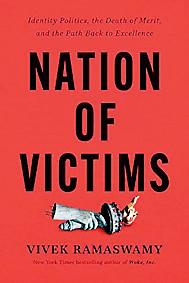 By Vivek Ramaswamy
By Vivek Ramaswamy
over tyranny. Submitting to oppression might have its rewards, but the Greeks would have none of it. Contending with traitors, propaganda, and fighting against an immense world power, the ancient Greeks inspire us even today. A good read.
PEGASUS BOOKS, 2022 480 PAGES
 By Julie Andrews & Emma Walton Hamilton
By Julie Andrews & Emma Walton Hamilton
In this 19th-century novel, the realities of the life of a British sailor hits a young aristocratic officer hard in this rollicking good read. Silly, yet serious at the same time, the amazing events in Marryat’s tome teaches hard lessons in a most delightful fashion.
CREATESPACE, 2016 220 PAGES
Perhaps best remembered as a master of light verse, Phyllis McGinley’s essays are just as noteworthy. All her writings— polished to a shine— valued the home, the traditional family, and the

 By Kathleen A. Watson, M.S.
By Kathleen A. Watson, M.S.
Your class paper has been turned in, graded, and returned. By the grade, it’s obvious your grammar needs work. To survive the class, you need a quick fix. This book may be your lifeline. It offers a handy reference and refresher when clarity counts in your writing. Watson makes things easy to find and explains things clearly, briefly covering topics with a focused, two-page discussion. Small enough to fit in your pocket, it’s arranged to allow you to quickly find points of interest.
RUTHLESS EDITOR PRESS, 2016, 166 PAGES
Vivek Ramaswamy says Americans have two options in resolving our current challenges: be a victim or use past answers to resolve present issues. We must use America’s past strengths: freedom and individuality. We’re each sovereign individuals who can’t allow the state to enslave us through money or rules. The author wants to see America the Underdog succeed again by relying on our individual efforts to strive for excellence.
CENTER STREET, 2022 288 PAGES
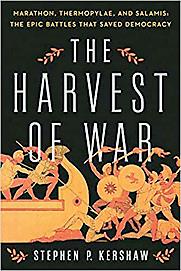 By Stephen P. Kershaw
By Stephen P. Kershaw
The battles in fifth-century B.C. Greece tell us what’s required of people who desire freedom
‘Anne Frank’
By Anne Frank, translated by B.M. Mooyaart
Perhaps more than ever, readers will identify with Anne Frank, a young girl who hid with her family in a confined space to escape the Nazis during World War II. She wrote about her life and all its ups and downs. Anne’s attitude and how she understood the dire situation she found herself in made all the difference in what she wrote in her diary. Her stark fate is in contrast to her positive approach to her situation: “Think of all the beauty still left around you and be happy.” Her lockdown can teach us much about ours.

POCKET BOOKS, 1956 237 PAGES
Guido the monk invents staff notation, but no one wants it—until Guido learns to serve others: training singers in the cathedral choir. An important lesson for all of us. You’ll be singing for joy along with your young readers.
LITTLE, BROWN BOOKS FOR YOUNG READERS, 2022, 48 PAGES
It may be cold outside in this lovely children’s story, but forest animals warm our hearts as they work together to build a sled to see the Northern Lights. Children learn that each animal has something wonderful to give. Ages 3–7.
TWO LIONS, 2022, 33 PAGES

This week, we feature an award-winning musical that’s just “loverly” and a taut thriller that challenges two men to overcome their prejudices.
It began as a bet with his friend Col. Pickering (Wilfried Hyde-White). London’s famed phonetics professor Henry Higgins (Rex Harrison) believes that he can train an uncouth flower girl, Eliza Doolittle (Audrey Hepburn), into a lady and pass her off as an aristocrat.
wonderful musical standards by Lerner and Lowe. And we can’t get enough of Harrison’s “talksinging.”
DRAMA | FAMILY | MUSICAL
Release Date: Oct. 21, 1964
In this political satire, in which neither side goes unscathed, director Noah Marks connects the dots between COVID-19 and the 2020 presidential election without mentioning either by name. We see the back of a president whose voice most of us will recognize and a powerful politician named Madame Evergreen whom we’ll also recognize.
This film gives you a chance to step back and appreciate a commentary on power, paranoia, class warfare, and many of life’s inevitabilities. You also can take a close look at our political system.

Release Date: Nov. 15, 2022
Directors: Noah Marks Running Time: 1 hour, 25 minutes
MPAA Rating: PG-13 Where to Watch: Prime Video
This classic musical, based on George Bernard Shaw’s “Pygmalion,” skewers the hypocrisy of the upper classes. Meanwhile, we can enjoy “The Rain in Spain” and other
Director: George Cukor Starring: Rex Harrison, Audrey Hepburn, Wilfrid Hyde-White Running Time: 2 hours, 50 minutes

MPAA Rating: G Where to Watch: Vudu, DirecTV, Redbox
ma. Director Zoltan Korda transports us to a no man’s land during a distant war with a glimpse of real heroes.
Release Date: Nov. 11, 1943
A World War II American tank detachment led by Sgt. Joe Gunn (Humphrey Bogart) faces desert warfare

in North Africa. Trouble erupts when their tank “Lulu” sputters and dies out. A fantastic cast, lean script, and peppy pace makes for a great character-driven dra-
Director: Zoltan Korda Starring: Humphrey Bogart, Bruce Bennett, J. Carrol Naish Running Time: 1 hour, 37 minutes
Not Rated Where to Watch: Apple TV, DirecTV, Amazon
A homicide detective from Philadelphia, Virgil Tibbs (Sidney Poitier), joins forces with the gum-smacking chief (Rod Steiger) of a small Mississippi police department to help solve the murder of a prominent citizen. Norman Jewison’s film shows how two good men can dissolve bigotry and hatred in themselves and see each other’s humanity.

An inspired partnership between director Norman Jewison and
Hollywood’s most respected black actor powered one of the most perceptive films on prejudice.

DRAMA | MYSTERY | THRILLER
Release Date: Aug. 2, 1967
Director: Norman Jewison Starring: Sidney Poitier, Rod Steiger, Lee Gran
Running Time: 1 hour, 50 minutes
MPAA Rating: PG-13
Where to Watch: Vudu, Hoopla, Redbox
Most of us have no idea who lives near us, which is a shame, as they may have the potential to develop into lifelong friends, or simply be handy to know when you hold a garage sale or ever need help building a deck.
By Bill LindseyBeing friendly and acknowledging those living near you can be infectious—if you do it, chances are they will, too. It’s common for neighbors to not know each other, but the benefits of reaching out first greatly outweigh the minimal effort required. Walking the dog—or with your kids—is a great way to meet them and chat. You may find you have a lot in common and make a new friend. Also, if you see them at the grocery store, smile and say “hi.”
Think about what behavior might irritate you, and then make sure you aren’t guilty of it. The list probably includes making too much noise too early or too late at night, such as mowing the lawn, using a chainsaw to trim trees, or hosting a party that gets a bit loud after the sun goes down. Other “don’t dos” include leaving lawnmowers or other unsightly items in the driveway all week, allowing dogs to bark all day or all night, or flying a drone over backyards.
Don’t sneak trash into a neighbor’s trash cans or pile yard debris on their property.
If your dog relieves itself on the lawn next door or down the block, clean it up immediately. On a similar note, teach your kids to stay in their yard and to ask permission before retrieving a stray ball or Frisbee from someone else’s property. If you host a backyard barbeque for your “more boisterous” friends, your neighbors on both sides and behind you are less likely to complain if you invite them to attend.

Being neighborly means being ready to lend a helping hand to a neighbor in need. For example, if you see them working on a project, such as building a deck, and you are handy with a hammer, ask if they need a hand but don’t be offended if they decline assistance—the point is to make a friendly gesture. Be careful to not come across as a know-it-all; don’t assume that they don’t know how to mow their lawn, paint their house, or start a garden.
Keeping the lawn and trees neatly trimmed shows pride in your home, maintains its value, and contributes to the overall beauty of the neighborhood. But take it a step further by walking across the street from your house to see the view of those living near you. Does it need a fresh coat of paint? Or, perhaps it’s time to pressurewash the sidewalk? Are there loose or missing shingles on the roof? Is there an oil stain on the driveway? Make a list and get busy!
ON MAY 25, 2017, The Epoch Times published an article headlined “Despite Allegations, No Evidence of Trump–Russia Collusion Found.” The article detailed that—despite a media frenzy at the time—no actual evidence had been uncovered that President Donald Trump or anyone associated with his campaign had colluded with Russia to influence the 2016 presidential election.
OUR REPORTING was proven accurate with the conclusion of the investigation by special counsel Robert Mueller.
NOT ONLY DID WE NOT BUY INTO the false narrative that Trump colluded with Russia, but we have also been a leader in reporting on the irregular and apparently politicized nature of the FBI’s investigation of the Trump campaign. During the past five years, we have published dozens of articles on the topic, many of them exclusive.
FOLLOWING THE 2020 ELECTION, The Epoch Times was at the forefront of investigating and reporting on the questions surrounding the integrity of the election. Through our fact-based and independent reporting, we were able to uncover multiple irregularities.


ON APRIL 15, 2020, The Epoch Times published its documentary “Tracking Down the Origin of Wuhan Coronavirus.” The film, which received over 100 million views, explored the origins of the virus, including the possibility of a lab leak. It presents scientific data and interviews with top scientists and national security experts.

YEARS AFTER THE RELEASE of this groundbreaking documentary, the possibility of a lab leak is considered by government officials and experts as the most likely explanation for the virus's spread.

SINCE ITS INCEPTION in the year 2000, The Epoch Times has been at the forefront of reporting on the infiltration of the United States by the Chinese Communist Party. Numerous times over the years, we've broken major China-related stories ahead of other news organizations. In 2003, The Epoch Times was the first media outlet to systematically and continuously report on the spread of SARS, well ahead of most other Western media. We were also the first to report on state-sponsored forced organ harvesting in China—one of the most underreported atrocities of our time—in
which prisoners of conscience are killed for their organs, which are then sold for profit on a large scale.
THE EPOCH TIMES also published the editorial series “Nine Commentaries on the Communist Party,” revealing the true nature and history of the Communist Party and inspiring a movement that so far has seen more than 400 million Chinese people quit the Party and its affiliated organizations. Another of our series, “How the Specter of Communism Is Ruling Our World,” systematically exposes the evil nature of communism, as well as the harm it has brought and continues to inflict on the United States and the world.
We believe that investigating and exposing the truth is the only way that we can remain safe and free
Dear future subscriber,
If you are sick of the bias, lies, and fake outrage that’s business-asusual in the media today, I believe that you will love our weekly magazine, Epoch Insight.
My name is Kirk Wang, and I am the senior vice president of the Subscription Department at The Epoch Times—the fastest-growing independent news outlet in America.

When The Epoch Times was founded in 2000, I was the first to join the production team in Atlanta. Together, we made our first edition, in Chinese. Thus began our commitment to reporting the truth and exposing the Chinese Communist Party and its infiltration in the United States and around the world.
In today’s desert of shameless media dishonesty, The Epoch Times has become an oasis for those thirsting for truthful, fact-based coverage of current events. Now, our news magazine Epoch Insight provides an even more refreshing shelter for you to explore.
Produced by our award-winning newsroom, Epoch Insight is a weekly publication that provides big-picture news coverage and in-depth analysis of today’s most challenging issues.
Epoch Insight will keep you up to date on the most significant developments in the United States, world, as well as economic news, with exclusive content in the timeless format of a real American news magazine.
You can trust us to provide you with this indepth coverage because we’re committed to honoring Truth and Tradition—and treating our readers with the respect they deserve.
Let me offer you three reasons why honest reporting is absolutely central to every line you read in The Epoch Times and Epoch Insight. Later on, you can assess the truth of my claims for yourself.
SVP of SubscriptionOur commitment to tradition is so strong that we believe YOU ought to be able to judge facts for yourself and decide what to make of them.
Many other media corporations want to tightly control what you’re allowed to see or read, so that you don’t arrive at the “wrong” views.
Not us. When we search for new hires, every single job description emphasizes that the candidate must practice ethical journalism: “Seek the truth and report it.” This used to be standard in American newsrooms ... but lately it’s been sacrificed by activists who emphasize ideology over facts.
Is it hard to find reporters who qualify? You bet. A lot of journalism schools have taught students to forsake traditional journalistic ethics for newsroom activism.
While this hiring process is laborious, it has proven successful: The Epoch Times has built a team of reporters who are dedicated to seeking and reporting the truth, regardless of whether what they find conflicts with their personal biases.
1. The Epoch Times rejects politically motivated journalism.Kirk Wang,
The Epoch Times takes this principle so seriously that it has never endorsed a political candidate for office. Can you imagine?
2. The Epoch Times is indebted to no one.
Let’s face it: If you are beholden to a corporation or conglomerate, you aren’t really free to report the facts. That’s the problem we see with many news outlets today—they know where their bread is buttered, and their “factual” reporting shows it!
What’s more, if your business model depends on getting a ton of “clicks,” you aren’t really free to report the news honestly. Every single headline is an advertisement looking to manipulate the consumer. (Remember the saying, “If a product is ‘free,’ there’s a good chance that YOU are the product.”)
But The Epoch Times is totally independent. We are funded by loyal subscribers like you and generous donors who are proud to support high-quality, trustworthy journalism.
(By becoming a subscriber today, YOU will become part of this movement to restore truth to our country.)
3. The Epoch Times has seen firsthand where ideological manipulation leads.
I have to warn you, this part of the letter gets a little heavy, and I write it with a somber heart.

You see, the founders of The Epoch Times are Chinese Americans who witnessed persecution in communist China.
We started a newspaper that would counteract the total censorship of the press inside China and the world’s reporting about China, and let people see the truth, not just the official government narrative.
And for their courageous commitment to the
truth, many Epoch Times journalists paid a very heavy price.
In 2000, China’s state security agents arrested the manager of the newspaper’s China bureau and 10 journalists. Editor-in-chief Zhang Yuhui received a prison sentence of 10 years, while Epoch Times staff member Huang Kui received five.
Both men were interrogated, tortured, forced into slave labor, and subjected to brainwashing classes. Huang was released in 2004 and Zhang in 2010. However, several other Epoch Times staff members were never heard from again. We fear they paid the ultimate price for their commitment to telling the truth.
So, for us, it’s personal. When you have colleagues tortured and killed for honest reporting, you’re not going to forsake those principles just because it’s convenient. We would dishonor their sacrifice if we gave you anything less than the honest truth.
I’d like to invite you to take a look at this Epoch Insight magazine and decide for yourself if it’s the kind of in-depth news you’ve been looking for.
So please, right now, act on our special offer: only $1 for your first four issues of Epoch Insight. Just go to ReadEpochInsight.com You’ll also enjoy a savings of 45 percent off our regular rate on the next 12 months of superior journalism ... plus other big extras, including complete access to the exceptional content on The Epoch Times’ acclaimed website, TheEpochTimes.com
SVP of Subscription The Epoch Times